|
OpenCOBOL 1.1pre-rel
|
|
OpenCOBOL 1.1pre-rel
|
#include "config.h"#include <stdio.h>#include <stdlib.h>#include <stdarg.h>#include <string.h>#include <errno.h>#include <ctype.h>#include <time.h>#include <sys/types.h>#include <unistd.h>#include <sys/stat.h>#include <fcntl.h>#include <db.h>#include "common.h"#include "coblocal.h"#include "move.h"#include "numeric.h"#include "fileio.h"#include "byteswap.h"
Go to the source code of this file.
Data Structures | |
| struct | cobitem |
| struct | memory_struct |
| struct | file_struct |
| struct | cobsort |
| struct | file_list |
| struct | indexed_file |
Defines | |
| #define | _LFS64_LARGEFILE 1 |
| #define | _LFS64_STDIO 1 |
| #define | _FILE_OFFSET_BITS 64 |
| #define | _LARGEFILE64_SOURCE 1 |
| #define | SEEK_INIT(f) fseek ((FILE *)f->file, (off_t)0, SEEK_CUR) |
| #define | O_BINARY 0 |
| #define | O_LARGEFILE 0 |
| #define | INITIAL_FLAGS 0 |
| #define | COBSORTEND 1 |
| #define | COBSORTABORT 2 |
| #define | COBSORTFILEERR 3 |
| #define | COBSORTNOTOPEN 4 |
| #define | RETURN_STATUS(x) do { save_status (f, x, fnstatus); return; } while (0) |
| #define | NUM_PREFIX sizeof(prefix) / sizeof(char *) |
| #define | DB_PUT(db, flags) db->put (db, NULL, &p->key, &p->data, flags) |
| #define | DB_GET(db, flags) db->get (db, NULL, &p->key, &p->data, flags) |
| #define | DB_SEQ(db, flags) db->c_get (db, &p->key, &p->data, flags) |
| #define | DB_DEL(db, key, flags) db->del (db, NULL, key, flags) |
| #define | DB_CLOSE(db) db->close (db, 0) |
| #define | DB_SYNC(db) db->sync (db, 0) |
| #define | cob_dbtsize_t u_int32_t |
| #define | DBT_SET(key, fld) |
Functions | |
| static int | dummy_rnxt_del (cob_file *f) |
| static int | dummy_rewrite (cob_file *f, const int opt) |
| static int | dummy_read (cob_file *f, cob_field *key, const int read_opts) |
| static int | dummy_start (cob_file *f, const int cond, cob_field *key) |
| static int | cob_file_open (cob_file *f, char *filename, const int mode, const int sharing) |
| static int | cob_file_close (cob_file *f, const int opt) |
| static int | cob_file_write_opt (cob_file *f, const int opt) |
| static int | sequential_read (cob_file *f, const int read_opts) |
| static int | sequential_write (cob_file *f, const int opt) |
| static int | sequential_rewrite (cob_file *f, const int opt) |
| static int | lineseq_read (cob_file *f, const int read_opts) |
| static int | lineseq_write (cob_file *f, const int opt) |
| static int | relative_start (cob_file *f, const int cond, cob_field *k) |
| static int | relative_read (cob_file *f, cob_field *k, const int read_opts) |
| static int | relative_read_next (cob_file *f, const int read_opts) |
| static int | relative_write (cob_file *f, const int opt) |
| static int | relative_rewrite (cob_file *f, const int opt) |
| static int | relative_delete (cob_file *f) |
| static int | indexed_open (cob_file *f, char *filename, const int mode, const int sharing) |
| static int | indexed_close (cob_file *f, const int opt) |
| static int | indexed_start (cob_file *f, const int cond, cob_field *key) |
| static int | indexed_read (cob_file *f, cob_field *key, const int read_opts) |
| static int | indexed_read_next (cob_file *f, const int read_opts) |
| static int | indexed_write (cob_file *f, const int opt) |
| static int | indexed_delete (cob_file *f) |
| static int | indexed_rewrite (cob_file *f, const int opt) |
| static int | indexed_write_internal (cob_file *f, const int rewrite, const int opt) |
| static int | indexed_delete_internal (cob_file *f, const int rewrite) |
| static void COB_NOINLINE | cob_sync (cob_file *f, const int mode) |
| static void | cob_cache_file (cob_file *f) |
| static void | save_status (cob_file *f, const int status, cob_field *fnstatus) |
| static size_t COB_NOINLINE | file_linage_check (cob_file *f) |
| static int COB_NOINLINE | cob_linage_write_opt (cob_file *f, const int opt) |
| static void | join_environment (void) |
| static int | lock_record (cob_file *f, char *key, const unsigned int keylen) |
| static int | test_record_lock (cob_file *f, char *key, const unsigned int keylen) |
| static int | unlock_record (cob_file *f) |
| static int | indexed_start_internal (cob_file *f, const int cond, cob_field *key, const int read_opts, const int test_lock) |
| static unsigned int | get_dupno (cob_file *f, const int i) |
| static int | check_alt_keys (cob_file *f, const int rewrite) |
| static int | is_absolute (const char *filename) |
| static int | bdb_nofile (char *filename) |
| static void COB_NOINLINE | cob_file_unlock (cob_file *f) |
| void | cob_unlock_file (cob_file *f, cob_field *fnstatus) |
| void | cob_open (cob_file *f, const int mode, const int sharing, cob_field *fnstatus) |
| void | cob_close (cob_file *f, const int opt, cob_field *fnstatus) |
| void | cob_start (cob_file *f, const int cond, cob_field *key, cob_field *fnstatus) |
| void | cob_read (cob_file *f, cob_field *key, cob_field *fnstatus, int read_opts) |
| void | cob_write (cob_file *f, cob_field *rec, const int opt, cob_field *fnstatus) |
| void | cob_rewrite (cob_file *f, cob_field *rec, const int opt, cob_field *fnstatus) |
| void | cob_delete (cob_file *f, cob_field *fnstatus) |
| void | cob_commit (void) |
| void | cob_rollback (void) |
| void | cob_default_error_handle (void) |
| void | cob_init_fileio (void) |
| void | cob_exit_fileio (void) |
| static void *COB_NOINLINE | cob_str_from_fld (const cob_field *f) |
| static int COB_NOINLINE | open_cbl_file (unsigned char *file_name, unsigned char *file_access, unsigned char *file_handle, const int file_flags) |
| int | CBL_OPEN_FILE (unsigned char *file_name, unsigned char *file_access, unsigned char *file_lock, unsigned char *file_dev, unsigned char *file_handle) |
| int | CBL_CREATE_FILE (unsigned char *file_name, unsigned char *file_access, unsigned char *file_lock, unsigned char *file_dev, unsigned char *file_handle) |
| int | CBL_READ_FILE (unsigned char *file_handle, unsigned char *file_offset, unsigned char *file_len, unsigned char *flags, unsigned char *buf) |
| int | CBL_WRITE_FILE (unsigned char *file_handle, unsigned char *file_offset, unsigned char *file_len, unsigned char *flags, unsigned char *buf) |
| int | CBL_CLOSE_FILE (unsigned char *file_handle) |
| int | CBL_FLUSH_FILE (unsigned char *file_handle) |
| int | CBL_DELETE_FILE (unsigned char *file_name) |
| int | CBL_COPY_FILE (unsigned char *fname1, unsigned char *fname2) |
| int | CBL_CHECK_FILE_EXIST (unsigned char *file_name, unsigned char *file_info) |
| int | CBL_RENAME_FILE (unsigned char *fname1, unsigned char *fname2) |
| int | CBL_GET_CURRENT_DIR (const int flags, const int dir_length, unsigned char *dir) |
| int | CBL_CREATE_DIR (unsigned char *dir) |
| int | CBL_CHANGE_DIR (unsigned char *dir) |
| int | CBL_DELETE_DIR (unsigned char *dir) |
| int | cob_acuw_mkdir (unsigned char *dir) |
| int | cob_acuw_chdir (unsigned char *dir, unsigned char *status) |
| int | cob_acuw_copyfile (unsigned char *fname1, unsigned char *fname2, unsigned char *file_type) |
| int | cob_acuw_file_info (unsigned char *file_name, unsigned char *file_info) |
| int | cob_acuw_file_delete (unsigned char *file_name, unsigned char *file_type) |
| static int | sort_cmps (const unsigned char *s1, const unsigned char *s2, const size_t size, const unsigned char *col) |
| static COB_INLINE void | unique_copy (unsigned char *s1, unsigned char *s2) |
| static int | cob_file_sort_compare (struct cobitem *k1, struct cobitem *k2, void *pointer) |
| static void | cob_free_list (struct cobitem *q) |
| static struct cobitem * | cob_new_item (struct cobsort *hp, size_t size) |
| static FILE *COB_NOINLINE | cob_tmpfile (void) |
| static int COB_NOINLINE | cob_get_temp_file (struct cobsort *hp, const int n) |
| static int | cob_sort_queues (struct cobsort *hp) |
| static int | cob_read_item (struct cobsort *hp, const int n) |
| static int | cob_write_block (struct cobsort *hp, const int n) |
| static void | cob_copy_check (cob_file *to, cob_file *from) |
| static int | cob_file_sort_process (struct cobsort *hp) |
| static int | cob_file_sort_submit (cob_file *f, const unsigned char *p) |
| static int | cob_file_sort_retrieve (cob_file *f, unsigned char *p) |
| void | cob_file_sort_using (cob_file *sort_file, cob_file *data_file) |
| void | cob_file_sort_giving (cob_file *sort_file, const size_t varcnt,...) |
| void | cob_file_sort_init (cob_file *f, const int nkeys, const unsigned char *collating_sequence, void *sort_return, cob_field *fnstatus) |
| void | cob_file_sort_init_key (cob_file *f, const int flag, cob_field *field, size_t offset) |
| void | cob_file_sort_close (cob_file *f) |
| void | cob_file_release (cob_file *f) |
| void | cob_file_return (cob_file *f) |
Variables | |
| cob_file * | cob_error_file |
| static int | cob_iteration = 0 |
| static pid_t | cob_process_id = 0 |
| static size_t | eop_status = 0 |
| static int | cob_do_sync = 0 |
| static int | cob_sort_memory = 128*1024*1024 |
| static DB_ENV * | bdb_env = NULL |
| static char * | bdb_home |
| static char * | bdb_buff |
| static const char ** | bdb_data_dir = NULL |
| static void * | record_lock_object |
| static size_t | rlo_size = 0 |
| static unsigned int | bdb_lock_id |
| static struct file_list * | file_cache |
| static char * | cob_file_path = NULL |
| static char * | cob_ls_nulls = NULL |
| static char * | cob_ls_fixed = NULL |
| static char * | file_open_env |
| static char * | file_open_name |
| static char * | file_open_buff |
| static char | runtime_buffer [COB_SMALL_BUFF] |
| static const int | status_exception [] |
| static const char *const | prefix [] = { "DD_", "dd_", "" } |
| static struct cob_fileio_funcs | indexed_funcs |
| static struct cob_fileio_funcs | sequential_funcs |
| static struct cob_fileio_funcs | lineseq_funcs |
| static struct cob_fileio_funcs | relative_funcs |
| static struct cob_fileio_funcs * | fileio_funcs [COB_ORG_MAX] |
| #define DB_DEL | ( | db, | |
| key, | |||
| flags | |||
| ) | db->del (db, NULL, key, flags) |
| #define DB_GET | ( | db, | |
| flags | |||
| ) | db->get (db, NULL, &p->key, &p->data, flags) |
| #define DB_PUT | ( | db, | |
| flags | |||
| ) | db->put (db, NULL, &p->key, &p->data, flags) |
| #define DB_SEQ | ( | db, | |
| flags | |||
| ) | db->c_get (db, &p->key, &p->data, flags) |
| #define DBT_SET | ( | key, | |
| fld | |||
| ) |
key.data = fld->data; \ key.size = (cob_dbtsize_t) fld->size
| #define RETURN_STATUS | ( | x | ) | do { save_status (f, x, fnstatus); return; } while (0) |
| #define SEEK_INIT | ( | f | ) | fseek ((FILE *)f->file, (off_t)0, SEEK_CUR) |
| static int bdb_nofile | ( | char * | filename | ) | [static] |
Definition at line 3624 of file fileio.c.
{
int i;
struct stat st;
if (is_absolute (filename)) {
if (stat (filename, &st) == -1 && errno == ENOENT) {
return 1;
} else {
return 0;
}
}
for (i = 0; bdb_data_dir && bdb_data_dir[i]; ++i) {
bdb_buff[COB_SMALL_MAX] = 0;
if (is_absolute (bdb_data_dir[i])) {
snprintf (bdb_buff, COB_SMALL_MAX, "%s/%s",
bdb_data_dir[i], filename);
} else {
snprintf (bdb_buff, COB_SMALL_MAX, "%s/%s/%s",
bdb_home, bdb_data_dir[i], filename);
}
if (stat (bdb_buff, &st) == 0 || errno != ENOENT) {
return 0;
}
}
if (i == 0) {
bdb_buff[COB_SMALL_MAX] = 0;
snprintf (bdb_buff, COB_SMALL_MAX, "%s/%s", bdb_home, filename);
if (stat (bdb_buff, &st) == 0 || errno != ENOENT) {
return 0;
}
}
return 1;
}


| int CBL_CHANGE_DIR | ( | unsigned char * | dir | ) |
Definition at line 4857 of file fileio.c.
{
char *fn;
int ret;
COB_CHK_PARMS (CBL_CHANGE_DIR, 1);
if (!cob_current_module->cob_procedure_parameters[0]) {
return -1;
}
fn = cob_str_from_fld (cob_current_module->cob_procedure_parameters[0]);
ret = chdir (fn);
free (fn);
if (ret) {
return 128;
}
return 0;
}


| int CBL_CHECK_FILE_EXIST | ( | unsigned char * | file_name, |
| unsigned char * | file_info | ||
| ) |
Definition at line 4722 of file fileio.c.
{
char *fn;
struct tm *tm;
long long sz;
struct stat st;
short y;
char d, m, hh, mm, ss;
COB_CHK_PARMS (CBL_CHECK_FILE_EXIST, 2);
if (!cob_current_module->cob_procedure_parameters[0]) {
return -1;
}
fn = cob_str_from_fld (cob_current_module->cob_procedure_parameters[0]);
if (stat (fn, &st) < 0) {
free (fn);
return 35;
}
free (fn);
sz = st.st_size;
tm = localtime (&st.st_mtime);
d = (char) tm->tm_mday;
m = (char) tm->tm_mon + 1;
y = tm->tm_year + 1900;
hh = (char) tm->tm_hour;
mm = (char) tm->tm_min;
ss = (char) tm->tm_sec;
#ifndef WORDS_BIGENDIAN
sz = COB_BSWAP_64 (sz);
y = COB_BSWAP_16 (y);
#endif
memcpy (file_info, &sz, 8);
file_info[8] = d;
file_info[9] = m;
memcpy (file_info+10, &y, 2);
file_info[12] = hh;
file_info[13] = mm;
file_info[14] = ss;
file_info[15] = 0;
return 0;
}


| int CBL_CLOSE_FILE | ( | unsigned char * | file_handle | ) |
Definition at line 4631 of file fileio.c.
{
int fd;
COB_CHK_PARMS (CBL_CLOSE_FILE, 1);
memcpy (&fd, file_handle, 4);
return close (fd);
}


| int CBL_COPY_FILE | ( | unsigned char * | fname1, |
| unsigned char * | fname2 | ||
| ) |
Definition at line 4670 of file fileio.c.
{
char *fn1;
char *fn2;
#ifdef O_BINARY
int flag = O_BINARY;
#else
int flag = 0;
#endif
int ret;
int i;
int fd1, fd2;
COB_CHK_PARMS (CBL_COPY_FILE, 2);
if (!cob_current_module->cob_procedure_parameters[0]) {
return -1;
}
if (!cob_current_module->cob_procedure_parameters[1]) {
return -1;
}
fn1 = cob_str_from_fld (cob_current_module->cob_procedure_parameters[0]);
flag |= O_RDONLY;
fd1 = open (fn1, flag, 0);
if (fd1 < 0) {
free (fn1);
return -1;
}
free (fn1);
fn2 = cob_str_from_fld (cob_current_module->cob_procedure_parameters[1]);
flag &= ~O_RDONLY;
flag |= O_CREAT | O_TRUNC | O_WRONLY;
fd2 = open (fn2, flag, 0660);
if (fd2 < 0) {
close (fd1);
free (fn2);
return -1;
}
free (fn2);
ret = 0;
while ((i = read (fd1, fn1, sizeof(fn1))) > 0) {
if (write (fd2, fn1, (size_t)i) < 0) {
ret = -1;
break;
}
}
close (fd1);
close (fd2);
return ret;
}


| int CBL_CREATE_DIR | ( | unsigned char * | dir | ) |
Definition at line 4833 of file fileio.c.
{
char *fn;
int ret;
COB_CHK_PARMS (CBL_CREATE_DIR, 1);
if (!cob_current_module->cob_procedure_parameters[0]) {
return -1;
}
fn = cob_str_from_fld (cob_current_module->cob_procedure_parameters[0]);
#ifdef _WIN32
ret = mkdir (fn);
#else
ret = mkdir (fn, 0770);
#endif
free (fn);
if (ret) {
return 128;
}
return 0;
}


| int CBL_CREATE_FILE | ( | unsigned char * | file_name, |
| unsigned char * | file_access, | ||
| unsigned char * | file_lock, | ||
| unsigned char * | file_dev, | ||
| unsigned char * | file_handle | ||
| ) |
Definition at line 4548 of file fileio.c.
{
COB_CHK_PARMS (CBL_CREATE_FILE, 5);
return open_cbl_file (file_name, file_access, file_handle, O_CREAT | O_TRUNC);
}


| int CBL_DELETE_DIR | ( | unsigned char * | dir | ) |
Definition at line 4877 of file fileio.c.
{
char *fn;
int ret;
COB_CHK_PARMS (CBL_DELETE_DIR, 1);
if (!cob_current_module->cob_procedure_parameters[0]) {
return -1;
}
fn = cob_str_from_fld (cob_current_module->cob_procedure_parameters[0]);
ret = rmdir (fn);
free (fn);
if (ret) {
return 128;
}
return 0;
}


| int CBL_DELETE_FILE | ( | unsigned char * | file_name | ) |
Definition at line 4650 of file fileio.c.
{
char *fn;
int ret;
COB_CHK_PARMS (CBL_DELETE_FILE, 1);
if (!cob_current_module->cob_procedure_parameters[0]) {
return -1;
}
fn = cob_str_from_fld (cob_current_module->cob_procedure_parameters[0]);
ret = unlink (fn);
free (fn);
if (ret) {
return 128;
}
return 0;
}


| int CBL_FLUSH_FILE | ( | unsigned char * | file_handle | ) |
Definition at line 4642 of file fileio.c.
{
COB_CHK_PARMS (CBL_FLUSH_FILE, 1);
return 0;
}


| int CBL_GET_CURRENT_DIR | ( | const int | flags, |
| const int | dir_length, | ||
| unsigned char * | dir | ||
| ) |
Definition at line 4793 of file fileio.c.
{
char *dirname;
int dir_size;
int has_space;
COB_CHK_PARMS (CBL_GET_CURRENT_DIR, 3);
if (dir_length < 1) {
return 128;
}
if (flags) {
return 129;
}
memset (dir, ' ', (size_t)dir_length);
dirname = getcwd (NULL, 0);
if (dirname == NULL) {
return 128;
}
dir_size = (int) strlen (dirname);
has_space = 0;
if (strchr (dirname, ' ')) {
has_space = 2;
}
if (dir_size + has_space > dir_length) {
free (dirname);
return 128;
}
if (has_space) {
*dir = '"';
memcpy (&dir[1], dirname, (size_t)dir_size);
dir[dir_size + 1] = '"';
} else {
memcpy (dir, dirname, (size_t)dir_size);
}
free (dirname);
return 0;
}


| int CBL_OPEN_FILE | ( | unsigned char * | file_name, |
| unsigned char * | file_access, | ||
| unsigned char * | file_lock, | ||
| unsigned char * | file_dev, | ||
| unsigned char * | file_handle | ||
| ) |
Definition at line 4538 of file fileio.c.
{
COB_CHK_PARMS (CBL_OPEN_FILE, 5);
return open_cbl_file (file_name, file_access, file_handle, 0);
}


| int CBL_READ_FILE | ( | unsigned char * | file_handle, |
| unsigned char * | file_offset, | ||
| unsigned char * | file_len, | ||
| unsigned char * | flags, | ||
| unsigned char * | buf | ||
| ) |
Definition at line 4558 of file fileio.c.
{
long long off;
int fd;
int len;
int rc = 0;
struct stat st;
COB_CHK_PARMS (CBL_READ_FILE, 5);
memcpy (&fd, file_handle, 4);
memcpy (&off, file_offset, 8);
memcpy (&len, file_len, 4);
#ifndef WORDS_BIGENDIAN
off = COB_BSWAP_64 (off);
len = COB_BSWAP_32 (len);
#endif
if (lseek (fd, (off_t)off, SEEK_SET) < 0) {
return -1;
}
if (len > 0) {
rc = read (fd, buf, (size_t)len);
if (rc < 0) {
rc = -1;
} else if (rc == 0) {
rc = 10;
} else {
rc = 0;
}
}
if ((*flags & 0x80) != 0) {
if (fstat (fd, &st) < 0) {
return -1;
}
off = st.st_size;
#ifndef WORDS_BIGENDIAN
off = COB_BSWAP_64 (off);
#endif
memcpy (file_offset, &off, 8);
}
return rc;
}


| int CBL_RENAME_FILE | ( | unsigned char * | fname1, |
| unsigned char * | fname2 | ||
| ) |
Definition at line 4767 of file fileio.c.
{
char *fn1;
char *fn2;
int ret;
COB_CHK_PARMS (CBL_RENAME_FILE, 2);
if (!cob_current_module->cob_procedure_parameters[0]) {
return -1;
}
if (!cob_current_module->cob_procedure_parameters[1]) {
return -1;
}
fn1 = cob_str_from_fld (cob_current_module->cob_procedure_parameters[0]);
fn2 = cob_str_from_fld (cob_current_module->cob_procedure_parameters[1]);
ret = rename (fn1, fn2);
free (fn1);
free (fn2);
if (ret) {
return 128;
}
return 0;
}


| int CBL_WRITE_FILE | ( | unsigned char * | file_handle, |
| unsigned char * | file_offset, | ||
| unsigned char * | file_len, | ||
| unsigned char * | flags, | ||
| unsigned char * | buf | ||
| ) |
Definition at line 4603 of file fileio.c.
{
long long off;
int fd;
int len;
int rc;
COB_CHK_PARMS (CBL_WRITE_FILE, 5);
memcpy (&fd, file_handle, 4);
memcpy (&off, file_offset, 8);
memcpy (&len, file_len, 4);
#ifndef WORDS_BIGENDIAN
off = COB_BSWAP_64 (off);
len = COB_BSWAP_32 (len);
#endif
if (lseek (fd, (off_t)off, SEEK_SET) < 0) {
return -1;
}
rc = write (fd, buf, (size_t)len);
if (rc < 0) {
return 30;
}
return 0;
}


| static int check_alt_keys | ( | cob_file * | f, |
| const int | rewrite | ||
| ) | [static] |
Definition at line 3108 of file fileio.c.
{
size_t i;
int ret;
struct indexed_file *p = f->file;
for (i = 1; i < f->nkeys; i++) {
if (!f->keys[i].flag) {
DBT_SET (p->key, f->keys[i].field);
ret = DB_GET (p->db[i], 0);
if (ret == 0) {
if (rewrite) {
if (memcmp (p->data.data, f->keys[0].field->data, f->keys[0].field->size)) {
return 1;
}
} else {
return 1;
}
}
}
}
return 0;
}

| int cob_acuw_chdir | ( | unsigned char * | dir, |
| unsigned char * | status | ||
| ) |
Definition at line 4911 of file fileio.c.
{
int ret;
COB_CHK_PARMS (C$CHDIR, 2);
ret = CBL_CHANGE_DIR (dir);
if (ret < 0) {
ret = 128;
}
cob_set_int (cob_current_module->cob_procedure_parameters[1], ret);
return ret;
}
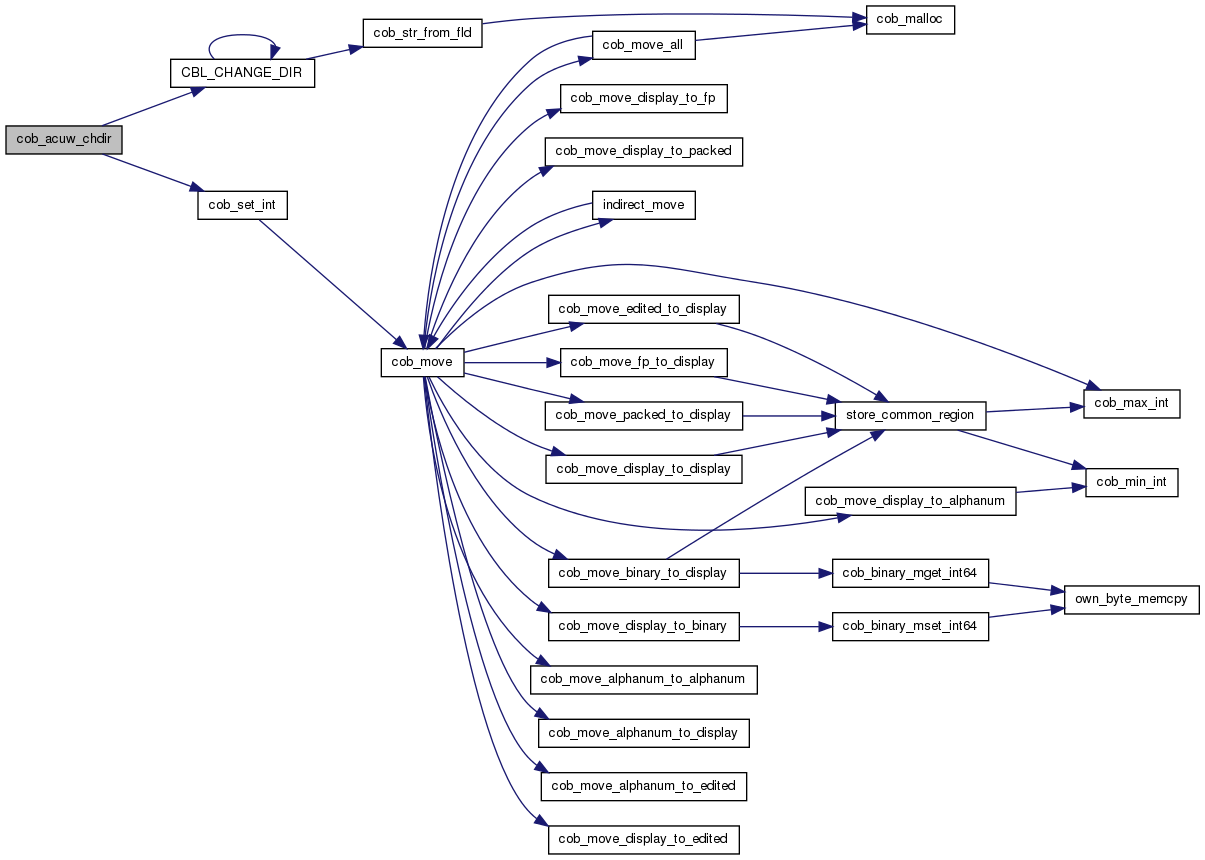
| int cob_acuw_copyfile | ( | unsigned char * | fname1, |
| unsigned char * | fname2, | ||
| unsigned char * | file_type | ||
| ) |
Definition at line 4926 of file fileio.c.
{
int ret = 128;
/* RXW - Type is not yet evaluated */
COB_CHK_PARMS (C$COPY, 3);
if (cob_call_params < 3) {
return 128;
}
ret = CBL_COPY_FILE (fname1, fname2);
if (ret < 0) {
ret = 128;
}
return ret;
}

| int cob_acuw_file_delete | ( | unsigned char * | file_name, |
| unsigned char * | file_type | ||
| ) |
Definition at line 4993 of file fileio.c.
{
int ret;
/* RXW - Type is not yet evaluated */
COB_CHK_PARMS (C$DELETE, 2);
if (cob_call_params < 2 || !cob_current_module->cob_procedure_parameters[0]) {
return 128;
}
ret = CBL_DELETE_FILE (file_name);
if (ret < 0) {
ret = 128;
}
return ret;
}

| int cob_acuw_file_info | ( | unsigned char * | file_name, |
| unsigned char * | file_info | ||
| ) |
Definition at line 4945 of file fileio.c.
{
char *fn;
struct tm *tm;
unsigned long long sz;
unsigned int dt;
short y;
short d, m, hh, mm, ss;
struct stat st;
COB_CHK_PARMS (C$FILEINFO, 2);
if (cob_call_params < 2 || !cob_current_module->cob_procedure_parameters[0]) {
return 128;
}
fn = cob_str_from_fld (cob_current_module->cob_procedure_parameters[0]);
if (stat (fn, &st) < 0) {
free (fn);
return 35;
}
free (fn);
sz = st.st_size;
tm = localtime (&st.st_mtime);
d = tm->tm_mday;
m = tm->tm_mon + 1;
y = tm->tm_year + 1900;
hh = tm->tm_hour;
mm = tm->tm_min;
ss = tm->tm_sec;
#ifndef WORDS_BIGENDIAN
sz = COB_BSWAP_64 (sz);
#endif
memcpy (file_info, &sz, 8);
dt = (y * 10000) + (m * 100) + d;
#ifndef WORDS_BIGENDIAN
dt = COB_BSWAP_32 (dt);
#endif
memcpy (file_info + 8, &dt, 4);
dt = (hh * 1000000) + (mm * 10000) + (ss * 100);
#ifndef WORDS_BIGENDIAN
dt = COB_BSWAP_32 (dt);
#endif
memcpy (file_info + 12, &dt, 4);
return 0;
}

| int cob_acuw_mkdir | ( | unsigned char * | dir | ) |
Definition at line 4897 of file fileio.c.
{
int ret;
COB_CHK_PARMS (C$MAKEDIR, 1);
ret = CBL_CREATE_DIR (dir);
if (ret < 0) {
ret = 128;
}
return ret;
}

| static void cob_cache_file | ( | cob_file * | f | ) | [static] |
Definition at line 671 of file fileio.c.
{
struct file_list *l;
for (l = file_cache; l; l = l->next) {
if (f == l->file) {
return;
}
}
l = cob_malloc (sizeof (struct file_list));
l->file = f;
l->next = file_cache;
file_cache = l;
}


Definition at line 3987 of file fileio.c.
{
int ret;
f->flag_read_done = 0;
if (f->special) {
f->open_mode = COB_OPEN_CLOSED;
RETURN_STATUS (COB_STATUS_00_SUCCESS);
}
if (f->open_mode == COB_OPEN_CLOSED) {
RETURN_STATUS (COB_STATUS_42_NOT_OPEN);
}
if (f->flag_nonexistent) {
ret = COB_STATUS_00_SUCCESS;
} else {
#ifdef WITH_SEQRA_EXTFH
if (f->organization != COB_ORG_INDEXED) {
ret = extfh_cob_file_close (f, opt);
} else {
#endif
ret = fileio_funcs[(int)f->organization]->close (f, opt);
#ifdef WITH_SEQRA_EXTFH
}
#endif
}
if (ret == COB_STATUS_00_SUCCESS) {
switch (opt) {
case COB_CLOSE_LOCK:
f->open_mode = COB_OPEN_LOCKED;
break;
default:
f->open_mode = COB_OPEN_CLOSED;
break;
}
}
RETURN_STATUS (ret);
}
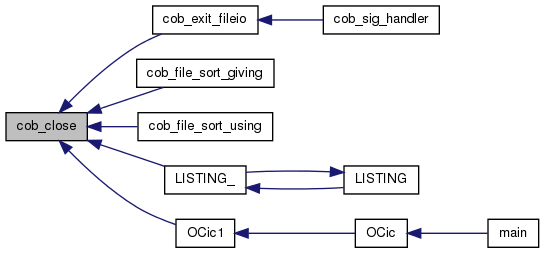
| void cob_commit | ( | void | ) |
Definition at line 4273 of file fileio.c.
{
struct file_list *l;
for (l = file_cache; l; l = l->next) {
cob_file_unlock (l->file);
}
}

Definition at line 5282 of file fileio.c.
{
unsigned char *toptr;
unsigned char *fromptr;
size_t tosize;
size_t fromsize;
toptr = to->record->data;
fromptr = from->record->data;
tosize = to->record->size;
fromsize = from->record->size;
if (unlikely(tosize > fromsize)) {
memcpy (toptr, fromptr, fromsize);
memset (toptr + fromsize, ' ', tosize - fromsize);
} else {
memcpy (toptr, fromptr, tosize);
}
}

| void cob_default_error_handle | ( | void | ) |
Definition at line 4293 of file fileio.c.
{
const char *msg;
unsigned char *file_status;
char *filename;
int status;
file_status = cob_error_file->file_status;
status = cob_d2i(file_status[0]) * 10 + cob_d2i(file_status[1]);
switch (status) {
case COB_STATUS_10_END_OF_FILE:
msg = "End of file";
break;
case COB_STATUS_14_OUT_OF_KEY_RANGE:
msg = "Key out of range";
break;
case COB_STATUS_21_KEY_INVALID:
msg = "Key order not ascending";
break;
case COB_STATUS_22_KEY_EXISTS:
msg = "Record key already exists";
break;
case COB_STATUS_23_KEY_NOT_EXISTS:
msg = "Record key does not exist";
break;
case COB_STATUS_30_PERMANENT_ERROR:
msg = "Permanent file error";
break;
case COB_STATUS_35_NOT_EXISTS:
msg = "File does not exist";
break;
case COB_STATUS_37_PERMISSION_DENIED:
msg = "Permission denied";
break;
case COB_STATUS_41_ALREADY_OPEN:
msg = "File already open";
break;
case COB_STATUS_42_NOT_OPEN:
msg = "File not open";
break;
case COB_STATUS_43_READ_NOT_DONE:
msg = "READ must be executed first";
break;
case COB_STATUS_44_RECORD_OVERFLOW:
msg = "Record overflow";
break;
case COB_STATUS_46_READ_ERROR:
msg = "Failed to read";
break;
case COB_STATUS_47_INPUT_DENIED:
msg = "READ/START not allowed";
break;
case COB_STATUS_48_OUTPUT_DENIED:
msg = "WRITE not allowed";
break;
case COB_STATUS_49_I_O_DENIED:
msg = "DELETE/REWRITE not allowed";
break;
case COB_STATUS_51_RECORD_LOCKED:
msg = "Record locked by another file connector";
break;
case COB_STATUS_52_EOP:
msg = "A page overflow condition occurred";
break;
case COB_STATUS_57_I_O_LINAGE:
msg = "LINAGE values invalid";
break;
case COB_STATUS_61_FILE_SHARING:
msg = "File sharing conflict";
break;
case COB_STATUS_91_NOT_AVAILABLE:
msg = "Runtime library is not configured for this operation";
break;
default:
msg = "Unknown file error";
break;
}
filename = cob_malloc (COB_MEDIUM_BUFF);
cob_field_to_string (cob_error_file->assign, filename);
cob_runtime_error ("%s (STATUS = %02d) File : '%s'", msg,
status, filename);
free (filename);
}
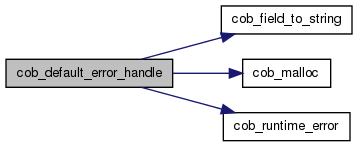

Definition at line 4247 of file fileio.c.
{
int ret;
int read_done = f->flag_read_done;
f->flag_read_done = 0;
if (unlikely(f->open_mode == COB_OPEN_CLOSED ||
f->open_mode != COB_OPEN_I_O)) {
RETURN_STATUS (COB_STATUS_49_I_O_DENIED);
}
if (f->access_mode == COB_ACCESS_SEQUENTIAL && !read_done) {
RETURN_STATUS (COB_STATUS_43_READ_NOT_DONE);
}
ret = fileio_funcs[(int)f->organization]->fdelete (f);
if (unlikely(cob_do_sync && ret == 0)) {
cob_sync (f, cob_do_sync);
}
RETURN_STATUS (ret);
}

| void cob_exit_fileio | ( | void | ) |
Definition at line 4426 of file fileio.c.
{
struct file_list *l;
for (l = file_cache; l; l = l->next) {
if (l->file->open_mode != COB_OPEN_CLOSED &&
l->file->open_mode != COB_OPEN_LOCKED) {
cob_field_to_string (l->file->assign, runtime_buffer);
cob_close (l->file, 0, NULL);
fprintf (stderr, "WARNING - Implicit CLOSE of %s (\"%s\")\n",
l->file->select_name, runtime_buffer);
fflush (stderr);
}
}
#ifdef USE_DB41
free (record_lock_object);
if (bdb_env) {
bdb_env->lock_id_free (bdb_env, bdb_lock_id);
bdb_env->close (bdb_env, 0);
}
#endif
#if defined(WITH_INDEX_EXTFH) || defined(WITH_SEQRA_EXTFH)
extfh_cob_exit_fileio ();
#endif
}


| static int COB_NOINLINE cob_file_close | ( | cob_file * | f, |
| const int | opt | ||
| ) | [static] |
Definition at line 863 of file fileio.c.
{
#ifdef HAVE_FCNTL
struct flock lock;
#endif
switch (opt) {
case COB_CLOSE_NORMAL:
case COB_CLOSE_LOCK:
case COB_CLOSE_NO_REWIND:
if (f->organization == COB_ORG_LINE_SEQUENTIAL) {
if (f->flag_needs_nl && !(f->flag_select_features & COB_SELECT_LINAGE)) {
f->flag_needs_nl = 0;
putc ('\n', (FILE *)f->file);
}
}
#ifdef HAVE_FCNTL
/* unlock the file */
memset ((unsigned char *)&lock, 0, sizeof (struct flock));
lock.l_type = F_UNLCK;
lock.l_whence = SEEK_SET;
lock.l_start = 0;
lock.l_len = 0;
fcntl (fileno ((FILE *)f->file), F_SETLK, &lock);
#endif
/* close the file */
fclose ((FILE *)f->file);
if (opt == COB_CLOSE_NO_REWIND) {
f->open_mode = COB_OPEN_CLOSED;
return COB_STATUS_07_SUCCESS_NO_UNIT;
}
return COB_STATUS_00_SUCCESS;
default:
fflush ((FILE *)f->file);
return COB_STATUS_07_SUCCESS_NO_UNIT;
}
}
| static int COB_NOINLINE cob_file_open | ( | cob_file * | f, |
| char * | filename, | ||
| const int | mode, | ||
| const int | sharing | ||
| ) | [static] |
Definition at line 780 of file fileio.c.
{
FILE *fp = NULL;
struct linage_struct *lingptr;
#ifdef HAVE_FCNTL
int ret;
struct flock lock;
#endif
/* open the file */
switch (mode) {
case COB_OPEN_INPUT:
#if !defined(_WIN32) || defined(_MSC_VER)
if (f->organization == COB_ORG_LINE_SEQUENTIAL)
fp = fopen (filename, "r");
else
#endif
fp = fopen (filename, "rb");
break;
case COB_OPEN_OUTPUT:
if (f->organization == COB_ORG_RELATIVE)
fp = fopen (filename, "wb+");
#if !defined(_WIN32) || defined(_MSC_VER)
else if (f->organization == COB_ORG_LINE_SEQUENTIAL)
fp = fopen (filename, "w");
#endif
else
fp = fopen (filename, "wb");
break;
case COB_OPEN_I_O:
#if !defined(_WIN32) || defined(_MSC_VER)
if (f->organization == COB_ORG_LINE_SEQUENTIAL)
fp = fopen (filename, "r+");
else
#endif
fp = fopen (filename, "rb+");
break;
case COB_OPEN_EXTEND:
#if !defined(_WIN32) || defined(_MSC_VER)
if (f->organization == COB_ORG_LINE_SEQUENTIAL)
fp = fopen (filename, "a+");
else
#endif
fp = fopen (filename, "ab+");
break;
}
if (fp == NULL) {
return errno;
}
if (mode == COB_OPEN_EXTEND) {
fseek (fp, (off_t) 0, SEEK_END);
}
#ifdef HAVE_FCNTL
/* lock the file */
if (memcmp (filename, "/dev/", 5)) {
memset ((unsigned char *)&lock, 0, sizeof (struct flock));
lock.l_type = (sharing || mode == COB_OPEN_OUTPUT) ? F_WRLCK : F_RDLCK;
lock.l_whence = SEEK_SET;
lock.l_start = 0;
lock.l_len = 0;
if (fcntl (fileno (fp), F_SETLK, &lock) < 0) {
ret = errno;
fclose (fp);
return ret;
}
}
#endif
f->file = fp;
if (unlikely(f->flag_select_features & COB_SELECT_LINAGE)) {
if (file_linage_check (f)) {
return COB_LINAGE_INVALID;
}
f->flag_needs_top = 1;
lingptr = (struct linage_struct *)(f->linorkeyptr);
cob_set_int (lingptr->linage_ctr, 1);
}
return 0;
}

| void cob_file_release | ( | cob_file * | f | ) |
Definition at line 5654 of file fileio.c.
{
struct cobsort *hp;
cob_field *fnstatus = NULL;
int ret;
hp = f->file;
if (likely(hp)) {
fnstatus = hp->fnstatus;
}
ret = cob_file_sort_submit (f, f->record->data);
switch (ret) {
case 0:
RETURN_STATUS (COB_STATUS_00_SUCCESS);
break;
default:
if (likely(hp)) {
*(int *)(hp->sort_return) = 16;
}
RETURN_STATUS (COB_STATUS_30_PERMANENT_ERROR);
break;
}
}


| void cob_file_return | ( | cob_file * | f | ) |
Definition at line 5679 of file fileio.c.
{
struct cobsort *hp;
cob_field *fnstatus = NULL;
int ret;
hp = f->file;
if (likely(hp)) {
fnstatus = hp->fnstatus;
}
ret = cob_file_sort_retrieve (f, f->record->data);
switch (ret) {
case 0:
RETURN_STATUS (COB_STATUS_00_SUCCESS);
break;
case COBSORTEND:
RETURN_STATUS (COB_STATUS_10_END_OF_FILE);
break;
default:
if (likely(hp)) {
*(int *)(hp->sort_return) = 16;
}
RETURN_STATUS (COB_STATUS_30_PERMANENT_ERROR);
break;
}
}


| void cob_file_sort_close | ( | cob_file * | f | ) |
Definition at line 5631 of file fileio.c.
{
struct cobsort *hp;
cob_field *fnstatus = NULL;
size_t i;
hp = f->file;
if (likely(hp)) {
fnstatus = hp->fnstatus;
cob_free_list (hp->empty);
for (i = 0; i < 4; i++) {
cob_free_list (hp->queue[i].first);
if (hp->file[i].fp != NULL) {
fclose (hp->file[i].fp);
}
}
free (hp);
}
f->file = NULL;
RETURN_STATUS (COB_STATUS_00_SUCCESS);
}


| static int cob_file_sort_compare | ( | struct cobitem * | k1, |
| struct cobitem * | k2, | ||
| void * | pointer | ||
| ) | [static] |
Definition at line 5046 of file fileio.c.
{
cob_file *f;
size_t i;
int cmp;
size_t u1;
size_t u2;
cob_field f1;
cob_field f2;
f = pointer;
for (i = 0; i < f->nkeys; i++) {
f1 = f2 = *(f->keys[i].field);
f1.data = k1->item + f->keys[i].offset;
f2.data = k2->item + f->keys[i].offset;
if (COB_FIELD_IS_NUMERIC(&f1)) {
cmp = cob_numeric_cmp (&f1, &f2);
} else {
cmp = sort_cmps (f1.data, f2.data, f1.size, f->sort_collating);
}
if (cmp != 0) {
return (f->keys[i].flag == COB_ASCENDING) ? cmp : -cmp;
}
}
unique_copy ((unsigned char *)&u1, k1->unique);
unique_copy ((unsigned char *)&u2, k2->unique);
if (u1 < u2) {
return -1;
}
return 1;
}


| void cob_file_sort_giving | ( | cob_file * | sort_file, |
| const size_t | varcnt, | ||
| ... | |||
| ) |
Definition at line 5544 of file fileio.c.
{
cob_file **fbase;
struct cobsort *hp;
size_t i;
int ret;
int opt;
va_list args;
fbase = cob_malloc (varcnt * sizeof(cob_file *));
va_start (args, varcnt);
for (i = 0; i < varcnt; i++) {
fbase[i] = va_arg (args, cob_file *);
}
va_end (args);
for (i = 0; i < varcnt; i++) {
cob_open (fbase[i], COB_OPEN_OUTPUT, 0, NULL);
}
while (1) {
ret = cob_file_sort_retrieve (sort_file, sort_file->record->data);
if (ret) {
if (ret == COBSORTEND) {
sort_file->file_status[0] = '1';
sort_file->file_status[1] = '0';
} else {
hp = sort_file->file;
*(int *)(hp->sort_return) = 16;
sort_file->file_status[0] = '3';
sort_file->file_status[1] = '0';
}
break;
}
for (i = 0; i < varcnt; i++) {
if (fbase[i]->special ||
fbase[i]->organization == COB_ORG_LINE_SEQUENTIAL) {
opt = COB_WRITE_BEFORE | COB_WRITE_LINES | 1;
} else {
opt = 0;
}
cob_copy_check (fbase[i], sort_file);
cob_write (fbase[i], fbase[i]->record, opt, NULL);
}
}
for (i = 0; i < varcnt; i++) {
cob_close (fbase[i], COB_CLOSE_NORMAL, NULL);
}
free (fbase);
}
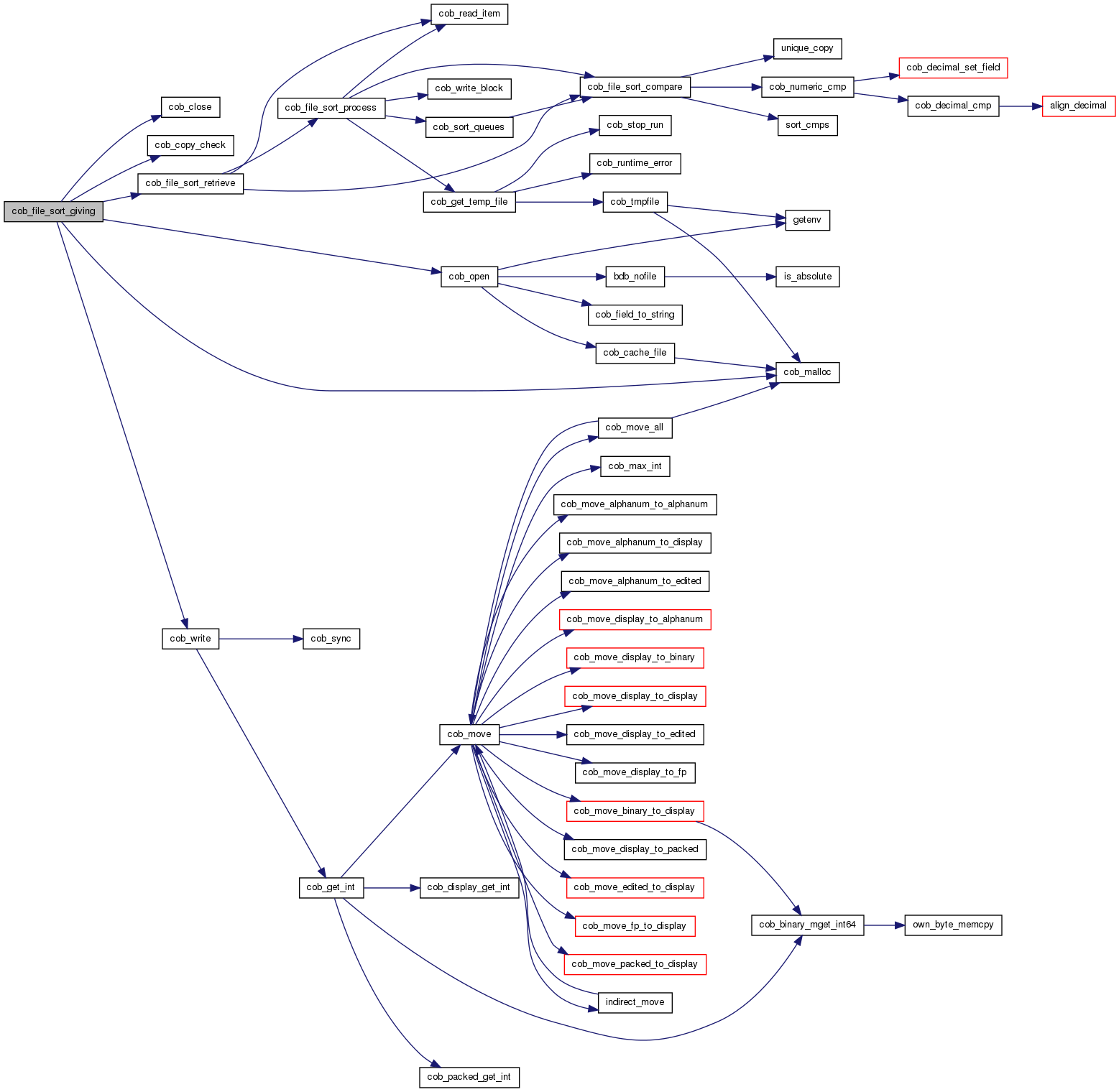
| void cob_file_sort_init | ( | cob_file * | f, |
| const int | nkeys, | ||
| const unsigned char * | collating_sequence, | ||
| void * | sort_return, | ||
| cob_field * | fnstatus | ||
| ) |
Definition at line 5594 of file fileio.c.
{
struct cobsort *p;
p = cob_malloc (sizeof (struct cobsort));
p->fnstatus = fnstatus;
p->size = f->record_max;
p->r_size = f->record_max + sizeof(size_t);
p->w_size = f->record_max + sizeof(size_t) + 1;
p->pointer = f;
p->sort_return = sort_return;
*(int *)sort_return = 0;
p->memory = (size_t)cob_sort_memory / (p->size + sizeof(struct cobitem));
f->file = p;
f->keys = cob_malloc (sizeof (struct cob_file_key) * nkeys);
f->nkeys = 0;
if (collating_sequence) {
f->sort_collating = collating_sequence;
} else {
f->sort_collating = cob_current_module->collating_sequence;
}
RETURN_STATUS (COB_STATUS_00_SUCCESS);
}


| static int cob_file_sort_process | ( | struct cobsort * | hp | ) | [static] |
Definition at line 5302 of file fileio.c.
{
int i;
int source;
int destination;
int n;
int move;
int res;
hp->retrieving = 1;
n = cob_sort_queues (hp);
/* RXW - Cannot be true
if (unlikely(n < 0)) {
return COBSORTABORT;
}
*/
if (likely(!hp->files_used)) {
hp->retrieval_queue = n;
return 0;
}
if (unlikely(cob_write_block (hp, n))) {
return COBSORTFILEERR;
}
for (i = 0; i < 4; i++) {
hp->queue[i].first = hp->empty;
hp->empty = hp->empty->next;
hp->queue[i].first->next = NULL;
}
rewind (hp->file[0].fp);
rewind (hp->file[1].fp);
if (unlikely(cob_get_temp_file (hp, 2))) {
return COBSORTFILEERR;
}
if (unlikely(cob_get_temp_file (hp, 3))) {
return COBSORTFILEERR;
}
source = 0;
while (hp->file[source].count > 1) {
destination = source ^ 2;
hp->file[destination].count = 0;
hp->file[destination + 1].count = 0;
while (hp->file[source].count > 0) {
if (unlikely(cob_read_item (hp, source))) {
return COBSORTFILEERR;
}
if (hp->file[source + 1].count > 0) {
if (unlikely(cob_read_item (hp, source + 1))) {
return COBSORTFILEERR;
}
} else {
hp->queue[source + 1].first->end_of_block = 1;
}
while (!hp->queue[source].first->end_of_block
|| !hp->queue[source + 1].first->end_of_block) {
if (hp->queue[source].first->end_of_block) {
move = 1;
} else if (hp->queue[source + 1].first->end_of_block) {
move = 0;
} else {
res = cob_file_sort_compare
(hp->queue[source].first,
hp->queue[source + 1].first,
hp->pointer);
move = res < 0 ? 0 : 1;
}
if (unlikely(fwrite (
&(hp->queue[source + move].first->block_byte),
hp->w_size, 1,
hp->file[destination].fp) != 1)) {
return COBSORTFILEERR;
}
if (unlikely(cob_read_item (hp, source + move))) {
return COBSORTFILEERR;
}
}
hp->file[destination].count++;
if (unlikely(putc (1, hp->file[destination].fp) != 1)) {
return COBSORTFILEERR;
}
hp->file[source].count--;
hp->file[source + 1].count--;
destination ^= 1;
}
source = destination & 2;
rewind (hp->file[0].fp);
rewind (hp->file[1].fp);
rewind (hp->file[2].fp);
rewind (hp->file[3].fp);
}
hp->retrieval_queue = source;
if (unlikely(cob_read_item (hp, source))) {
return COBSORTFILEERR;
}
if (unlikely(cob_read_item (hp, source + 1))) {
return COBSORTFILEERR;
}
return 0;
}


| static int cob_file_sort_retrieve | ( | cob_file * | f, |
| unsigned char * | p | ||
| ) | [static] |
Definition at line 5471 of file fileio.c.
{
struct cobsort *hp;
struct cobitem *next;
struct memory_struct *z;
int move;
int source;
int res;
hp = f->file;
if (unlikely(!hp)) {
return COBSORTNOTOPEN;
}
if (unlikely(!hp->retrieving)) {
res = cob_file_sort_process (hp);
if (res) {
return res;
}
}
if (unlikely(hp->files_used)) {
source = hp->retrieval_queue;
if (hp->queue[source].first->end_of_block) {
if (hp->queue[source + 1].first->end_of_block) {
return COBSORTEND;
}
move = 1;
} else if (hp->queue[source + 1].first->end_of_block) {
move = 0;
} else {
res = cob_file_sort_compare (hp->queue[source].first,
hp->queue[source + 1].first,
hp->pointer);
move = res < 0 ? 0 : 1;
}
memcpy (p, hp->queue[source + move].first->item, hp->size);
if (unlikely(cob_read_item (hp, source + move))) {
return COBSORTFILEERR;
}
} else {
z = &hp->queue[hp->retrieval_queue];
if (z->first == NULL) {
return COBSORTEND;
}
memcpy (p, z->first->item, hp->size);
next = z->first->next;
z->first->next = hp->empty;
hp->empty = z->first;
z->first = next;
}
return 0;
}


| static int cob_file_sort_submit | ( | cob_file * | f, |
| const unsigned char * | p | ||
| ) | [static] |
Definition at line 5402 of file fileio.c.
{
struct cobsort *hp;
/* RXW - See comment lines below
size_t i;
*/
struct cobitem *q;
struct memory_struct *z;
int n;
hp = f->file;
if (unlikely(!hp)) {
return COBSORTNOTOPEN;
}
if (unlikely(hp->retrieving)) {
return COBSORTABORT;
/* RXW - This was a facility to submit new items after retrieval had begun
for (i = 0; i < 4; i++) {
if (hp->queue[i].first != NULL) {
hp->queue[i].last->next = hp->empty;
hp->empty = hp->queue[i].first;
hp->queue[i].first = NULL;
}
}
hp->queue[0].count = hp->queue[1].count = 0;
hp->destination_file = -1;
hp->retrieving = 0;
hp->files_used = 0;
*/
}
if (hp->queue[0].count + hp->queue[1].count >= hp->memory) {
if (!hp->files_used) {
if (unlikely(cob_get_temp_file (hp, 0))) {
return COBSORTFILEERR;
}
if (unlikely(cob_get_temp_file (hp, 1))) {
return COBSORTFILEERR;
}
hp->files_used = 1;
hp->destination_file = 0;
}
n = cob_sort_queues (hp);
/* RXW - Cannot be true
if (unlikely(n < 0)) {
return COBSORTABORT;
}
*/
if (unlikely(cob_write_block (hp, n))) {
return COBSORTFILEERR;
}
hp->destination_file ^= 1;
}
q = cob_new_item (hp, sizeof (struct cobitem) + hp->size);
q->end_of_block = 1;
unique_copy (q->unique, (unsigned char *)&(hp->unique));
hp->unique++;
memcpy (q->item, p, hp->size);
if (hp->queue[0].count <= hp->queue[1].count) {
z = &hp->queue[0];
} else {
z = &hp->queue[1];
}
q->next = z->first;
z->first = q;
z->count++;
return 0;
}


Definition at line 5524 of file fileio.c.
{
int ret;
cob_open (data_file, COB_OPEN_INPUT, 0, NULL);
while (1) {
cob_read (data_file, NULL, NULL, COB_READ_NEXT);
if (data_file->file_status[0] != '0') {
break;
}
cob_copy_check (sort_file, data_file);
ret = cob_file_sort_submit (sort_file, sort_file->record->data);
if (ret) {
break;
}
}
cob_close (data_file, COB_CLOSE_NORMAL, NULL);
}

| static void COB_NOINLINE cob_file_unlock | ( | cob_file * | f | ) | [static] |
Definition at line 3664 of file fileio.c.
{
#ifdef WITH_DB
#ifdef USE_DB41
struct indexed_file *p;
#endif
#endif
#if defined(WITH_CISAM) || defined(WITH_DISAM) || defined(WITH_VBISAM)
struct indexfile *fh;
#endif
#ifdef HAVE_FCNTL
struct flock lock;
#endif
if (f->open_mode != COB_OPEN_CLOSED &&
f->open_mode != COB_OPEN_LOCKED) {
if (f->organization == COB_ORG_SORT) {
return;
}
if (f->organization != COB_ORG_INDEXED) {
#ifdef WITH_SEQRA_EXTFH
#else /* WITH_SEQRA_EXTFH */
fflush ((FILE *)f->file);
fsync (fileno ((FILE *)f->file));
#ifdef HAVE_FCNTL
if (!(f->lock_mode & COB_LOCK_EXCLUSIVE)) {
/* unlock the file */
memset ((unsigned char *)&lock, 0, sizeof (struct flock));
lock.l_type = F_UNLCK;
lock.l_whence = SEEK_SET;
lock.l_start = 0;
lock.l_len = 0;
fcntl (fileno ((FILE *)f->file), F_SETLK, &lock);
}
#endif
#endif /* WITH_SEQRA_EXTFH */
} else {
#ifdef WITH_INDEX_EXTFH
extfh_indexed_unlock (f);
#else /* WITH_INDEX_EXTFH */
#ifdef WITH_DB
#ifdef USE_DB41
p = f->file;
if (bdb_env != NULL) {
unlock_record (f);
bdb_env->lock_put (bdb_env, &p->bdb_file_lock);
}
#endif
#endif
#if defined(WITH_CISAM) || defined(WITH_DISAM) || defined(WITH_VBISAM)
fh = f->file;
isrelease (fh->isfd);
#endif
#endif /* WITH_INDEX_EXTFH */
}
}
}

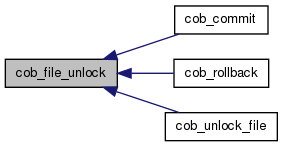
| static int cob_file_write_opt | ( | cob_file * | f, |
| const int | opt | ||
| ) | [static] |
Definition at line 965 of file fileio.c.
{
int i;
if (unlikely(f->flag_select_features & COB_SELECT_LINAGE)) {
return cob_linage_write_opt (f, opt);
}
if (opt & COB_WRITE_LINES) {
for (i = opt & COB_WRITE_MASK; i > 0; i--)
putc ('\n', (FILE *)f->file);
} else if (opt & COB_WRITE_PAGE) {
putc ('\f', (FILE *)f->file);
}
return 0;
}
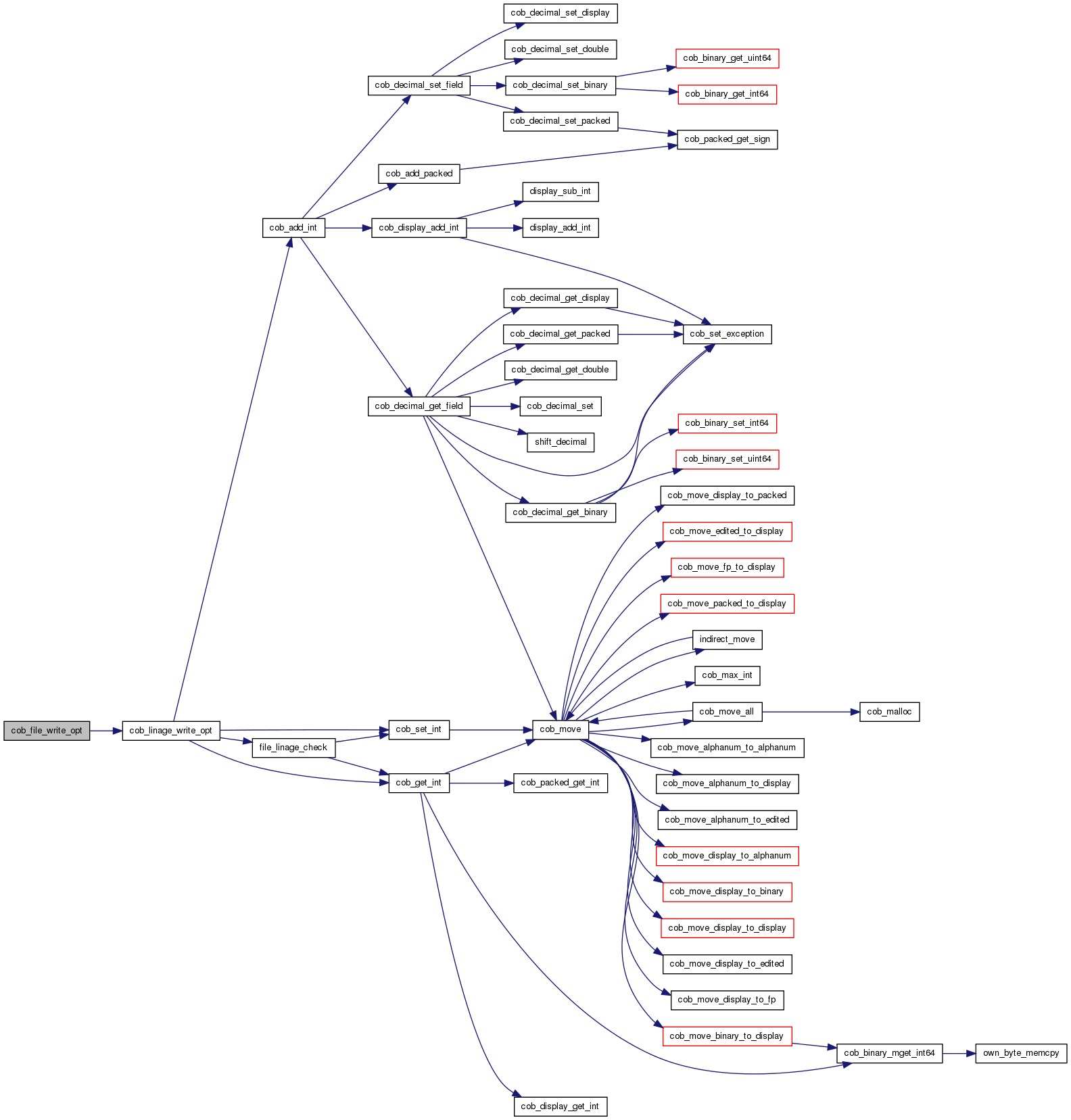

| static void cob_free_list | ( | struct cobitem * | q | ) | [static] |
| static int COB_NOINLINE cob_get_temp_file | ( | struct cobsort * | hp, |
| const int | n | ||
| ) | [static] |
Definition at line 5168 of file fileio.c.
{
if (hp->file[n].fp == NULL) {
hp->file[n].fp = cob_tmpfile ();
if (hp->file[n].fp == NULL) {
cob_runtime_error ("SORT is unable to acquire temporary file");
cob_stop_run (1);
}
} else {
rewind (hp->file[n].fp);
}
hp->file[n].count = 0;
return hp->file[n].fp == NULL;
}


| void cob_init_fileio | ( | void | ) |
Definition at line 4379 of file fileio.c.
{
char *s;
int n;
if ((s = getenv ("COB_SYNC")) != NULL) {
if (*s == 'Y' || *s == 'y') {
cob_do_sync = 1;
}
if (*s == 'P' || *s == 'p') {
cob_do_sync = 2;
}
}
if ((s = getenv ("COB_SORT_MEMORY")) != NULL) {
n = atoi (s);
if (n >= 1024*1024) {
cob_sort_memory = n;
}
}
cob_file_path = getenv ("COB_FILE_PATH");
if (cob_file_path) {
if (!*cob_file_path || *cob_file_path == ' ') {
cob_file_path = NULL;
}
}
cob_ls_nulls = getenv ("COB_LS_NULLS");
cob_ls_fixed = getenv ("COB_LS_FIXED");
file_open_env = cob_malloc (COB_SMALL_BUFF);
file_open_name = cob_malloc (COB_SMALL_BUFF);
file_open_buff = cob_malloc (COB_SMALL_BUFF);
#ifdef USE_DB41
bdb_home = getenv ("DB_HOME");
join_environment ();
record_lock_object = cob_malloc (1024);
bdb_buff = cob_malloc (COB_SMALL_BUFF);
rlo_size = 1024;
#endif
#if defined(WITH_INDEX_EXTFH) || defined(WITH_SEQRA_EXTFH)
extfh_cob_init_fileio (&sequential_funcs, &lineseq_funcs, &relative_funcs, &cob_file_write_opt);
#endif
}
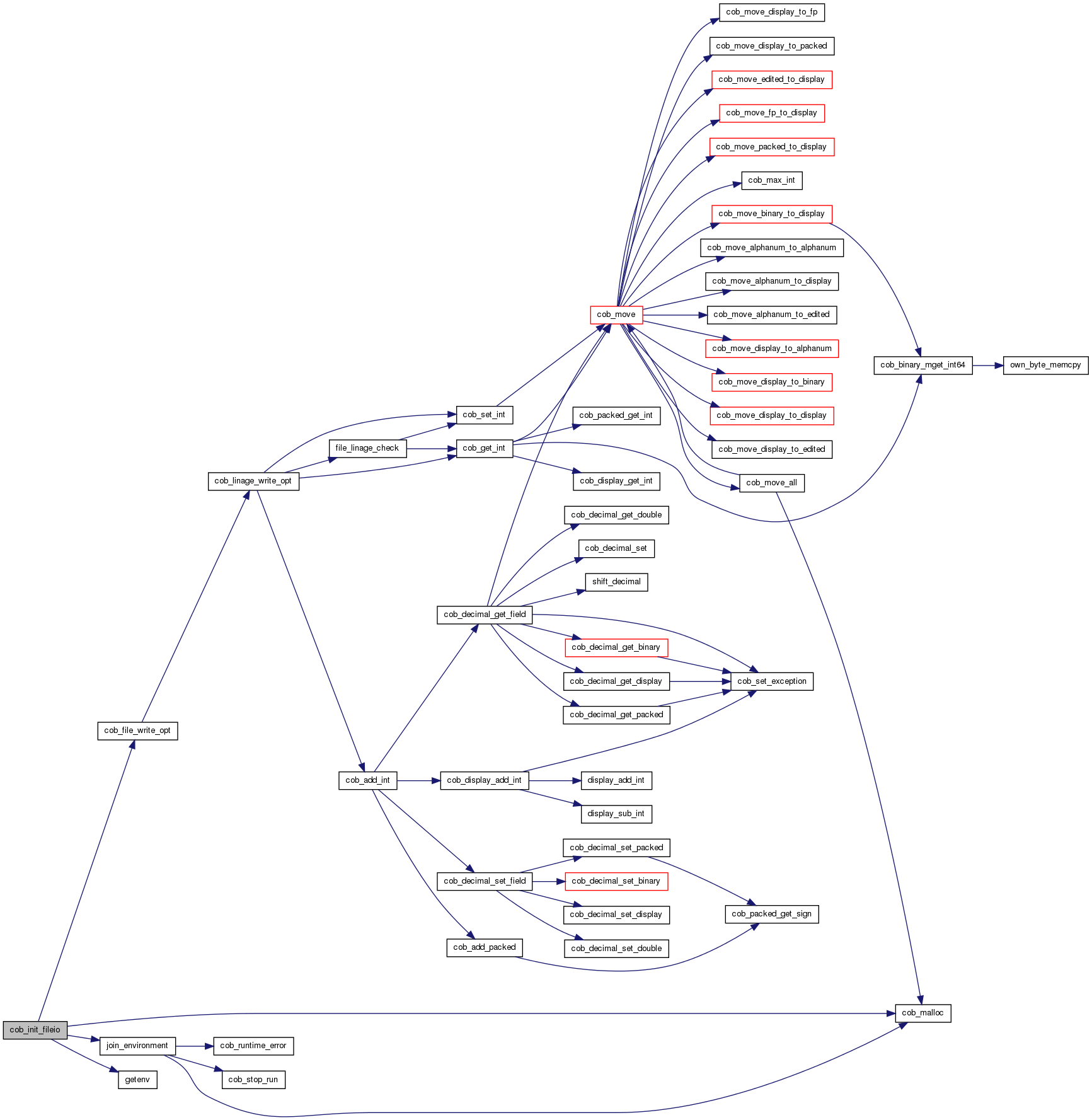
| static int COB_NOINLINE cob_linage_write_opt | ( | cob_file * | f, |
| const int | opt | ||
| ) | [static] |
Definition at line 902 of file fileio.c.
{
struct linage_struct *lingptr;
int i, n;
lingptr = (struct linage_struct *)(f->linorkeyptr);
if (unlikely(opt & COB_WRITE_PAGE)) {
i = cob_get_int (lingptr->linage_ctr);
if (i == 0) {
return COB_STATUS_57_I_O_LINAGE;
}
n = lingptr->lin_lines;
for (; i < n; i++) {
putc ('\n', (FILE *)f->file);
}
for (i = 0; i < lingptr->lin_bot; i++) {
putc ('\n', (FILE *)f->file);
}
if (file_linage_check (f)) {
return COB_STATUS_57_I_O_LINAGE;
}
for (i = 0; i < lingptr->lin_top; i++) {
putc ('\n', (FILE *)f->file);
}
cob_set_int (lingptr->linage_ctr, 1);
} else if (opt & COB_WRITE_LINES) {
n = cob_get_int (lingptr->linage_ctr);
if (n == 0) {
return COB_STATUS_57_I_O_LINAGE;
}
cob_add_int (lingptr->linage_ctr, opt & COB_WRITE_MASK);
i = cob_get_int (lingptr->linage_ctr);
if ((opt & COB_WRITE_EOP) && lingptr->lin_foot) {
if (i >= lingptr->lin_foot) {
eop_status = 1;
}
}
if (i > lingptr->lin_lines) {
if (opt & COB_WRITE_EOP) {
eop_status = 1;
}
for (; n < lingptr->lin_lines; n++) {
putc ('\n', (FILE *)f->file);
}
for (i = 0; i < lingptr->lin_bot; i++) {
putc ('\n', (FILE *)f->file);
}
if (file_linage_check (f)) {
return COB_STATUS_57_I_O_LINAGE;
}
cob_set_int (lingptr->linage_ctr, 1);
for (i = 0; i < lingptr->lin_top; i++) {
putc ('\n', (FILE *)f->file);
}
} else {
for (i = (opt & COB_WRITE_MASK) - 1; i > 0; i--)
putc ('\n', (FILE *)f->file);
}
}
return 0;
}
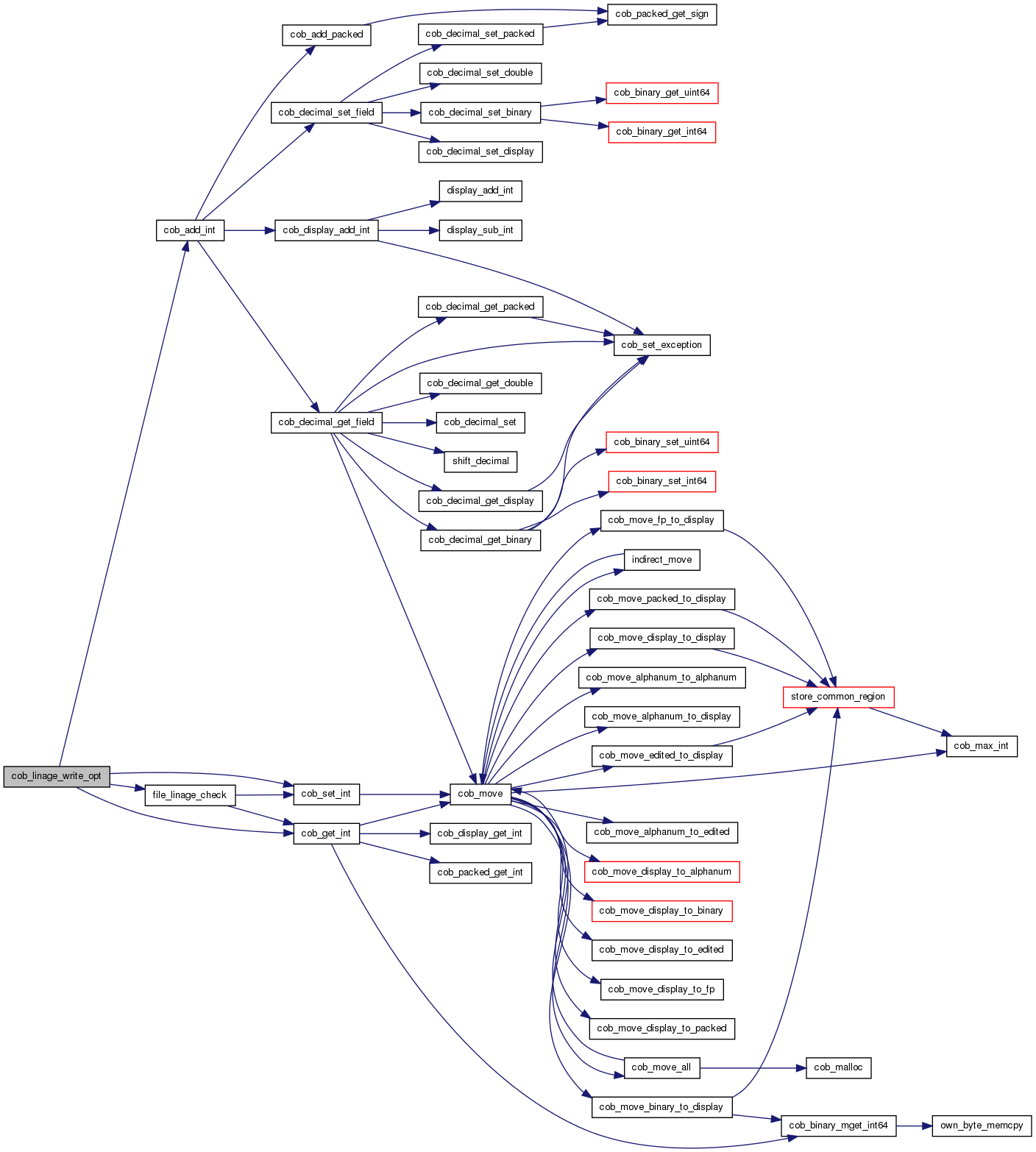

Definition at line 3734 of file fileio.c.
{
char *p;
char *src;
char *dst;
size_t i;
size_t simple;
int was_not_exist = 0;
struct stat st;
f->flag_read_done = 0;
/* file was previously closed with lock */
if (f->open_mode == COB_OPEN_LOCKED) {
RETURN_STATUS (COB_STATUS_38_CLOSED_WITH_LOCK);
}
/* file is already open */
if (f->open_mode != COB_OPEN_CLOSED) {
RETURN_STATUS (COB_STATUS_41_ALREADY_OPEN);
}
f->last_open_mode = mode;
f->flag_nonexistent = 0;
f->flag_end_of_file = 0;
f->flag_begin_of_file = 0;
f->flag_first_read = 2;
if (f->special) {
if (f->special == 1) {
if (mode != COB_OPEN_INPUT) {
RETURN_STATUS (COB_STATUS_30_PERMANENT_ERROR);
}
f->file = stdin;
f->open_mode = mode;
RETURN_STATUS (COB_STATUS_00_SUCCESS);
} else {
if (mode != COB_OPEN_OUTPUT) {
RETURN_STATUS (COB_STATUS_30_PERMANENT_ERROR);
}
f->file = stdout;
f->open_mode = mode;
RETURN_STATUS (COB_STATUS_00_SUCCESS);
}
}
/* obtain the file name */
cob_field_to_string (f->assign, file_open_name);
#ifdef WITH_INDEX_EXTFH
if (f->organization == COB_ORG_INDEXED) {
int ret;
ret = extfh_indexed_locate (f, file_open_name);
switch (ret) {
case COB_NOT_CONFIGURED:
/* EXTFH requires OC to process the filename */
break;
case COB_STATUS_00_SUCCESS:
/* EXTFH recognized the file */
goto file_available;
default:
/* EXTFH detected an error */
RETURN_STATUS (ret);
}
}
#endif /* WITH_INDEX_EXTFH */
#ifdef WITH_SEQRA_EXTFH
if (f->organization != COB_ORG_INDEXED) {
int ret;
ret = extfh_seqra_locate (f, file_open_name);
switch (ret) {
case COB_NOT_CONFIGURED:
/* EXTFH requires OC to process the filename */
break;
case COB_STATUS_00_SUCCESS:
/* EXTFH recognized the file */
goto file_available;
default:
/* EXTFH detected an error */
RETURN_STATUS (ret);
}
}
#endif /* WITH_SEQRA_EXTFH */
if (cob_current_module->flag_filename_mapping) {
src = file_open_name;
dst = file_open_buff;
simple = 1;
/* expand envoronment variables */
/* ex. "$TMPDIR/foo" -> "/tmp/foo" */
while (*src) {
if (!isalnum (*src) && *src != '_' && *src != '-') {
simple = 0;
}
if (*src == '$') {
for (i = 1; ; i++) {
if (!isalnum (src[i]) && src[i] != '_' && *src != '-') {
break;
}
}
memcpy (file_open_env, src + 1, i - 1);
file_open_env[i - 1] = 0;
if ((p = getenv (file_open_env)) != NULL) {
strcpy (dst, p);
dst += strlen (p);
}
src += i;
} else {
*dst++ = *src++;
}
}
*dst = 0;
strncpy (file_open_name, file_open_buff, COB_SMALL_MAX);
/* resolve by environment variables */
/* ex. "TMPFILE" -> DD_TMPFILE, dd_TMPFILE, or TMPFILE */
if (simple) {
for (i = 0; i < NUM_PREFIX; i++) {
snprintf (file_open_buff, COB_SMALL_MAX, "%s%s",
prefix[i], file_open_name);
if ((p = getenv (file_open_buff)) != NULL) {
strncpy (file_open_name, p, COB_SMALL_MAX);
break;
}
}
if (i == NUM_PREFIX && cob_file_path) {
snprintf (file_open_buff, COB_SMALL_MAX, "%s/%s",
cob_file_path, file_open_name);
strncpy (file_open_name, file_open_buff,
COB_SMALL_MAX);
}
}
}
/* check if the file exists */
#ifdef USE_DB41
if (f->organization == COB_ORG_INDEXED) {
if ((bdb_env && bdb_nofile (file_open_name)) ||
(!bdb_env && stat (file_open_name, &st) == -1 && errno == ENOENT)) {
was_not_exist = 1;
if (mode != COB_OPEN_OUTPUT && f->flag_optional == 0) {
RETURN_STATUS (COB_STATUS_35_NOT_EXISTS);
}
}
} else if (stat (file_open_name, &st) == -1 && errno == ENOENT) {
#else /* USE_DB41 */
#if defined(WITH_CISAM) || defined(WITH_DISAM) || defined(WITH_VBISAM)
if (f->organization == COB_ORG_INDEXED) {
strncpy (file_open_buff, file_open_name, COB_SMALL_MAX);
strcat (file_open_buff, ".idx");
if (stat (file_open_buff, &st) == -1 && errno == ENOENT) {
was_not_exist = 1;
if (mode != COB_OPEN_OUTPUT && f->flag_optional == 0) {
RETURN_STATUS (COB_STATUS_35_NOT_EXISTS);
}
}
strncpy (file_open_buff, file_open_name, COB_SMALL_MAX);
strcat (file_open_buff, ".dat");
if (stat (file_open_buff, &st) == -1 && errno == ENOENT) {
was_not_exist = 1;
if (mode != COB_OPEN_OUTPUT && f->flag_optional == 0) {
RETURN_STATUS (COB_STATUS_35_NOT_EXISTS);
}
}
} else if (stat (file_open_name, &st) == -1 && errno == ENOENT) {
#else /* WITH_CISAM || WITH_DISAM || WITH_VBISAM */
if (stat (file_open_name, &st) == -1 && errno == ENOENT) {
#endif /* WITH_CISAM || WITH_DISAM || WITH_VBISAM */
#endif /* USE_DB41 */
was_not_exist = 1;
if (mode != COB_OPEN_OUTPUT && f->flag_optional == 0) {
RETURN_STATUS (COB_STATUS_35_NOT_EXISTS);
}
}
#if defined(WITH_INDEX_EXTFH) || defined(WITH_SEQRA_EXTFH)
file_available:
#endif /* WITH_INDEX_EXTFH || WITH_SEQRA_EXTFH */
cob_cache_file (f);
/* open the file */
#ifdef WITH_SEQRA_EXTFH
if (f->organization != COB_ORG_INDEXED) {
int ret;
ret = extfh_cob_file_open (f, file_open_name, mode, sharing);
switch (ret) {
case COB_STATUS_00_SUCCESS:
f->open_mode = mode;
break;
case COB_STATUS_35_NOT_EXISTS:
if (f->flag_optional) {
f->open_mode = mode;
f->flag_nonexistent = 1;
f->flag_end_of_file = 1;
f->flag_begin_of_file = 1;
RETURN_STATUS (COB_STATUS_05_SUCCESS_OPTIONAL);
}
break;
}
RETURN_STATUS (ret);
}
#endif
#if defined(WITH_CISAM) || defined(WITH_DISAM) || defined(WITH_VBISAM)
if (f->organization == COB_ORG_INDEXED) {
/* Do this here to avoid mangling of the status in the 'switch' below */
RETURN_STATUS (fileio_funcs[(int)f->organization]->open (f, file_open_name, mode, sharing));
}
#endif
switch (fileio_funcs[(int)f->organization]->open (f, file_open_name, mode, sharing)) {
case 0:
f->open_mode = mode;
if (f->flag_optional && was_not_exist) {
RETURN_STATUS (COB_STATUS_05_SUCCESS_OPTIONAL);
} else {
RETURN_STATUS (COB_STATUS_00_SUCCESS);
}
case ENOENT:
if (mode == COB_OPEN_EXTEND || mode == COB_OPEN_OUTPUT) {
RETURN_STATUS (COB_STATUS_30_PERMANENT_ERROR);
}
if (f->flag_optional) {
f->open_mode = mode;
f->flag_nonexistent = 1;
f->flag_end_of_file = 1;
f->flag_begin_of_file = 1;
RETURN_STATUS (COB_STATUS_05_SUCCESS_OPTIONAL);
} else {
RETURN_STATUS (COB_STATUS_35_NOT_EXISTS);
}
case EACCES:
case EISDIR:
case EROFS:
RETURN_STATUS (COB_STATUS_37_PERMISSION_DENIED);
case EAGAIN:
case COB_STATUS_61_FILE_SHARING:
RETURN_STATUS (COB_STATUS_61_FILE_SHARING);
case COB_STATUS_91_NOT_AVAILABLE:
RETURN_STATUS (COB_STATUS_91_NOT_AVAILABLE);
case COB_LINAGE_INVALID:
RETURN_STATUS (COB_STATUS_57_I_O_LINAGE);
default:
RETURN_STATUS (COB_STATUS_30_PERMANENT_ERROR);
}
}
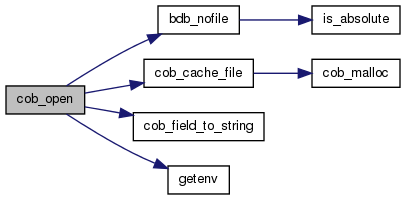
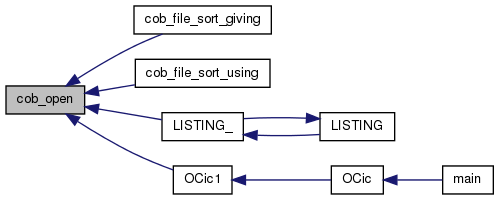
Definition at line 4081 of file fileio.c.
{
int ret;
f->flag_read_done = 0;
if (unlikely(f->flag_nonexistent)) {
if (f->flag_first_read == 0) {
RETURN_STATUS (COB_STATUS_23_KEY_NOT_EXISTS);
}
f->flag_first_read = 0;
RETURN_STATUS (COB_STATUS_10_END_OF_FILE);
}
/* sequential read at the end of file is an error */
if (key == NULL) {
if (f->flag_end_of_file && !(read_opts & COB_READ_PREVIOUS)) {
RETURN_STATUS (COB_STATUS_46_READ_ERROR);
}
if (f->flag_begin_of_file && (read_opts & COB_READ_PREVIOUS)) {
RETURN_STATUS (COB_STATUS_46_READ_ERROR);
}
}
if (unlikely(f->open_mode == COB_OPEN_CLOSED
|| f->open_mode == COB_OPEN_OUTPUT
|| f->open_mode == COB_OPEN_EXTEND)) {
RETURN_STATUS (COB_STATUS_47_INPUT_DENIED);
}
#ifdef USE_DB41
if (f->organization == COB_ORG_INDEXED && bdb_env != NULL) {
if (f->open_mode != COB_OPEN_I_O ||
(f->lock_mode & COB_LOCK_EXCLUSIVE)) {
read_opts &= ~COB_READ_LOCK;
} else if ((f->lock_mode & COB_LOCK_AUTOMATIC) &&
!(read_opts & COB_READ_NO_LOCK)) {
read_opts |= COB_READ_LOCK;
}
} else {
read_opts &= ~COB_READ_LOCK;
}
#endif
if (key) {
ret = fileio_funcs[(int)f->organization]->read (f, key, read_opts);
} else {
ret = fileio_funcs[(int)f->organization]->read_next (f, read_opts);
}
switch (ret) {
case COB_STATUS_00_SUCCESS:
f->flag_first_read = 0;
f->flag_read_done = 1;
f->flag_end_of_file = 0;
f->flag_begin_of_file = 0;
if (f->record_size && f->organization != COB_ORG_LINE_SEQUENTIAL) {
cob_set_int (f->record_size, (int) f->record->size);
}
break;
case COB_STATUS_10_END_OF_FILE:
if (read_opts & COB_READ_PREVIOUS) {
f->flag_begin_of_file = 1;
} else {
f->flag_end_of_file = 1;
}
break;
}
RETURN_STATUS (ret);
}
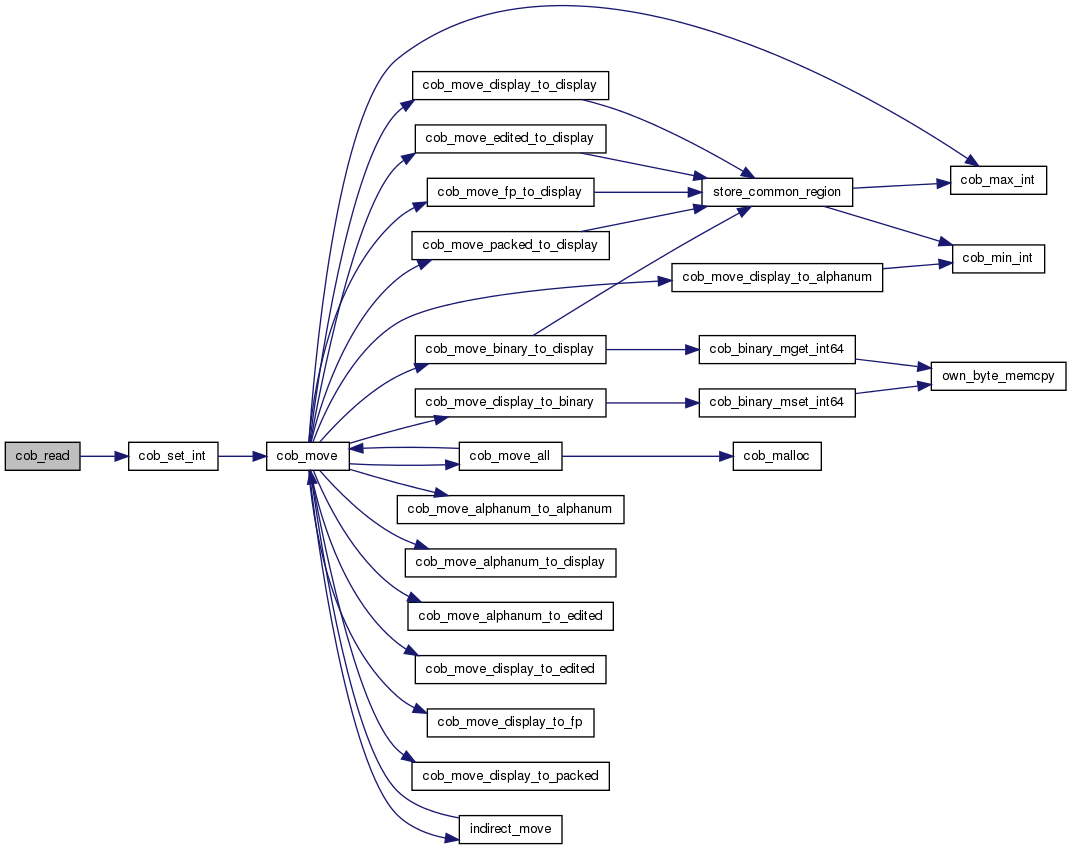

| static int cob_read_item | ( | struct cobsort * | hp, |
| const int | n | ||
| ) | [static] |
Definition at line 5240 of file fileio.c.
{
FILE *fp = hp->file[n].fp;
if (getc (fp) != 0) {
hp->queue[n].first->end_of_block = 1;
} else {
hp->queue[n].first->end_of_block = 0;
if (unlikely(fread (hp->queue[n].first->unique, hp->r_size, 1, fp) != 1)) {
return 1;
}
}
return 0;
}

Definition at line 4201 of file fileio.c.
{
int ret;
int read_done = f->flag_read_done;
f->flag_read_done = 0;
if (unlikely(f->open_mode == COB_OPEN_CLOSED ||
f->open_mode != COB_OPEN_I_O)) {
RETURN_STATUS (COB_STATUS_49_I_O_DENIED);
}
if (f->access_mode == COB_ACCESS_SEQUENTIAL && !read_done) {
RETURN_STATUS (COB_STATUS_43_READ_NOT_DONE);
}
if (f->organization == COB_ORG_SEQUENTIAL) {
if (f->record->size != rec->size) {
RETURN_STATUS (COB_STATUS_44_RECORD_OVERFLOW);
}
if (f->record_size) {
if (f->record->size != (size_t)cob_get_int (f->record_size)) {
RETURN_STATUS (COB_STATUS_44_RECORD_OVERFLOW);
}
}
}
/* RXW
#ifdef USE_DB41
if (f->organization != COB_ORG_INDEXED || bdb_env == NULL) {
opt &= ~COB_WRITE_LOCK;
}
#endif
*/
ret = fileio_funcs[(int)f->organization]->rewrite (f, opt);
if (unlikely(cob_do_sync && ret == 0)) {
cob_sync (f, cob_do_sync);
}
RETURN_STATUS (ret);
}

| void cob_rollback | ( | void | ) |
Definition at line 4283 of file fileio.c.
{
struct file_list *l;
for (l = file_cache; l; l = l->next) {
cob_file_unlock (l->file);
}
}

| static int cob_sort_queues | ( | struct cobsort * | hp | ) | [static] |
Definition at line 5184 of file fileio.c.
{
struct cobitem *q;
int source = 0;
int destination;
int move;
int n;
int end_of_block[2];
while (hp->queue[source + 1].count != 0) {
destination = source ^ 2;
hp->queue[destination].count = hp->queue[destination + 1].count = 0;
hp->queue[destination].first = hp->queue[destination + 1].first = NULL;
while (1) {
end_of_block[0] = hp->queue[source].count == 0;
end_of_block[1] = hp->queue[source + 1].count == 0;
if (end_of_block[0] && end_of_block[1]) {
break;
}
while (!end_of_block[0] || !end_of_block[1]) {
if (end_of_block[0]) {
move = 1;
} else if (end_of_block[1]) {
move = 0;
} else {
n = cob_file_sort_compare
(hp->queue[source].first,
hp->queue[source + 1].first,
hp->pointer);
move = n < 0 ? 0 : 1;
}
q = hp->queue[source + move].first;
if (q->end_of_block) {
end_of_block[move] = 1;
}
hp->queue[source + move].first = q->next;
if (hp->queue[destination].first == NULL) {
hp->queue[destination].first = q;
} else {
hp->queue[destination].last->next = q;
}
hp->queue[destination].last = q;
hp->queue[source + move].count--;
hp->queue[destination].count++;
q->next = NULL;
q->end_of_block = 0;
}
hp->queue[destination].last->end_of_block = 1;
destination ^= 1;
}
source = destination & 2;
}
return source;
}


Definition at line 4052 of file fileio.c.
{
int ret;
f->flag_read_done = 0;
f->flag_first_read = 0;
if (f->flag_nonexistent) {
RETURN_STATUS (COB_STATUS_23_KEY_NOT_EXISTS);
}
if (f->open_mode == COB_OPEN_CLOSED
|| f->open_mode == COB_OPEN_OUTPUT
|| f->open_mode == COB_OPEN_EXTEND
|| f->access_mode == COB_ACCESS_RANDOM) {
RETURN_STATUS (COB_STATUS_47_INPUT_DENIED);
}
ret = fileio_funcs[(int)f->organization]->start (f, cond, key);
if (ret == COB_STATUS_00_SUCCESS) {
f->flag_end_of_file = 0;
f->flag_begin_of_file = 0;
f->flag_first_read = 1;
}
RETURN_STATUS (ret);
}
| static void* COB_NOINLINE cob_str_from_fld | ( | const cob_field * | f | ) | [static] |
Definition at line 4455 of file fileio.c.
{
void *mptr;
unsigned char *s;
int i;
int n;
int quote_switch;
if (!f) {
return cob_malloc (1);
}
for (i = (int) f->size - 1; i >= 0; i--) {
if (f->data[i] != ' ' && f->data[i] != 0) {
break;
}
}
i++;
/* i is 0 or > 0 */
mptr = cob_malloc ((size_t)(i + 1));
quote_switch = 0;
s = mptr;
for (n = 0; n < i; n++) {
if (f->data[n] == '"') {
quote_switch = !quote_switch;
continue;
}
s[n] = f->data[n];
if (quote_switch) {
continue;
}
if (s[n] == ' ' || s[n] == 0) {
s[n] = 0;
break;
}
}
return mptr;
}

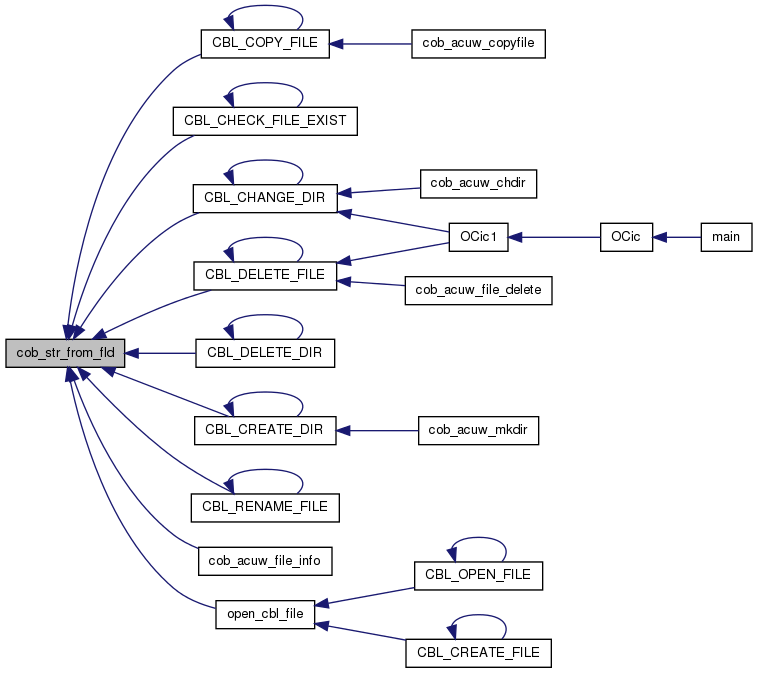
| static void COB_NOINLINE cob_sync | ( | cob_file * | f, |
| const int | mode | ||
| ) | [static] |
Definition at line 622 of file fileio.c.
{
#ifdef WITH_DB
struct indexed_file *p;
size_t i;
#ifdef USE_DB41
int n;
#endif
#endif
#if defined(WITH_CISAM) || defined(WITH_DISAM) || defined(WITH_VBISAM)
struct indexfile *fh = f->file;
#endif
if (f->organization == COB_ORG_INDEXED) {
#ifdef WITH_DB
p = f->file;
for (i = 0; i < f->nkeys; i++) {
if (p->db[i]) {
DB_SYNC (p->db[i]);
}
}
if (mode == 2) {
for (i = 0; i < f->nkeys; i++) {
if (p->db[i]) {
#ifdef USE_DB41
fsync (p->db[i]->fd (p->db[i], &n));
#else
fsync (p->db[i]->fd (p->db[i]));
#endif
}
}
}
#endif /* WITH_DB */
#if defined(WITH_CISAM) || defined(WITH_DISAM) || defined(WITH_VBISAM)
if (fh) {
isflush (fh->isfd);
}
#endif
return;
}
if (f->organization != COB_ORG_SORT) {
fflush ((FILE *)f->file);
if (mode == 2) {
fsync (fileno ((FILE *)f->file));
}
}
}

| static FILE* COB_NOINLINE cob_tmpfile | ( | void | ) | [static] |
Definition at line 5105 of file fileio.c.
{
FILE *fp;
const char *s;
int fd;
char *filename;
#ifdef _WIN32
char *tmpdir;
#endif
filename = cob_malloc (COB_MEDIUM_BUFF);
#ifdef _WIN32
/* get temporary directory */
tmpdir = cob_malloc (COB_MEDIUM_BUFF);
if ((s = getenv ("TMPDIR")) != NULL ||
(s = getenv ("TMP")) != NULL ||
(s = getenv ("TEMP")) != NULL) {
strncpy (tmpdir, s, COB_MEDIUM_MAX);
} else {
GetTempPath (COB_MEDIUM_BUFF, tmpdir);
}
/* get temporary file name */
GetTempFileName (tmpdir, "cob", 0, filename);
DeleteFile (filename);
free (tmpdir);
fd = _open (filename, _O_CREAT | _O_TRUNC | _O_RDWR | _O_BINARY, 0660);
#else
if ((s = getenv ("TMPDIR")) == NULL &&
(s = getenv ("TMP")) == NULL &&
(s = getenv ("TEMP")) == NULL) {
s = "/tmp";
}
if (cob_process_id == 0) {
cob_process_id = getpid ();
}
snprintf (filename, COB_MEDIUM_MAX, "%s/cobsort%d_%d",
s, cob_process_id, cob_iteration);
cob_iteration++;
fd = open (filename, O_CREAT | O_TRUNC | O_RDWR | O_BINARY | O_LARGEFILE, 0660);
#endif
if (fd < 0) {
free (filename);
return NULL;
}
#ifdef _WIN32
_unlink (filename);
fp = _fdopen (fd, "w+b");
if (!fp) {
_close (fd);
}
#else
unlink (filename);
fp = fdopen (fd, "w+b");
if (!fp) {
close (fd);
}
#endif
free (filename);
return fp;
}


Definition at line 3727 of file fileio.c.
{
cob_file_unlock (f);
RETURN_STATUS (COB_STATUS_00_SUCCESS);
}

Definition at line 4153 of file fileio.c.
{
int ret;
f->flag_read_done = 0;
if (f->access_mode == COB_ACCESS_SEQUENTIAL) {
if (f->open_mode == COB_OPEN_CLOSED
|| f->open_mode == COB_OPEN_INPUT
|| f->open_mode == COB_OPEN_I_O) {
RETURN_STATUS (COB_STATUS_48_OUTPUT_DENIED);
}
} else {
if (f->open_mode == COB_OPEN_CLOSED
|| f->open_mode == COB_OPEN_INPUT
|| f->open_mode == COB_OPEN_EXTEND) {
RETURN_STATUS (COB_STATUS_48_OUTPUT_DENIED);
}
}
if (f->record_size) {
f->record->size = cob_get_int (f->record_size);
} else {
f->record->size = rec->size;
}
if (f->record->size < f->record_min || f->record_max < f->record->size) {
RETURN_STATUS (COB_STATUS_44_RECORD_OVERFLOW);
}
/* RXW
#ifdef USE_DB41
if (f->organization != COB_ORG_INDEXED || bdb_env == NULL) {
opt &= ~COB_WRITE_LOCK;
}
#endif
*/
ret = fileio_funcs[(int)f->organization]->write (f, opt);
if (unlikely(cob_do_sync && ret == 0)) {
cob_sync (f, cob_do_sync);
}
RETURN_STATUS (ret);
}
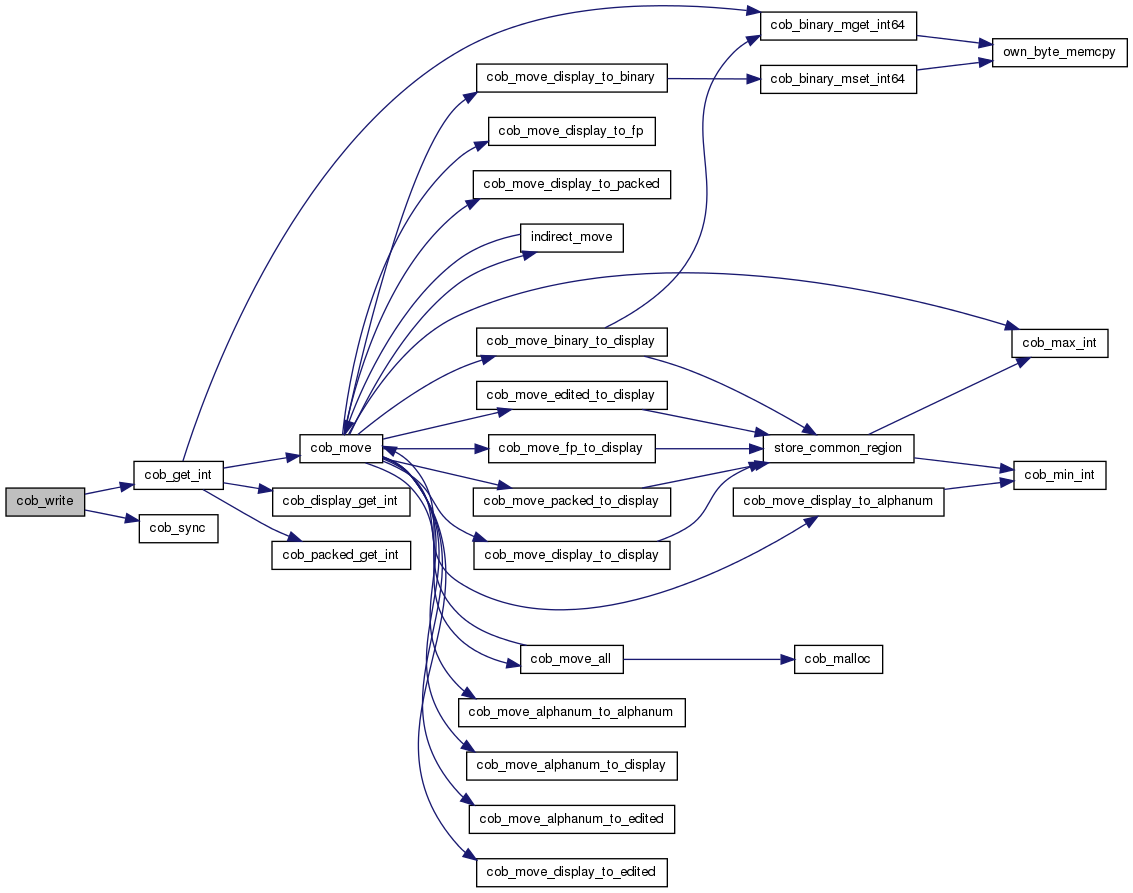

| static int cob_write_block | ( | struct cobsort * | hp, |
| const int | n | ||
| ) | [static] |
Definition at line 5256 of file fileio.c.
{
struct cobitem *q;
FILE *fp = hp->file[hp->destination_file].fp;
while (1) {
q = hp->queue[n].first;
if (q == NULL) {
break;
}
if (unlikely(fwrite (&(q->block_byte), hp->w_size, 1, fp) != 1)) {
return 1;
}
hp->queue[n].first = q->next;
q->next = hp->empty;
hp->empty = q;
}
hp->queue[n].count = 0;
hp->file[hp->destination_file].count++;
if (putc (1, fp) != 1) {
return 1;
}
return 0;
}

Definition at line 768 of file fileio.c.
{
return COB_STATUS_91_NOT_AVAILABLE;
}
| static int dummy_rewrite | ( | cob_file * | f, |
| const int | opt | ||
| ) | [static] |
Definition at line 762 of file fileio.c.
{
return COB_STATUS_91_NOT_AVAILABLE;
}
| static int dummy_rnxt_del | ( | cob_file * | f | ) | [static] |
Definition at line 756 of file fileio.c.
{
return COB_STATUS_91_NOT_AVAILABLE;
}
Definition at line 774 of file fileio.c.
{
return COB_STATUS_91_NOT_AVAILABLE;
}
| static size_t COB_NOINLINE file_linage_check | ( | cob_file * | f | ) | [static] |
Definition at line 716 of file fileio.c.
{
struct linage_struct *lingptr;
lingptr = (struct linage_struct *)(f->linorkeyptr);
lingptr->lin_lines = cob_get_int (lingptr->linage);
if (lingptr->lin_lines < 1) {
goto linerr;
}
if (lingptr->latfoot) {
lingptr->lin_foot = cob_get_int (lingptr->latfoot);
if (lingptr->lin_foot < 1 || lingptr->lin_foot > lingptr->lin_lines) {
goto linerr;
}
} else {
lingptr->lin_foot = 0;
}
if (lingptr->lattop) {
lingptr->lin_top = cob_get_int (lingptr->lattop);
if (lingptr->lin_top < 0) {
goto linerr;
}
} else {
lingptr->lin_top = 0;
}
if (lingptr->latbot) {
lingptr->lin_bot = cob_get_int (lingptr->latbot);
if (lingptr->lin_bot < 0) {
goto linerr;
}
} else {
lingptr->lin_bot = 0;
}
return 0;
linerr:
cob_set_int (lingptr->linage_ctr, 0);
return 1;
}
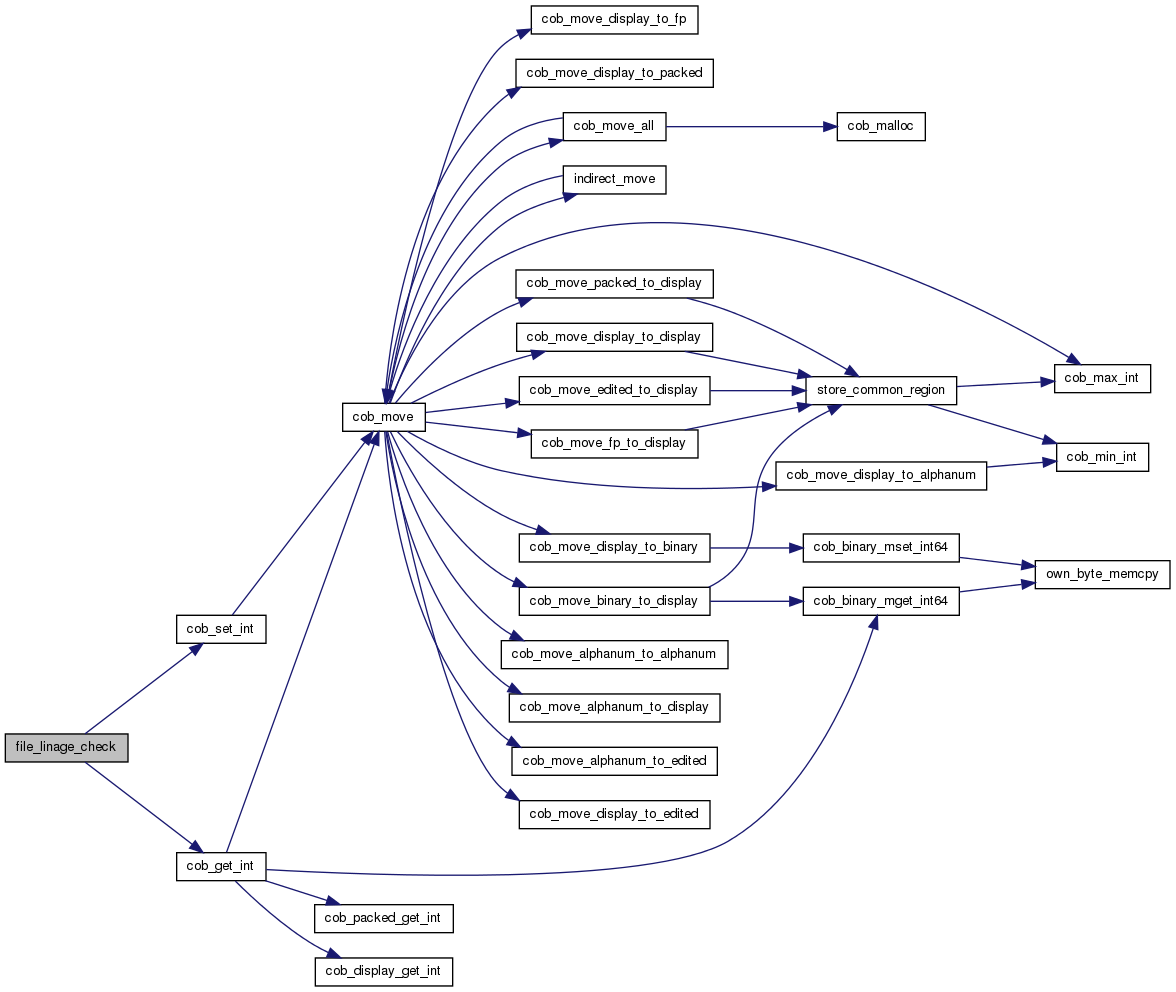

| static unsigned int get_dupno | ( | cob_file * | f, |
| const int | i | ||
| ) | [static] |
Definition at line 3078 of file fileio.c.
{
int ret;
unsigned int dupno = 0;
struct indexed_file *p = f->file;
DBT_SET (p->key, f->keys[i].field);
memcpy (p->temp_key, p->key.data, p->key.size);
#ifdef USE_DB41
p->db[i]->cursor (p->db[i], NULL, &p->cursor[i], 0);
ret = DB_SEQ (p->cursor[i], DB_SET_RANGE);
#else
ret = DB_SEQ (p->db[i], R_CURSOR);
#endif
while (ret == 0 && memcmp (p->key.data, p->temp_key, p->key.size) == 0) {
memcpy (&dupno, (ucharptr)p->data.data + f->keys[0].field->size, sizeof(unsigned int));
#ifdef USE_DB41
ret = DB_SEQ (p->cursor[i], DB_NEXT);
#else
ret = DB_SEQ (p->db[i], R_NEXT);
#endif
}
#ifdef USE_DB41
p->cursor[i]->c_close (p->cursor[i]);
p->cursor[i] = NULL;
#endif
return ++dupno;
}

| static int indexed_close | ( | cob_file * | f, |
| const int | opt | ||
| ) | [static] |
Definition at line 2082 of file fileio.c.
{
#ifdef WITH_INDEX_EXTFH
return extfh_indexed_close (f, opt);
#elif defined(WITH_CISAM) || defined(WITH_DISAM) || defined(WITH_VBISAM)
struct indexfile *fh = f->file;
if (fh == NULL) {
return COB_STATUS_00_SUCCESS;
}
if (fh->isfd >= 0) {
#ifdef WITH_VBISAM
isfullclose (fh->isfd);
#else
isclose (fh->isfd);
#endif
}
freefh (fh);
f->file = NULL;
return COB_STATUS_00_SUCCESS;
#else /* WITH_INDEX_EXTFH */
struct indexed_file *p = f->file;
int i;
/* close DB's */
#ifdef USE_DB41
for (i = 0; i < (int)f->nkeys; i++) {
if (p->cursor[i]) {
p->cursor[i]->c_close (p->cursor[i]);
}
}
#endif
for (i = f->nkeys - 1; i >= 0; i--) {
if (p->db[i]) {
DB_CLOSE (p->db[i]);
}
free (p->last_readkey[i]);
free (p->last_readkey[f->nkeys + i]);
}
if (p->last_key) {
free (p->last_key);
}
free (p->temp_key);
free (p->db);
free (p->last_readkey);
free (p->last_dupno);
free (p->rewrite_sec_key);
#ifdef USE_DB41
free (p->filename);
free (p->cursor);
if (bdb_env != NULL) {
unlock_record (f);
bdb_env->lock_put (bdb_env, &p->bdb_file_lock);
bdb_env->lock_id_free (bdb_env, p->bdb_lock_id);
}
#endif
free (p);
return COB_STATUS_00_SUCCESS;
#endif /* WITH_INDEX_EXTFH */
}

| static int indexed_delete | ( | cob_file * | f | ) | [static] |
Definition at line 3438 of file fileio.c.
{
#ifdef WITH_INDEX_EXTFH
return extfh_indexed_delete (f);
#elif defined(WITH_CISAM) || defined(WITH_DISAM) || defined(WITH_VBISAM)
struct indexfile *fh = f->file;
int ret = COB_STATUS_00_SUCCESS;
if (f->flag_nonexistent) {
return COB_STATUS_30_PERMANENT_ERROR;
}
if (fh->curkey == -1) { /* Switch to prime index */
isstart (fh->isfd, &fh->key[0], fh->key[0].k_leng, (void *)f->record->data, ISEQUAL);
fh->curkey = 0;
fh->readdir = ISNEXT;
} else {
savefileposition (f);
if (fh->curkey != 0) { /* Switch to prime index */
isstart (fh->isfd, &fh->key[0], fh->key[0].k_leng, (void *)f->record->data, ISEQUAL);
}
}
if (isread (fh->isfd, (void *)f->record->data, ISEQUAL | ISLOCK) == -1) {
ret = isretsts (COB_STATUS_21_KEY_INVALID);
} else if (isdelete (fh->isfd, (void *)f->record->data) == -1) {
ret = isretsts (COB_STATUS_49_I_O_DENIED);
}
restorefileposition (f);
return ret;
#else /* WITH_INDEX_EXTFH */
return indexed_delete_internal (f, 0);
#endif /* WITH_INDEX_EXTFH */
}

| static int indexed_delete_internal | ( | cob_file * | f, |
| const int | rewrite | ||
| ) | [static] |
Definition at line 3307 of file fileio.c.
{
size_t i;
size_t offset;
struct indexed_file *p = f->file;
DBT prim_key;
#ifdef USE_DB41
int ret, flags, close_cursor;
if (bdb_env) {
flags = DB_WRITECURSOR;
} else {
flags = 0;
}
if (p->write_cursor_open) {
close_cursor = 0;
} else {
p->db[0]->cursor (p->db[0], NULL, &p->cursor[0], flags);
p->write_cursor_open = 1;
close_cursor = 1;
}
if (bdb_env != NULL) {
unlock_record (f);
}
#endif
/* find the primary key */
#ifdef USE_DB41
if (f->access_mode != COB_ACCESS_SEQUENTIAL) {
DBT_SET (p->key, f->keys[0].field);
}
ret = DB_SEQ (p->cursor[0], DB_SET);
if (ret != 0 && f->access_mode != COB_ACCESS_SEQUENTIAL) {
if (close_cursor) {
p->cursor[0]->c_close (p->cursor[0]);
p->cursor[0] = NULL;
p->write_cursor_open = 0;
}
return COB_STATUS_23_KEY_NOT_EXISTS;
}
if (bdb_env != NULL) {
ret = test_record_lock (f, p->key.data, p->key.size);
if (ret) {
if (close_cursor) {
p->cursor[0]->c_close (p->cursor[0]);
p->cursor[0] = NULL;
p->write_cursor_open = 0;
}
return COB_STATUS_51_RECORD_LOCKED;
}
}
#else
if (f->access_mode != COB_ACCESS_SEQUENTIAL) {
DBT_SET (p->key, f->keys[0].field);
if (DB_GET (p->db[0], 0) != 0) {
return COB_STATUS_23_KEY_NOT_EXISTS;
}
}
#endif
prim_key = p->key;
/* delete the secondary keys */
offset = (char *) p->data.data - (char *) f->record->data;
for (i = 1; i < f->nkeys; i++) {
DBT_SET (p->key, f->keys[i].field);
p->key.data = (char *)p->key.data + offset;
/* rewrite: no delete if secondary key is unchanged */
if (rewrite) {
p->rewrite_sec_key[i] = memcmp (p->key.data, f->keys[i].field->data, p->key.size);
if (!p->rewrite_sec_key[i]) {
continue;
}
}
if (!f->keys[i].flag) {
DB_DEL (p->db[i], &p->key, 0);
} else {
DBT sec_key = p->key;
#ifdef USE_DB41
p->db[i]->cursor (p->db[i], NULL, &p->cursor[i], flags);
if (DB_SEQ (p->cursor[i], DB_SET_RANGE) == 0) {
#else
if (DB_SEQ (p->db[i], R_CURSOR) == 0) {
#endif
while (sec_key.size == p->key.size
&& memcmp (p->key.data, sec_key.data,
sec_key.size) == 0) {
if (memcmp (p->data.data, prim_key.data,
prim_key.size) == 0) {
#ifdef USE_DB41
p->cursor[i]->c_del (p->cursor[i], 0);
#else
DB_DEL (p->db[i], &p->key, R_CURSOR);
#endif
}
#ifdef USE_DB41
if (DB_SEQ (p->cursor[i], DB_NEXT) != 0) {
#else
if (DB_SEQ (p->db[i], R_NEXT) != 0) {
#endif
break;
}
}
}
#ifdef USE_DB41
p->cursor[i]->c_close (p->cursor[i]);
p->cursor[i] = NULL;
#endif
}
}
/* delete the record */
#ifdef USE_DB41
p->cursor[0]->c_del (p->cursor[0], 0);
#else
DB_DEL (p->db[0], &prim_key, 0);
#endif
#ifdef USE_DB41
if (close_cursor) {
p->cursor[0]->c_close (p->cursor[0]);
p->cursor[0] = NULL;
p->write_cursor_open = 0;
}
#endif
return COB_STATUS_00_SUCCESS;
}


| static int indexed_open | ( | cob_file * | f, |
| char * | filename, | ||
| const int | mode, | ||
| const int | sharing | ||
| ) | [static] |
Definition at line 1697 of file fileio.c.
{
#ifdef WITH_INDEX_EXTFH
return extfh_indexed_open (f, filename, mode, sharing);
#elif defined(WITH_CISAM) || defined(WITH_DISAM) || defined(WITH_VBISAM)
struct indexfile *fh;
int ret = COB_STATUS_00_SUCCESS;
int omode = 0;
int lmode = 0;
int vmode = 0;
int dobld = 0;
int isfd = -1;
int k;
struct dictinfo di; /* defined in (c|d|vb)isam.h */
#if defined(ISVARLEN)
if (f->record_min != f->record_max) {
vmode = ISVARLEN;
isreclen = f->record_min;
}
#endif
if (!f->lock_mode) {
if (mode != COB_OPEN_INPUT) {
lmode = ISEXCLLOCK;
} else {
lmode = ISMANULOCK;
}
} else if ((f->lock_mode & COB_LOCK_EXCLUSIVE)) {
lmode = ISEXCLLOCK;
} else if ((f->lock_mode & COB_LOCK_AUTOMATIC) && mode != COB_OPEN_INPUT) {
lmode = ISAUTOLOCK;
} else {
lmode = ISMANULOCK;
}
switch (mode) {
case COB_OPEN_INPUT:
omode = ISINPUT;
break;
case COB_OPEN_OUTPUT:
lmode = ISEXCLLOCK;
omode = ISOUTPUT;
iserrno = 0;
isfd = isopen (filename, ISINPUT | ISEXCLLOCK | vmode);
if (iserrno == EFLOCKED) {
#ifdef WITH_VBISAM
isfullclose (isfd);
#else
isclose (isfd);
#endif
return COB_STATUS_61_FILE_SHARING;
} else {
if (isfd >= 0) {
#ifdef WITH_VBISAM
isfullclose (isfd);
#else
isclose (isfd);
#endif
}
iserase (filename);
}
iserrno = 0;
dobld = 1;
break;
case COB_OPEN_I_O:
omode = ISINOUT;
break;
case COB_OPEN_EXTEND:
lmode = ISEXCLLOCK;
omode = ISINOUT;
break;
case COB_OPEN_LOCKED:
lmode = ISEXCLLOCK;
omode = ISINOUT;
break;
}
fh = cob_malloc (sizeof(struct indexfile) + ((sizeof (struct keydesc)) * (f->nkeys + 1)));
/* Copy index information */
for (k = 0; k < f->nkeys; k++) {
memset (&fh->key[k], 0, sizeof(struct keydesc));
fh->key[k].k_flags = f->keys[k].flag ? ISDUPS : ISNODUPS;
fh->key[k].k_nparts = 1; /* Single field key */
fh->key[k].k_start = f->keys[k].offset;
fh->key[k].k_leng = f->keys[k].field->size;
if (fh->lenkey < fh->key[k].k_leng) {
fh->lenkey = fh->key[k].k_leng;
}
fh->key[k].k_type = CHARTYPE;
}
iserrno = 0;
fh->lmode = 0;
if (dobld) {
dobuild:
isfd = isbuild (filename, f->record_max, &fh->key[0], ISINOUT | ISEXCLLOCK | vmode);
} else {
if (lmode == ISAUTOLOCK) {
fh->lmode = ISLOCK;
lmode = ISMANULOCK;
}
isfd = isopen (filename, omode | lmode | vmode);
if (isfd == -1) {
if (f->flag_optional) {
if (mode == COB_OPEN_EXTEND || mode == COB_OPEN_I_O) {
dobld = 1;
ret = COB_STATUS_05_SUCCESS_OPTIONAL;
goto dobuild;
}
f->file = fh;
f->open_mode = mode;
fh->isfd = isfd;
fh->filename = strdup (filename);
/* Active index is unknown at this time */
fh->curkey = -1;
f->flag_end_of_file = 1;
f->flag_begin_of_file = 1;
if (f->flag_nonexistent) {
return COB_STATUS_00_SUCCESS;
}
f->flag_nonexistent = 1;
return COB_STATUS_05_SUCCESS_OPTIONAL;
}
} else {
memset(&di, 0, sizeof(di));
isindexinfo (isfd, (void *)&di, 0);
fh->nkeys = di.di_nkeys & 0x7F; /* Mask off ISVARLEN */
if (fh->nkeys > f->nkeys) {
fh = realloc (fh, sizeof(struct indexfile) + ((sizeof (struct keydesc)) * (fh->nkeys + 1)));
}
for (k = 0; k < fh->nkeys; k++) {
memset (&fh->key[k], 0, sizeof(struct keydesc));
isindexinfo (isfd, &fh->key[k], k+1);
if (fh->lenkey < fh->key[k].k_leng) {
fh->lenkey = fh->key[k].k_leng;
}
/* Verify that COBOL definition matches the real ISAM file */
if (f->keys[k].flag) {
if (!(fh->key[k].k_flags & ISDUPS)) {
ret = COB_STATUS_39_CONFLICT_ATTRIBUTE;
}
} else {
if (fh->key[k].k_flags & ISDUPS) {
ret = COB_STATUS_39_CONFLICT_ATTRIBUTE;
}
}
if (fh->key[k].k_nparts != 1
|| fh->key[k].k_start != f->keys[k].offset
|| fh->key[k].k_leng != f->keys[k].field->size) {
ret = COB_STATUS_39_CONFLICT_ATTRIBUTE;
}
}
}
}
if (isfd == -1) {
ret = isretsts (COB_STATUS_35_NOT_EXISTS);
freefh (fh);
return ret;
}
if (ret > 9) {
#ifdef WITH_VBISAM
isfullclose (isfd);
#else
isclose (isfd);
#endif
freefh (fh);
return ret;
}
if (dobld) {
for (k = 1; k < f->nkeys; k++) {
iserrno = 0;
if (isaddindex (isfd, &fh->key[k]) == -1) {
ret = COB_STATUS_39_CONFLICT_ATTRIBUTE;
}
}
if (ret > 9) {
#ifdef WITH_VBISAM
isfullclose (isfd);
#else
isclose (isfd);
#endif
iserase (filename);
freefh (fh);
return ret;
}
}
f->file = fh;
f->open_mode = mode;
fh->isfd = isfd;
fh->filename = strdup (filename);
fh->savekey = cob_malloc (fh->lenkey + 1);
fh->recwrk = cob_malloc (f->record_max + 1);
fh->curkey = -1; /* Active index is unknown at this time */
f->flag_nonexistent = 0;
f->flag_end_of_file = 0;
f->flag_begin_of_file = 0;
return ret;
#else /* WITH_INDEX_EXTFH */
size_t i, j;
#ifdef USE_DB41
int flags = 0;
int lock_mode;
int handle_created;
#else
int flags = INITIAL_FLAGS;
BTREEINFO info;
#endif
int ret = 0;
struct indexed_file *p;
size_t maxsize;
p = cob_malloc (sizeof (struct indexed_file));
#ifdef USE_DB41
if (bdb_env != NULL) {
if (mode == COB_OPEN_OUTPUT || mode == COB_OPEN_EXTEND ||
(f->lock_mode & COB_LOCK_EXCLUSIVE) ||
(mode == COB_OPEN_I_O && !f->lock_mode)) {
lock_mode = DB_LOCK_WRITE;
} else {
lock_mode = DB_LOCK_READ;
}
p->key.size = (cob_dbtsize_t) strlen (filename);
p->key.data = filename;
ret = bdb_env->lock_get (bdb_env, bdb_lock_id, DB_LOCK_NOWAIT,
&p->key, lock_mode, &p->bdb_file_lock);
if (ret) {
free (p);
if (ret == DB_LOCK_NOTGRANTED) {
ret = COB_STATUS_61_FILE_SHARING;
}
return ret;
}
}
#endif
switch (mode) {
case COB_OPEN_INPUT:
#ifdef USE_DB41
flags |= DB_RDONLY;
#else
flags |= O_RDONLY;
#endif
break;
case COB_OPEN_OUTPUT:
#ifdef USE_DB41
flags |= DB_CREATE;
#else
flags |= O_RDWR | O_CREAT | O_TRUNC;
#endif
break;
case COB_OPEN_I_O:
case COB_OPEN_EXTEND:
#ifdef USE_DB41
flags |= DB_CREATE;
#else
flags |= O_RDWR | O_CREAT;
#endif
break;
}
p->db = cob_malloc (sizeof (DB *) * f->nkeys);
#ifdef USE_DB41
p->cursor = cob_malloc (sizeof (DBC *) * f->nkeys);
p->filenamelen = (int) strlen (filename);
#endif
p->last_readkey = cob_malloc (sizeof (unsigned char *) * 2 * f->nkeys);
p->last_dupno = cob_malloc (sizeof (unsigned int) * f->nkeys);
p->rewrite_sec_key = cob_malloc (sizeof (int) * f->nkeys);
maxsize = 0;
for (i = 0; i < f->nkeys; i++) {
if (f->keys[i].field->size > maxsize) {
maxsize = f->keys[i].field->size;
}
}
for (i = 0; i < f->nkeys; i++) {
/* file name */
memset (runtime_buffer, 0, COB_SMALL_BUFF);
if (i == 0) {
strncpy (runtime_buffer, filename, COB_SMALL_MAX);
} else {
snprintf (runtime_buffer, COB_SMALL_MAX, "%s.%d",
filename, (int)i);
}
/* btree info */
#ifdef USE_DB41
ret = db_create (&p->db[i], bdb_env, 0);
if (!ret) {
handle_created = 1;
if (mode == COB_OPEN_OUTPUT) {
if (bdb_env) {
bdb_env->dbremove (bdb_env, NULL, runtime_buffer, NULL, 0);
} else {
p->db[i]->remove (p->db[i], runtime_buffer, NULL, 0);
ret = db_create (&p->db[i], bdb_env, 0);
}
}
if (!ret) {
if (f->keys[i].flag) {
p->db[i]->set_flags (p->db[i], DB_DUP);
}
}
} else {
handle_created = 0;
}
#else
memset ((unsigned char *)&info, 0, sizeof (info));
if (f->keys[i].flag) {
info.flags = R_DUP;
}
#endif
/* open db */
#ifdef USE_DB41
if (!ret) {
ret = p->db[i]->open (p->db[i], NULL, runtime_buffer, NULL,
DB_BTREE, flags, COB_FILE_MODE);
}
#else
p->db[i] = dbopen (runtime_buffer, flags, COB_FILE_MODE, DB_BTREE, &info);
if (p->db[i] == 0) {
ret = errno;
}
#endif
if (ret) {
for (j = 0; j < i; j++) {
DB_CLOSE (p->db[j]);
}
#ifdef USE_DB41
if (handle_created) {
DB_CLOSE (p->db[i]);
}
#endif
free (p->db);
free (p->last_readkey);
free (p->last_dupno);
#ifdef USE_DB41
free (p->cursor);
if (bdb_env != NULL) {
bdb_env->lock_put (bdb_env, &p->bdb_file_lock);
}
#endif
free (p);
return ret;
}
p->last_readkey[i] = cob_malloc (maxsize);
p->last_readkey[f->nkeys + i] = cob_malloc (maxsize);
}
p->temp_key = cob_malloc (maxsize + sizeof(unsigned int));
f->file = p;
p->key_index = 0;
p->last_key = NULL;
memset ((unsigned char *)&p->key, 0, sizeof (DBT));
memset ((unsigned char *)&p->data, 0, sizeof (DBT));
#ifdef USE_DB41
p->filename = cob_malloc (strlen (filename) + 1);
strcpy (p->filename, filename);
p->write_cursor_open = 0;
p->record_locked = 0;
if (bdb_env != NULL) {
bdb_env->lock_id (bdb_env, &p->bdb_lock_id);
}
DBT_SET (p->key, f->keys[0].field);
p->db[0]->cursor (p->db[0], NULL, &p->cursor[0], 0);
ret = DB_SEQ (p->cursor[0], DB_FIRST);
p->cursor[0]->c_close (p->cursor[0]);
p->cursor[0] = NULL;
#else
ret = DB_SEQ (p->db[p->key_index], R_FIRST);
#endif
if (!ret) {
memcpy (p->last_readkey[0], p->key.data, p->key.size);
} else {
p->data.data = NULL;
}
return 0;
#endif /* WITH_INDEX_EXTFH */
}

Definition at line 2412 of file fileio.c.
{
#ifdef WITH_INDEX_EXTFH
return extfh_indexed_read (f, key, read_opts);
#elif defined(WITH_CISAM) || defined(WITH_DISAM) || defined(WITH_VBISAM)
struct indexfile *fh = f->file;
int k;
int ret = COB_STATUS_00_SUCCESS;
int lmode = 0;
fh->eofpending = 0;
fh->startiscur = 0;
fh->wrkhasrec = 0;
if (f->flag_nonexistent) {
return COB_STATUS_23_KEY_NOT_EXISTS;
}
for (k = 0; k < f->nkeys; k++) {
if (f->keys[k].field->data == key->data) {
break;
}
}
if (fh->curkey != k) { /* Switch to this index */
isstart (fh->isfd, &fh->key[k], fh->key[0].k_leng, (void *)f->record->data, ISEQUAL);
fh->curkey = k;
fh->wrkhasrec = 0;
if (fh->key[k].k_flags & ISDUPS) {
fh->keyhasdups = 1;
} else {
fh->keyhasdups = 0;
}
}
fh->startcond = -1;
if (read_opts & COB_READ_LOCK) {
lmode = ISLOCK;
} else if (read_opts & COB_READ_WAIT_LOCK) {
lmode = ISLCKW;
} else if ((f->lock_mode & COB_LOCK_AUTOMATIC)) {
if (f->open_mode != COB_OPEN_INPUT) {
if (!(read_opts & COB_READ_IGNORE_LOCK)) {
lmode = ISLOCK;
}
}
}
#ifdef ISSKIPLOCK
if (read_opts & COB_READ_IGNORE_LOCK) {
lmode = ISSKIPLOCK;
}
#endif
iserrno = 0;
if ((fh->lmode & ISLOCK) && !(f->lock_mode & COB_LOCK_MULTIPLE)) {
isrelease (fh->isfd);
}
switch (read_opts & 0x0F) {
case COB_READ_NEXT:
fh->readdir = ISNEXT;
if (isread (fh->isfd, (void *)f->record->data, ISNEXT | lmode) == -1) {
ret = isretsts (COB_STATUS_10_END_OF_FILE);
f->flag_end_of_file = 1;
}
break;
case COB_READ_PREVIOUS:
fh->readdir = ISPREV;
if (isread (fh->isfd, (void *)f->record->data, ISPREV | lmode) == -1) {
ret = isretsts (COB_STATUS_10_END_OF_FILE);
f->flag_begin_of_file = 1;
}
break;
case COB_READ_FIRST:
fh->readdir = ISNEXT;
if (isread (fh->isfd, (void *)f->record->data, ISFIRST | lmode) == -1) {
ret = isretsts (COB_STATUS_10_END_OF_FILE);
}
break;
case COB_READ_LAST:
fh->readdir = ISPREV;
if (isread (fh->isfd, (void *)f->record->data, ISLAST | lmode) == -1) {
ret = isretsts (COB_STATUS_10_END_OF_FILE);
}
break;
default:
fh->readdir = -1;
if (isread (fh->isfd, (void *)f->record->data, ISEQUAL | lmode) == -1) {
ret = isretsts (COB_STATUS_21_KEY_INVALID);
}
break;
}
if (ret == 0) {
f->flag_first_read = 0;
f->flag_read_done = 1;
fh->readdone = 1;
f->flag_end_of_file = 0;
f->flag_begin_of_file = 0;
memcpy (fh->savekey, f->record->data + fh->key[0].k_start, fh->key[0].k_leng);
fh->recnum = isrecnum;
#if defined(ISVARLEN)
if (f->record_min != f->record_max) {
f->record->size = isreclen;
}
#endif
} else {
memset (fh->savekey, 0, fh->key[0].k_leng);
fh->recnum = 0;
fh->readdone = 0;
}
return ret;
#else /* WITH_INDEX_EXTFH */
struct indexed_file *p = f->file;
int ret;
int test_lock = 0;
#ifdef USE_DB41
if (bdb_env != NULL) {
unlock_record (f);
test_lock = 1;
}
#endif
ret = indexed_start_internal (f, COB_EQ, key, read_opts, test_lock);
if (ret != COB_STATUS_00_SUCCESS) {
return ret;
}
f->record->size = p->data.size;
memcpy (f->record->data, p->data.data, p->data.size);
return COB_STATUS_00_SUCCESS;
#endif /* WITH_INDEX_EXTFH */
}

| static int indexed_read_next | ( | cob_file * | f, |
| const int | read_opts | ||
| ) | [static] |
Definition at line 2544 of file fileio.c.
{
#ifdef WITH_INDEX_EXTFH
return extfh_indexed_read_next (f, read_opts);
#elif defined(WITH_CISAM) || defined(WITH_DISAM) || defined(WITH_VBISAM)
struct indexfile *fh = f->file;
int ret = COB_STATUS_00_SUCCESS;
int lmode = 0;
int domoveback;
if (f->flag_nonexistent) {
if (f->flag_first_read == 0) {
return COB_STATUS_23_KEY_NOT_EXISTS;
}
f->flag_first_read = 0;
return COB_STATUS_10_END_OF_FILE;
}
if (fh->curkey == -1) { /* Switch to this index */
isstart (fh->isfd, &fh->key[0], 0, (void *)f->record->data, ISFIRST);
fh->curkey = 0;
fh->readdir = ISNEXT;
fh->startcond = -1;
fh->startiscur = 0;
fh->wrkhasrec = 0;
fh->keyhasdups = 0;
}
if (read_opts & COB_READ_LOCK) {
lmode = ISLOCK;
} else if (read_opts & COB_READ_WAIT_LOCK) {
lmode = ISLCKW;
} else if ((f->lock_mode & COB_LOCK_AUTOMATIC) && f->open_mode != COB_OPEN_INPUT) {
if (!(read_opts & COB_READ_IGNORE_LOCK)) {
lmode = ISLOCK;
}
}
#ifdef ISSKIPLOCK
if (read_opts & COB_READ_IGNORE_LOCK) {
lmode |= ISSKIPLOCK;
}
#endif
if ((fh->lmode & ISLOCK) && !(f->lock_mode & COB_LOCK_MULTIPLE)) {
isrelease (fh->isfd);
}
iserrno = 0;
switch (read_opts & 0x0F) {
case COB_READ_NEXT:
fh->readdir = ISNEXT;
if (fh->eofpending == ISNEXT) {
fh->eofpending = 0;
fh->wrkhasrec = 0;
return COB_STATUS_10_END_OF_FILE;
}
if (fh->startiscur) {
if (isread (fh->isfd, (void *)f->record->data, ISCURR) == -1) {
ret = isretsts (COB_STATUS_10_END_OF_FILE);
} else {
switch (fh->startcond) {
case COB_GE:
domoveback = 0;
while (iserrno == 0
&& memcmp (f->record->data + fh->key[fh->curkey].k_start, fh->savekey, fh->key[fh->curkey].k_leng) == 0) {
isread (fh->isfd, (void *)f->record->data, ISPREV);
domoveback = 1;
}
if (domoveback) {
isread (fh->isfd, (void *)f->record->data, iserrno == 0 ? ISNEXT : ISFIRST);
}
break;
case COB_LE:
domoveback = 0;
while (iserrno == 0
&& memcmp (f->record->data + fh->key[fh->curkey].k_start, fh->savekey, fh->key[fh->curkey].k_leng) == 0) {
isread (fh->isfd, (void *)f->record->data, ISNEXT);
domoveback = 1;
}
if (domoveback) {
isread (fh->isfd, (void *)f->record->data, iserrno == 0 ? ISPREV : ISLAST);
}
break;
case COB_LT:
while (iserrno == 0
&& memcmp (f->record->data + fh->key[fh->curkey].k_start, fh->savekey, fh->key[fh->curkey].k_leng) >= 0) {
isread (fh->isfd, (void *)f->record->data, ISPREV);
}
break;
case COB_GT:
while (iserrno == 0
&& memcmp (f->record->data + fh->key[fh->curkey].k_start, fh->savekey, fh->key[fh->curkey].k_leng)<=0) {
isread (fh->isfd, (void *)f->record->data, ISNEXT);
}
break;
}
if (isread (fh->isfd, (void *)f->record->data, ISCURR | lmode) == -1) {
ret = isretsts (COB_STATUS_10_END_OF_FILE);
}
}
fh->startcond = -1;
fh->startiscur = 0;
} else if (fh->wrkhasrec == ISNEXT) {
memcpy (f->record->data, fh->recwrk, f->record_max);
if (fh->lmode & ISLOCK) {
/* now lock 'peek ahead' record */
if (isread (fh->isfd, (void *)f->record->data,
ISCURR | fh->lmode) == -1) {
ret = isretsts (COB_STATUS_10_END_OF_FILE);
}
}
} else {
if (fh->wrkhasrec == ISPREV) {
isread (fh->isfd, (void *)f->record->data, ISNEXT);
fh->wrkhasrec = 0;
}
if (isread (fh->isfd, (void *)f->record->data, ISNEXT | lmode) == -1) {
ret = isretsts (COB_STATUS_10_END_OF_FILE);
}
}
break;
case COB_READ_PREVIOUS:
fh->readdir = ISPREV;
if (fh->eofpending == ISPREV) {
fh->eofpending = 0;
fh->wrkhasrec = 0;
return COB_STATUS_10_END_OF_FILE;
}
if (fh->startiscur) {
if (isread (fh->isfd, (void *)f->record->data, ISCURR | lmode) == -1) {
ret = isretsts (COB_STATUS_10_END_OF_FILE);
} else {
switch (fh->startcond) {
case COB_LE:
domoveback = 0;
while (iserrno == 0
&& memcmp (f->record->data + fh->key[fh->curkey].k_start, fh->savekey, fh->key[fh->curkey].k_leng) == 0) {
isread (fh->isfd, (void *)f->record->data, ISNEXT);
domoveback = 1;
}
if (domoveback) {
isread (fh->isfd, (void *)f->record->data, ISPREV);
}
break;
case COB_LT:
while (iserrno == 0
&& memcmp (f->record->data + fh->key[fh->curkey].k_start, fh->savekey, fh->key[fh->curkey].k_leng) >= 0) {
isread (fh->isfd, (void *)f->record->data, ISPREV);
}
break;
case COB_GT:
while (iserrno == 0
&& memcmp (f->record->data + fh->key[fh->curkey].k_start, fh->savekey, fh->key[fh->curkey].k_leng) <= 0) {
isread (fh->isfd, (void *)f->record->data, ISNEXT);
}
break;
case COB_GE:
while (iserrno == 0
&& memcmp (f->record->data + fh->key[fh->curkey].k_start, fh->savekey, fh->key[fh->curkey].k_leng) < 0) {
isread (fh->isfd, (void *)f->record->data, ISNEXT);
}
break;
}
if (isread (fh->isfd, (void *)f->record->data, ISCURR | lmode) == -1) {
ret = isretsts (COB_STATUS_10_END_OF_FILE);
}
}
fh->startcond = -1;
fh->startiscur = 0;
} else if (fh->wrkhasrec == ISPREV) {
memcpy (f->record->data, fh->recwrk, f->record_max);
if (fh->lmode & ISLOCK) {
/* now lock 'peek ahead' record */
if (isread (fh->isfd, (void *)f->record->data,
ISCURR | fh->lmode) == -1) {
ret = isretsts (COB_STATUS_10_END_OF_FILE);
}
}
} else {
if (fh->wrkhasrec == ISNEXT) {
isread (fh->isfd, (void *)f->record->data, ISPREV);
fh->wrkhasrec = 0;
}
if (isread (fh->isfd, (void *)f->record->data, ISPREV | lmode) == -1) {
ret = isretsts (COB_STATUS_10_END_OF_FILE);
}
}
break;
case COB_READ_FIRST:
fh->readdir = ISNEXT;
if (isread (fh->isfd, (void *)f->record->data, ISFIRST | lmode) == -1) {
ret = isretsts (COB_STATUS_10_END_OF_FILE);
}
break;
case COB_READ_LAST:
fh->readdir = ISPREV;
if (isread (fh->isfd, (void *)f->record->data, ISLAST | lmode) == -1) {
ret = isretsts (COB_STATUS_10_END_OF_FILE);
}
break;
default:
fh->readdir = ISNEXT;
if (isread (fh->isfd, (void *)f->record->data, ISNEXT | lmode) == -1) {
ret = isretsts (COB_STATUS_10_END_OF_FILE);
}
break;
}
if (ret == 0) {
fh->eofpending = 0;
f->flag_first_read = 0;
f->flag_read_done = 1;
fh->readdone = 1;
f->flag_end_of_file = 0;
f->flag_begin_of_file = 0;
memcpy (fh->savekey, f->record->data + fh->key[0].k_start, fh->key[0].k_leng);
fh->recnum = isrecnum;
#if defined(ISVARLEN)
if (f->record_min != f->record_max) {
f->record->size = isreclen;
}
#endif
#if defined(WITH_COBSTATUS02)
if (fh->keyhasdups) {
if (isread (fh->isfd, (void *)fh->recwrk, fh->readdir) == -1) {
fh->eofpending = fh->readdir;
fh->wrkhasrec = 0;
fh->saverecnum = -1;
} else {
fh->wrkhasrec = fh->readdir;
fh->saverecnum = isrecnum;
if (memcmp (f->record->data + fh->key[fh->curkey].k_start,
fh->recwrk + fh->key[fh->curkey].k_start,
fh->key[fh->curkey].k_leng) == 0) {
ret = COB_STATUS_02_SUCCESS_DUPLICATE;
}
}
}
#elif defined(WITH_DISAM)
if((isstat1 == '0') && (isstat2 == '2')) {
ret = COB_STATUS_02_SUCCESS_DUPLICATE;
}
#endif
} else {
memset (fh->savekey, 0, fh->key[0].k_leng);
fh->recnum = 0;
fh->readdone = 0;
fh->wrkhasrec = 0;
}
return ret;
#else /* WITH_INDEX_EXTFH */
struct indexed_file *p = f->file;
int ret;
int read_nextprev;
int nextprev = DB_NEXT;
int file_changed = 0;
unsigned int dupno;
#ifdef USE_DB41
if (bdb_env != NULL) {
unlock_record (f);
}
#endif
if (unlikely(read_opts & COB_READ_PREVIOUS)) {
if (f->flag_end_of_file) {
nextprev = DB_LAST;
} else {
nextprev = DB_PREV;
}
} else if (f->flag_begin_of_file) {
nextprev = DB_FIRST;
}
#ifdef USE_DB41
/* the open cursor makes this function atomic */
if (p->key_index != 0) {
p->db[0]->cursor (p->db[0], NULL, &p->cursor[0], 0);
}
p->db[p->key_index]->cursor (p->db[p->key_index], NULL, &p->cursor[p->key_index], 0);
#endif
if (f->flag_first_read) {
/* data is read in indexed_open or indexed_start */
if (p->data.data == NULL || (f->flag_first_read == 2 &&
nextprev == DB_PREV)) {
#ifdef USE_DB41
p->cursor[p->key_index]->c_close (p->cursor[p->key_index]);
p->cursor[p->key_index] = NULL;
if (p->key_index != 0) {
p->cursor[0]->c_close (p->cursor[0]);
p->cursor[0] = NULL;
}
#endif
return COB_STATUS_10_END_OF_FILE;
}
/* check if previously read data still exists */
p->key.size = (cob_dbtsize_t) f->keys[p->key_index].field->size;
p->key.data = p->last_readkey[p->key_index];
#ifdef USE_DB41
ret = DB_SEQ (p->cursor[p->key_index], DB_SET);
#else
ret = DB_GET (p->db[p->key_index], 0);
#endif
if (!ret && p->key_index > 0) {
if (f->keys[p->key_index].flag) {
memcpy (&dupno, (ucharptr)p->data.data + f->keys[0].field->size, sizeof(unsigned int));
while (ret == 0 &&
memcmp (p->key.data, p->last_readkey[p->key_index], p->key.size) == 0 &&
dupno < p->last_dupno[p->key_index]) {
#ifdef USE_DB41
ret = DB_SEQ (p->cursor[p->key_index], DB_NEXT);
#else
ret = DB_SEQ (p->db[p->key_index], R_NEXT);
#endif
memcpy (&dupno, (ucharptr)p->data.data + f->keys[0].field->size, sizeof(unsigned int));
}
if (ret == 0 &&
memcmp (p->key.data, p->last_readkey[p->key_index], p->key.size) == 0 &&
dupno == p->last_dupno[p->key_index]) {
ret = memcmp (p->last_readkey[p->key_index + f->nkeys], p->data.data, f->keys[0].field->size);
} else {
ret = 1;
}
} else {
ret = memcmp (p->last_readkey[p->key_index + f->nkeys], p->data.data, f->keys[0].field->size);
}
if (!ret) {
p->key.size = (cob_dbtsize_t) f->keys[0].field->size;
p->key.data = p->last_readkey[p->key_index + f->nkeys];
ret = DB_GET (p->db[0], 0);
}
}
file_changed = ret;
#ifdef USE_DB41
if (bdb_env != NULL && !file_changed) {
if (!(read_opts & COB_READ_IGNORE_LOCK)) {
ret = test_record_lock (f, p->key.data, p->key.size);
if (ret) {
p->cursor[p->key_index]->c_close (p->cursor[p->key_index]);
p->cursor[p->key_index] = NULL;
if (p->key_index != 0) {
p->cursor[0]->c_close (p->cursor[0]);
p->cursor[0] = NULL;
}
return COB_STATUS_51_RECORD_LOCKED;
}
}
if (read_opts & COB_READ_LOCK) {
ret = lock_record (f, p->key.data, p->key.size);
if (ret) {
p->cursor[p->key_index]->c_close (p->cursor[p->key_index]);
p->cursor[p->key_index] = NULL;
if (p->key_index != 0) {
p->cursor[0]->c_close (p->cursor[0]);
p->cursor[0] = NULL;
}
return COB_STATUS_51_RECORD_LOCKED;
}
}
}
#endif
}
if (!f->flag_first_read || file_changed) {
if (nextprev == DB_FIRST || nextprev == DB_LAST) {
read_nextprev = 1;
} else {
p->key.size = (cob_dbtsize_t) f->keys[p->key_index].field->size;
p->key.data = p->last_readkey[p->key_index];
#ifdef USE_DB41
ret = DB_SEQ (p->cursor[p->key_index], DB_SET_RANGE);
#else
ret = DB_SEQ (p->db[p->key_index], R_CURSOR);
#endif
/* ret != 0 possible, records may be deleted since last read */
if (ret != 0) {
if (nextprev == DB_PREV) {
nextprev = DB_LAST;
read_nextprev = 1;
} else {
#ifdef USE_DB41
p->cursor[p->key_index]->c_close (p->cursor[p->key_index]);
p->cursor[p->key_index] = NULL;
if (p->key_index != 0) {
p->cursor[0]->c_close (p->cursor[0]);
p->cursor[0] = NULL;
}
#endif
return COB_STATUS_10_END_OF_FILE;
}
} else {
if (memcmp (p->key.data, p->last_readkey[p->key_index], p->key.size) == 0) {
if (p->key_index > 0 && f->keys[p->key_index].flag) {
memcpy (&dupno, (ucharptr)p->data.data + f->keys[0].field->size, sizeof(unsigned int));
while (ret == 0 &&
memcmp (p->key.data, p->last_readkey[p->key_index], p->key.size) == 0 &&
dupno < p->last_dupno[p->key_index]) {
#ifdef USE_DB41
ret = DB_SEQ (p->cursor[p->key_index], DB_NEXT);
#else
ret = DB_SEQ (p->db[p->key_index], R_NEXT);
#endif
memcpy (&dupno, (ucharptr)p->data.data + f->keys[0].field->size, sizeof(unsigned int));
}
if (ret != 0) {
if (nextprev == DB_PREV) {
nextprev = DB_LAST;
read_nextprev = 1;
} else {
#ifdef USE_DB41
p->cursor[p->key_index]->c_close (p->cursor[p->key_index]);
p->cursor[p->key_index] = NULL;
if (p->key_index != 0) {
p->cursor[0]->c_close (p->cursor[0]);
p->cursor[0] = NULL;
}
#endif
return COB_STATUS_10_END_OF_FILE;
}
} else {
if (memcmp (p->key.data, p->last_readkey[p->key_index], p->key.size) == 0 &&
dupno == p->last_dupno[p->key_index]) {
read_nextprev = 1;
} else {
if (nextprev == DB_PREV) {
read_nextprev = 1;
} else {
read_nextprev = 0;
}
}
}
} else {
read_nextprev = 1;
}
} else {
if (nextprev == DB_PREV) {
read_nextprev = 1;
} else {
read_nextprev = 0;
}
}
}
}
if (read_nextprev) {
#ifdef USE_DB41
ret = DB_SEQ (p->cursor[p->key_index], nextprev);
#else
ret = DB_SEQ (p->db[p->key_index], nextprev);
#endif
if (ret != 0) {
#ifdef USE_DB41
p->cursor[p->key_index]->c_close (p->cursor[p->key_index]);
p->cursor[p->key_index] = NULL;
if (p->key_index != 0) {
p->cursor[0]->c_close (p->cursor[0]);
p->cursor[0] = NULL;
}
#endif
return COB_STATUS_10_END_OF_FILE;
}
}
if (p->key_index > 0) {
/* temporarily save alternate key */
memcpy (p->temp_key, p->key.data, p->key.size);
if (f->keys[p->key_index].flag) {
memcpy (&dupno, (ucharptr)p->data.data + f->keys[0].field->size, sizeof(unsigned int));
}
p->key.data = p->data.data;
p->key.size = f->keys[0].field->size;
if (DB_GET (p->db[0], 0) != 0) {
#ifdef USE_DB41
p->cursor[p->key_index]->c_close (p->cursor[p->key_index]);
p->cursor[p->key_index] = NULL;
p->cursor[0]->c_close (p->cursor[0]);
p->cursor[0] = NULL;
#endif
return COB_STATUS_23_KEY_NOT_EXISTS;
}
}
#ifdef USE_DB41
if (bdb_env != NULL) {
if (!(read_opts & COB_READ_IGNORE_LOCK)) {
ret = test_record_lock (f, p->key.data, p->key.size);
if (ret) {
p->cursor[p->key_index]->c_close (p->cursor[p->key_index]);
p->cursor[p->key_index] = NULL;
if (p->key_index != 0) {
p->cursor[0]->c_close (p->cursor[0]);
p->cursor[0] = NULL;
}
return COB_STATUS_51_RECORD_LOCKED;
}
}
if (read_opts & COB_READ_LOCK) {
ret = lock_record (f, p->key.data, p->key.size);
if (ret) {
p->cursor[p->key_index]->c_close (p->cursor[p->key_index]);
p->cursor[p->key_index] = NULL;
if (p->key_index != 0) {
p->cursor[0]->c_close (p->cursor[0]);
p->cursor[0] = NULL;
}
return COB_STATUS_51_RECORD_LOCKED;
}
}
}
#endif
if (p->key_index == 0) {
memcpy (p->last_readkey[0], p->key.data, p->key.size);
} else {
memcpy (p->last_readkey[p->key_index], p->temp_key,
f->keys[p->key_index].field->size);
memcpy (p->last_readkey[p->key_index + f->nkeys], p->key.data, f->keys[0].field->size);
if (f->keys[p->key_index].flag) {
p->last_dupno[p->key_index] = dupno;
}
}
}
#ifdef USE_DB41
p->cursor[p->key_index]->c_close (p->cursor[p->key_index]);
p->cursor[p->key_index] = NULL;
if (p->key_index != 0) {
p->cursor[0]->c_close (p->cursor[0]);
p->cursor[0] = NULL;
}
#endif
f->record->size = p->data.size;
memcpy (f->record->data, p->data.data, p->data.size);
return COB_STATUS_00_SUCCESS;
#endif /* WITH_INDEX_EXTFH */
}

| static int indexed_rewrite | ( | cob_file * | f, |
| const int | opt | ||
| ) | [static] |
Definition at line 3474 of file fileio.c.
{
#ifdef WITH_INDEX_EXTFH
return extfh_indexed_rewrite (f, opt);
#elif defined(WITH_CISAM) || defined(WITH_DISAM) || defined(WITH_VBISAM)
struct indexfile *fh = f->file;
int ret = COB_STATUS_00_SUCCESS;
int k;
if (f->flag_nonexistent) {
return COB_STATUS_30_PERMANENT_ERROR;
}
if (f->access_mode == COB_ACCESS_SEQUENTIAL
&& memcmp (fh->savekey, f->record->data + fh->key[0].k_start, fh->key[0].k_leng) != 0) {
return COB_STATUS_21_KEY_INVALID;
}
if (fh->curkey >= 0) { /* Index is active */
/* Save record data */
memcpy (fh->recwrk, f->record->data, f->record_max);
savefileposition (f);
memcpy (fh->recwrk, f->record->data, f->record_max);
if (fh->curkey != 0) { /* Activate Prime index */
isstart (fh->isfd, &fh->key[0], 0, (void *)fh->recwrk, ISEQUAL);
}
/* Verify record exists */
if (isread (fh->isfd, fh->recwrk, ISEQUAL) == -1) {
restorefileposition (f);
return COB_STATUS_21_KEY_INVALID;
}
for (k = 1; k < f->nkeys && ret == COB_STATUS_00_SUCCESS; k++) {
if (fh->key[k].k_flags & ISDUPS) {
continue;
}
memcpy (fh->recwrk, f->record->data, f->record_max);
isstart (fh->isfd, &fh->key[k], fh->key[k].k_leng, (void *)fh->recwrk, ISEQUAL);
if (isread (fh->isfd, (void *)fh->recwrk, ISEQUAL) != -1
&& isrecnum != fh->recnum) {
ret = COB_STATUS_22_KEY_EXISTS;
break;
}
}
if (ret == COB_STATUS_00_SUCCESS) {
memcpy (fh->recwrk, f->record->data, f->record_max);
isstart (fh->isfd, &fh->key[0], 0, (void *)fh->recwrk, ISEQUAL);
if (isread (fh->isfd, (void *)fh->recwrk, ISEQUAL | ISLOCK) == -1) {
ret = isretsts (COB_STATUS_49_I_O_DENIED);
} else if (isrewcurr (fh->isfd, (void *)f->record->data) == -1) {
ret = isretsts (COB_STATUS_49_I_O_DENIED);
}
}
restorefileposition (f);
return ret;
}
memcpy (fh->recwrk, f->record->data, f->record_max);
if (isread (fh->isfd, (void *)fh->recwrk, ISEQUAL | ISLOCK) == -1) {
ret = isretsts (COB_STATUS_49_I_O_DENIED);
} else if (isrewrite (fh->isfd, (void *)f->record->data) == -1) {
ret = isretsts (COB_STATUS_49_I_O_DENIED);
}
/* RXW */
if (!ret) {
if ((f->lock_mode & COB_LOCK_AUTOMATIC) &&
!(f->lock_mode & COB_LOCK_MULTIPLE)) {
isrelease (fh->isfd);
}
}
return ret;
#else /* WITH_INDEX_EXTFH */
struct indexed_file *p = f->file;
int ret;
#ifdef USE_DB41
int flags;
if (bdb_env) {
flags = DB_WRITECURSOR;
} else {
flags = 0;
}
p->db[0]->cursor (p->db[0], NULL, &p->cursor[0], flags);
p->write_cursor_open = 1;
if (bdb_env != NULL) {
unlock_record (f);
}
#endif
/* check duplicate alternate keys */
if (check_alt_keys (f, 1)) {
#ifdef USE_DB41
p->cursor[0]->c_close (p->cursor[0]);
p->cursor[0] = NULL;
p->write_cursor_open = 0;
#endif
return COB_STATUS_22_KEY_EXISTS;
}
/* delete the current record */
ret = indexed_delete_internal (f, 1);
if (ret != COB_STATUS_00_SUCCESS) {
#ifdef USE_DB41
p->cursor[0]->c_close (p->cursor[0]);
p->cursor[0] = NULL;
p->write_cursor_open = 0;
#endif
return ret;
}
/* write data */
DBT_SET (p->key, f->keys[0].field);
ret = indexed_write_internal (f, 1, opt);
#ifdef USE_DB41
p->cursor[0]->c_close (p->cursor[0]);
p->cursor[0] = NULL;
p->write_cursor_open = 0;
#endif
return ret;
#endif /* WITH_INDEX_EXTFH */
}
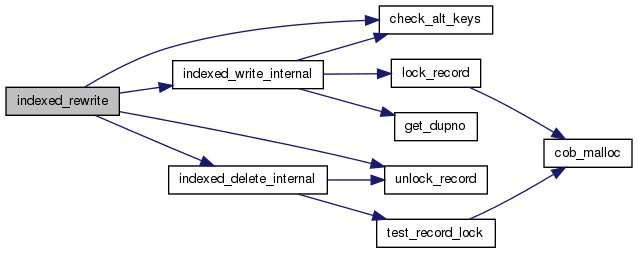
Definition at line 2320 of file fileio.c.
{
#ifdef WITH_INDEX_EXTFH
return extfh_indexed_start (f, cond, key);
#elif defined(WITH_CISAM) || defined(WITH_DISAM) || defined(WITH_VBISAM)
struct indexfile *fh = f->file;
int k;
int mode;
int klen;
int ret = COB_STATUS_00_SUCCESS;
f->flag_read_done = 0;
f->flag_first_read = 0;
fh->readdone = 0;
fh->eofpending = 0;
fh->startiscur = 0;
fh->wrkhasrec = 0;
fh->keyhasdups = 0;
if (f->flag_nonexistent) {
return COB_STATUS_23_KEY_NOT_EXISTS;
}
for (k = 0; k < f->nkeys; k++) {
if (f->keys[k].field->data == key->data) {
if (fh->key[k].k_flags & ISDUPS) {
fh->keyhasdups = 1;
}
break;
}
}
/* Use size of data field; This may indicate a partial key */
klen = key->size;
if (klen < 1 || klen > fh->key[k].k_leng) {
klen = fh->key[k].k_leng; /* Max key length for this index */
}
mode = ISGTEQ;
fh->startiscur = 1;
switch (cond) {
case COB_EQ:
mode = ISEQUAL;
fh->readdir = ISNEXT;
break;
case COB_GE:
mode = ISGTEQ;
fh->readdir = ISNEXT;
break;
case COB_GT:
mode = ISGREAT;
fh->readdir = ISNEXT;
break;
case COB_LE:
fh->readdir = ISPREV;
mode = ISGTEQ;
break;
case COB_LT:
fh->readdir = ISPREV;
mode = ISGTEQ;
break;
default:
return COB_STATUS_21_KEY_INVALID;
break;
}
if ((isstart (fh->isfd, &fh->key[k], klen, (void *)f->record->data, mode)) == -1) {
ret = isretsts (COB_STATUS_10_END_OF_FILE);
fh->curkey = -1;
fh->keyhasdups = 0;
fh->startcond = -1;
fh->readdir = -1;
fh->startiscur = 0;
} else {
if (ret == COB_STATUS_00_SUCCESS) {
fh->startcond = cond;
memcpy (fh->savekey, f->record->data + fh->key[k].k_start, fh->key[k].k_leng);
fh->curkey = k;
f->flag_end_of_file = 0;
f->flag_begin_of_file = 0;
f->flag_first_read = 1;
} else {
fh->curkey = -1;
fh->keyhasdups = 0;
fh->startcond = -1;
fh->readdir = -1;
}
}
return ret;
#else /* WITH_INDEX_EXTFH */
return indexed_start_internal (f, cond, key, 0, 0);
#endif /* WITH_INDEX_EXTFH */
}

| static int indexed_start_internal | ( | cob_file * | f, |
| const int | cond, | ||
| cob_field * | key, | ||
| const int | read_opts, | ||
| const int | test_lock | ||
| ) | [static] |
Definition at line 2147 of file fileio.c.
{
int ret;
unsigned int dupno;
struct indexed_file *p = f->file;
/* look up for the key */
for (p->key_index = 0; p->key_index < f->nkeys; p->key_index++) {
if (f->keys[p->key_index].field->data == key->data) {
break;
}
}
/* RXW - Removed
if (unlikely(p->key_index == f->nkeys)) {
cob_runtime_error ("cob_start_indexed: key not found "
"(should have been detected by cobc)");
return 99;
}
*/
/* search */
DBT_SET (p->key, key);
#ifdef USE_DB41
/* the open cursor makes this function atomic */
if (p->key_index != 0) {
p->db[0]->cursor (p->db[0], NULL, &p->cursor[0], 0);
}
p->db[p->key_index]->cursor (p->db[p->key_index], NULL, &p->cursor[p->key_index], 0);
ret = DB_SEQ (p->cursor[p->key_index], DB_SET_RANGE);
#else
ret = DB_SEQ (p->db[p->key_index], R_CURSOR);
#endif
switch (cond) {
case COB_EQ:
if (ret == 0) {
ret = memcmp (p->key.data, key->data, key->size);
}
break;
case COB_LT:
if (ret != 0) {
#ifdef USE_DB41
ret = DB_SEQ (p->cursor[p->key_index], DB_LAST);
#else
ret = DB_SEQ (p->db[p->key_index], R_LAST);
#endif
} else {
#ifdef USE_DB41
ret = DB_SEQ (p->cursor[p->key_index], DB_PREV);
#else
ret = DB_SEQ (p->db[p->key_index], R_PREV);
#endif
}
break;
case COB_LE:
if (ret != 0) {
#ifdef USE_DB41
ret = DB_SEQ (p->cursor[p->key_index], DB_LAST);
#else
ret = DB_SEQ (p->db[p->key_index], R_LAST);
#endif
} else if (memcmp (p->key.data, key->data, key->size) != 0) {
#ifdef USE_DB41
ret = DB_SEQ (p->cursor[p->key_index], DB_PREV);
#else
ret = DB_SEQ (p->db[p->key_index], R_PREV);
#endif
} else if (f->keys[p->key_index].flag) {
#ifdef USE_DB41
ret = DB_SEQ (p->cursor[p->key_index], DB_NEXT_NODUP);
#else
while (!ret && memcmp (p->key.data, key->data, key->size) == 0) {
ret = DB_SEQ (p->db[p->key_index], R_NEXT);
}
#endif
if (ret != 0) {
#ifdef USE_DB41
ret = DB_SEQ (p->cursor[p->key_index], DB_LAST);
#else
ret = DB_SEQ (p->db[p->key_index], R_LAST);
#endif
} else {
#ifdef USE_DB41
ret = DB_SEQ (p->cursor[p->key_index], DB_PREV);
#else
ret = DB_SEQ (p->db[p->key_index], R_PREV);
#endif
}
}
break;
case COB_GT:
while (ret == 0 && memcmp (p->key.data, key->data, key->size) == 0) {
#ifdef USE_DB41
ret = DB_SEQ (p->cursor[p->key_index], DB_NEXT);
#else
ret = DB_SEQ (p->db[p->key_index], R_NEXT);
#endif
}
break;
case COB_GE:
/* nothing */
break;
}
if (ret == 0 && p->key_index > 0) {
/* temporarily save alternate key */
memcpy (p->temp_key, p->key.data, f->keys[p->key_index].field->size);
if (f->keys[p->key_index].flag) {
memcpy (&dupno, (ucharptr)p->data.data + f->keys[0].field->size, sizeof(unsigned int));
}
p->key.data = p->data.data;
p->key.size = f->keys[0].field->size;
ret = DB_GET (p->db[0], 0);
}
#ifdef USE_DB41
if (ret == 0 && test_lock) {
if (!(read_opts & COB_READ_IGNORE_LOCK)) {
ret = test_record_lock (f, p->key.data, p->key.size);
if (ret) {
p->cursor[p->key_index]->c_close (p->cursor[p->key_index]);
p->cursor[p->key_index] = NULL;
if (p->key_index != 0) {
p->cursor[0]->c_close (p->cursor[0]);
p->cursor[0] = NULL;
}
return COB_STATUS_51_RECORD_LOCKED;
}
}
if (read_opts & COB_READ_LOCK) {
ret = lock_record (f, p->key.data, p->key.size);
if (ret) {
p->cursor[p->key_index]->c_close (p->cursor[p->key_index]);
p->cursor[p->key_index] = NULL;
if (p->key_index != 0) {
p->cursor[0]->c_close (p->cursor[0]);
p->cursor[0] = NULL;
}
return COB_STATUS_51_RECORD_LOCKED;
}
}
}
#endif
if (ret == 0) {
if (p->key_index == 0) {
memcpy (p->last_readkey[0], p->key.data, f->keys[0].field->size);
} else {
memcpy (p->last_readkey[p->key_index],
p->temp_key, f->keys[p->key_index].field->size);
memcpy (p->last_readkey[p->key_index + f->nkeys], p->key.data, f->keys[0].field->size);
if (f->keys[p->key_index].flag) {
p->last_dupno[p->key_index] = dupno;
}
}
}
#ifdef USE_DB41
p->cursor[p->key_index]->c_close (p->cursor[p->key_index]);
p->cursor[p->key_index] = NULL;
if (p->key_index != 0) {
p->cursor[0]->c_close (p->cursor[0]);
p->cursor[0] = NULL;
}
#endif
return (ret == 0) ? COB_STATUS_00_SUCCESS : COB_STATUS_23_KEY_NOT_EXISTS;
}


| static int indexed_write | ( | cob_file * | f, |
| const int | opt | ||
| ) | [static] |
Definition at line 3255 of file fileio.c.
{
#ifdef WITH_INDEX_EXTFH
return extfh_indexed_write (f, opt);
#elif defined(WITH_CISAM) || defined(WITH_DISAM) || defined(WITH_VBISAM)
struct indexfile *fh = f->file;
int ret = COB_STATUS_00_SUCCESS;
if (f->flag_nonexistent) {
return COB_STATUS_30_PERMANENT_ERROR;
}
#if defined(ISVARLEN)
if (f->record_min != f->record_max) {
isreclen = f->record->size;
}
#endif
if (iswrite (fh->isfd, (void *)f->record->data) == -1) {
ret = isretsts (COB_STATUS_49_I_O_DENIED);
if (iserrno == EDUPL) {
if (f->open_mode == COB_OPEN_OUTPUT) {
ret = COB_STATUS_21_KEY_INVALID;
}
}
} else {
memcpy (fh->savekey, f->record->data + fh->key[0].k_start, fh->key[0].k_leng);
}
return ret;
#else /* WITH_INDEX_EXTFH */
struct indexed_file *p = f->file;
#ifdef USE_DB41
if (bdb_env != NULL) {
unlock_record (f);
}
#endif
/* check record key */
DBT_SET (p->key, f->keys[0].field);
if (!p->last_key) {
p->last_key = cob_malloc (p->key.size);
} else if (f->access_mode == COB_ACCESS_SEQUENTIAL
&& memcmp (p->last_key, p->key.data, p->key.size) > 0) {
return COB_STATUS_21_KEY_INVALID;
}
memcpy (p->last_key, p->key.data, p->key.size);
return indexed_write_internal (f, 0, opt);
#endif /* WITH_INDEX_EXTFH */
}

| static int indexed_write_internal | ( | cob_file * | f, |
| const int | rewrite, | ||
| const int | opt | ||
| ) | [static] |
Definition at line 3133 of file fileio.c.
{
size_t i;
struct indexed_file *p = f->file;
int flags;
unsigned int dupno;
#ifdef USE_DB41
int close_cursor;
if (bdb_env) {
flags = DB_WRITECURSOR;
} else {
flags = 0;
}
if (p->write_cursor_open) {
close_cursor = 0;
} else {
p->db[0]->cursor (p->db[0], NULL, &p->cursor[0], flags);
p->write_cursor_open = 1;
close_cursor = 1;
}
#endif
/* check duplicate alternate keys */
if (f->nkeys > 1 && !rewrite) {
if (check_alt_keys (f, 0)) {
#ifdef USE_DB41
if (close_cursor) {
p->cursor[0]->c_close (p->cursor[0]);
p->cursor[0] = NULL;
p->write_cursor_open = 0;
}
#endif
return COB_STATUS_22_KEY_EXISTS;
}
DBT_SET (p->key, f->keys[0].field);
}
/* write data */
#ifdef USE_DB41
if (p->cursor[0]->c_get (p->cursor[0], &p->key, &p->data, DB_SET) == 0) {
if (close_cursor) {
p->cursor[0]->c_close (p->cursor[0]);
p->cursor[0] = NULL;
p->write_cursor_open = 0;
}
return COB_STATUS_22_KEY_EXISTS;
}
p->data.data = f->record->data;
p->data.size = (cob_dbtsize_t) f->record->size;
p->cursor[0]->c_put (p->cursor[0], &p->key, &p->data, DB_KEYFIRST);
#else
p->data.data = f->record->data;
p->data.size = (cob_dbtsize_t) f->record->size;
if (DB_PUT (p->db[0], R_NOOVERWRITE) != 0) {
return COB_STATUS_22_KEY_EXISTS;
}
#endif
/* write secondary keys */
p->data = p->key;
for (i = 1; i < f->nkeys; i++) {
if (rewrite && ! p->rewrite_sec_key[i]) {
continue;
}
if (f->keys[i].flag) {
flags = 0;
dupno = get_dupno(f, i);
memcpy (p->temp_key, f->keys[0].field->data,
f->keys[0].field->size);
memcpy (p->temp_key + f->keys[0].field->size, &dupno,
sizeof(unsigned int));
p->data.data = p->temp_key;
p->data.size = f->keys[0].field->size + sizeof(unsigned int);;
} else {
#ifdef USE_DB41
flags = DB_NOOVERWRITE;
#else
flags = R_NOOVERWRITE;
#endif
}
DBT_SET (p->key, f->keys[i].field);
if (DB_PUT (p->db[i], flags) != 0) {
#ifdef USE_DB41
if (close_cursor) {
p->cursor[0]->c_close (p->cursor[0]);
p->cursor[0] = NULL;
p->write_cursor_open = 0;
}
#endif
return COB_STATUS_22_KEY_EXISTS;
}
}
#ifdef USE_DB41
if (opt & COB_WRITE_LOCK) {
if (bdb_env != NULL) {
DBT_SET (p->key, f->keys[0].field);
if (lock_record (f, p->key.data, p->key.size)) {
if (close_cursor) {
p->cursor[0]->c_close (p->cursor[0]);
p->cursor[0] = NULL;
p->write_cursor_open = 0;
}
return COB_STATUS_51_RECORD_LOCKED;
}
}
}
if (close_cursor) {
p->cursor[0]->c_close (p->cursor[0]);
p->cursor[0] = NULL;
p->write_cursor_open = 0;
}
#endif
return COB_STATUS_00_SUCCESS;
}


| static int is_absolute | ( | const char * | filename | ) | [static] |
Definition at line 3601 of file fileio.c.
{
#ifdef _WIN32
if (filename[0] == '/' || filename[0] == '\\') {
return 1;
} else {
if (isalpha (filename[0]) && filename[1] == ':' &&
(filename[2] == '/' || filename[2] == '\\')) {
return 1;
} else {
return 0;
}
}
#else
if (filename[0] == '/') {
return 1;
} else {
return 0;
}
#endif
}

| static void join_environment | ( | void | ) | [static] |
Definition at line 1593 of file fileio.c.
{
int flags, ret;
if (bdb_home == NULL) {
return;
}
ret = db_env_create (&bdb_env, 0);
if (ret) {
cob_runtime_error ("Can't join BDB environment, env_create: %d %s\n", ret, db_strerror (ret));
cob_stop_run (1);
}
bdb_env->set_errfile (bdb_env, stderr);
#if (DB_VERSION_MAJOR > 4) || ((DB_VERSION_MAJOR == 4) && (DB_VERSION_MINOR > 2))
bdb_env->set_msgfile (bdb_env, stderr);
#endif
bdb_env->set_cachesize (bdb_env, 0, 2*1024*1024, 0);
bdb_env->set_alloc (bdb_env, cob_malloc, realloc, free);
flags = DB_CREATE | DB_INIT_MPOOL | DB_INIT_CDB;
ret = bdb_env->open (bdb_env, bdb_home, flags, 0);
if (ret) {
cob_runtime_error ("Can't join BDB environment, env_open: %d %s\n", ret, db_strerror (ret));
bdb_env->close (bdb_env, 0);
bdb_env = NULL;
cob_stop_run (1);
}
#if (DB_VERSION_MAJOR > 4) || ((DB_VERSION_MAJOR == 4) && (DB_VERSION_MINOR > 1))
bdb_env->get_data_dirs (bdb_env, &bdb_data_dir);
#endif
bdb_env->lock_id (bdb_env, &bdb_lock_id);
}
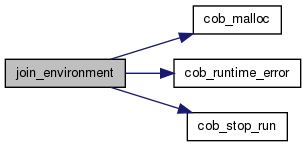

| static int lineseq_read | ( | cob_file * | f, |
| const int | read_opts | ||
| ) | [static] |
Definition at line 1156 of file fileio.c.
{
unsigned char *dataptr;
size_t i = 0;
int n;
#ifdef WITH_SEQRA_EXTFH
int extfh_ret;
extfh_ret = extfh_sequential_read (f, read_opts);
if (extfh_ret != COB_NOT_CONFIGURED) {
return extfh_ret;
}
#endif /* WITH_SEQRA_EXTFH */
dataptr = f->record->data;
for (; ;) {
n = getc ((FILE *)f->file);
if (unlikely(n == EOF)) {
if (!i) {
return COB_STATUS_10_END_OF_FILE;
} else {
break;
}
}
if (unlikely(n == 0 && cob_ls_nulls != NULL)) {
n = getc ((FILE *)f->file);
if (n == EOF) {
return COB_STATUS_30_PERMANENT_ERROR;
}
} else {
if (n == '\r') {
continue;
}
if (n == '\n') {
break;
}
}
if (likely(i < f->record->size)) {
*dataptr++ = n;
i++;
}
}
if (i < f->record->size) {
/* fill the record with spaces */
memset ((unsigned char *)f->record->data + i, ' ', f->record->size - i);
}
if (f->record_size) {
cob_set_int (f->record_size, (int)i);
}
return COB_STATUS_00_SUCCESS;
}
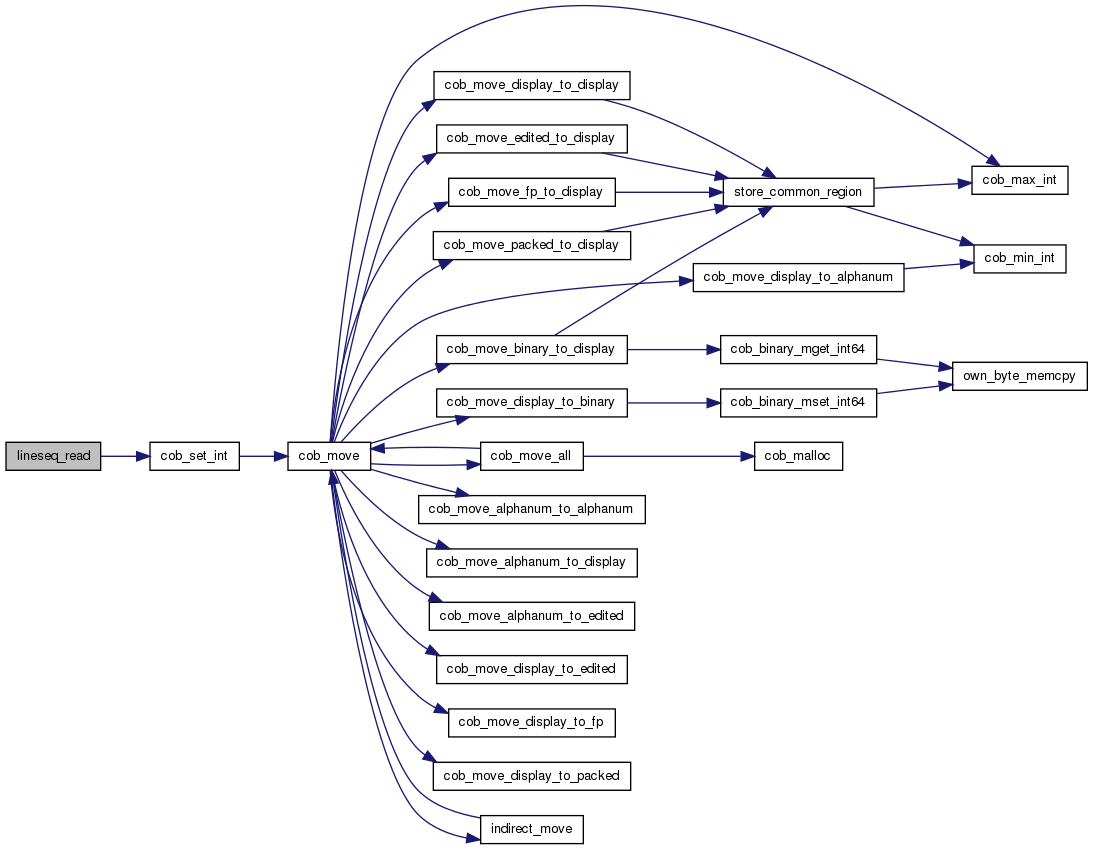
| static int lineseq_write | ( | cob_file * | f, |
| const int | opt | ||
| ) | [static] |
Definition at line 1210 of file fileio.c.
{
unsigned char *p;
struct linage_struct *lingptr;
size_t size;
int i;
int ret;
#ifdef WITH_SEQRA_EXTFH
int extfh_ret;
extfh_ret = extfh_sequential_write (f, opt);
if (extfh_ret != COB_NOT_CONFIGURED) {
return extfh_ret;
}
#endif /* WITH_SEQRA_EXTFH */
/* RXW
if (opt == 0) {
opt = COB_WRITE_BEFORE | COB_WRITE_LINES | 1;
}
*/
/* determine the size to be written */
if (unlikely(cob_ls_fixed != NULL)) {
size = f->record->size;
} else {
for (i = (int)f->record->size - 1; i >= 0; i--) {
if (f->record->data[i] != ' ') {
break;
}
}
size = i + 1;
}
if (unlikely(f->flag_select_features & COB_SELECT_LINAGE)) {
if (f->flag_needs_top) {
f->flag_needs_top = 0;
lingptr = (struct linage_struct *)(f->linorkeyptr);
for (i = 0; i < lingptr->lin_top; i++) {
putc ('\n', (FILE *)f->file);
}
}
}
/* WRITE AFTER */
if (opt & COB_WRITE_AFTER) {
ret = cob_file_write_opt (f, opt);
if (ret) {
return ret;
}
f->flag_needs_nl = 1;
}
/* write to the file */
if (size) {
if (unlikely(cob_ls_nulls != NULL)) {
p = f->record->data;
for (i = 0; i < (int)size; i++, p++) {
if (*p < ' ') {
putc (0, (FILE *)f->file);
}
putc ((int)(*p), (FILE *)f->file);
}
} else {
if (unlikely(fwrite (f->record->data, size, 1,
(FILE *)f->file) != 1)) {
return COB_STATUS_30_PERMANENT_ERROR;
}
}
}
if (unlikely(f->flag_select_features & COB_SELECT_LINAGE)) {
putc ('\n', (FILE *)f->file);
}
/* WRITE BEFORE */
if (opt & COB_WRITE_BEFORE) {
ret = cob_file_write_opt (f, opt);
if (ret) {
return ret;
}
f->flag_needs_nl = 0;
}
if (unlikely(eop_status)) {
eop_status = 0;
cob_exception_code = 0x0502;
return COB_STATUS_52_EOP;
}
return COB_STATUS_00_SUCCESS;
}
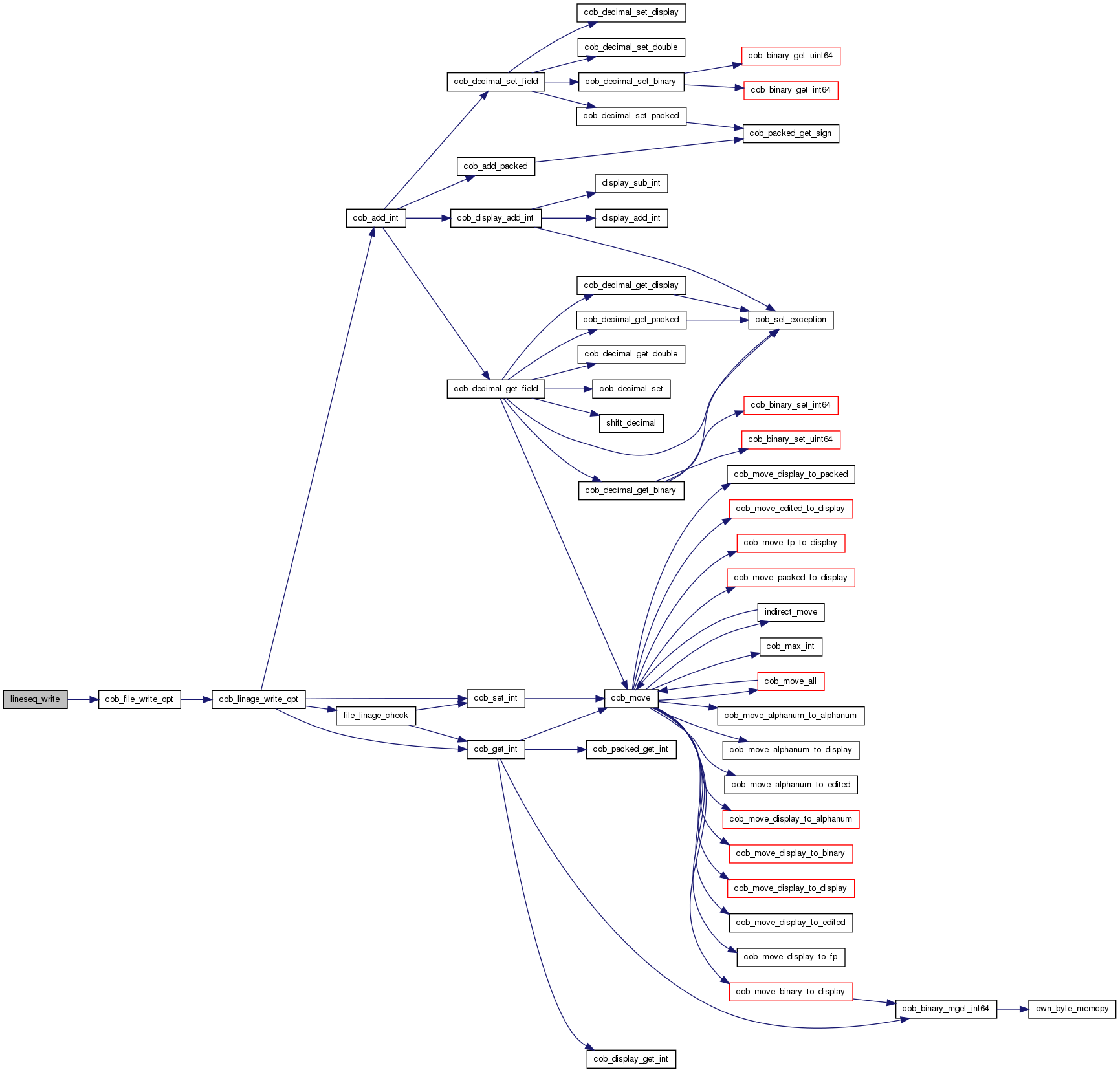
| static int lock_record | ( | cob_file * | f, |
| char * | key, | ||
| const unsigned int | keylen | ||
| ) | [static] |
Definition at line 1626 of file fileio.c.
{
struct indexed_file *p = f->file;
size_t len;
int ret;
DBT dbt;
len = keylen + p->filenamelen + 1;
if (len > rlo_size) {
free (record_lock_object);
record_lock_object = cob_malloc (len);
rlo_size = len;
}
memcpy ((char *)record_lock_object, p->filename, (size_t)(p->filenamelen + 1));
memcpy ((char *)record_lock_object + p->filenamelen + 1, key, (size_t)keylen);
dbt.size = (cob_dbtsize_t) len;
dbt.data = record_lock_object;
ret = bdb_env->lock_get (bdb_env, p->bdb_lock_id, DB_LOCK_NOWAIT,
&dbt, DB_LOCK_WRITE, &p->bdb_record_lock);
if (!ret) {
p->record_locked = 1;
}
return ret;
}

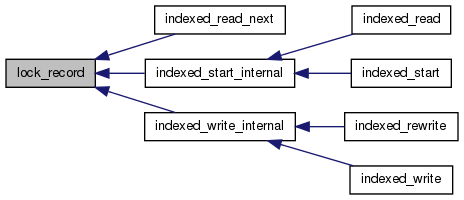
| static int COB_NOINLINE open_cbl_file | ( | unsigned char * | file_name, |
| unsigned char * | file_access, | ||
| unsigned char * | file_handle, | ||
| const int | file_flags | ||
| ) | [static] |
Definition at line 4495 of file fileio.c.
{
char *fn;
#ifdef O_BINARY
int flag = O_BINARY;
#else
int flag = 0;
#endif
int fd;
if (!cob_current_module->cob_procedure_parameters[0]) {
memset (file_handle, -1, 4);
return -1;
}
flag |= file_flags;
switch (*file_access & 0x3f) {
case 1:
flag |= O_RDONLY;
break;
case 2:
flag |= O_CREAT | O_TRUNC | O_WRONLY;
break;
case 3:
flag |= O_RDWR;
break;
default:
memset (file_handle, -1, 4);
return -1;
}
fn = cob_str_from_fld (cob_current_module->cob_procedure_parameters[0]);
fd = open (fn, flag, 0660);
if (fd < 0) {
free (fn);
memset (file_handle, -1, 4);
return 35;
}
free (fn);
memcpy (file_handle, &fd, 4);
return 0;
}


| static int relative_delete | ( | cob_file * | f | ) | [static] |
Definition at line 1553 of file fileio.c.
{
size_t relsize;
int relnum;
off_t off;
#ifdef WITH_SEQRA_EXTFH
int extfh_ret;
extfh_ret = extfh_relative_delete (f);
if (extfh_ret != COB_NOT_CONFIGURED) {
return extfh_ret;
}
#endif /* WITH_SEQRA_EXTFH */
relnum = cob_get_int (f->keys[0].field) - 1;
relsize = f->record_max + sizeof (f->record->size);
off = relnum * relsize;
if (fseek ((FILE *)f->file, off, SEEK_SET) != 0 ||
fread (&f->record->size, sizeof (f->record->size),
1, (FILE *)f->file) != 1) {
return COB_STATUS_23_KEY_NOT_EXISTS;
}
fseek ((FILE *)f->file, - (off_t) sizeof (f->record->size), SEEK_CUR);
f->record->size = 0;
if (fwrite (&f->record->size, sizeof (f->record->size), 1, (FILE *)f->file) != 1) {
return COB_STATUS_30_PERMANENT_ERROR;
}
fseek ((FILE *)f->file, (off_t) f->record_max, SEEK_CUR);
return COB_STATUS_00_SUCCESS;
}
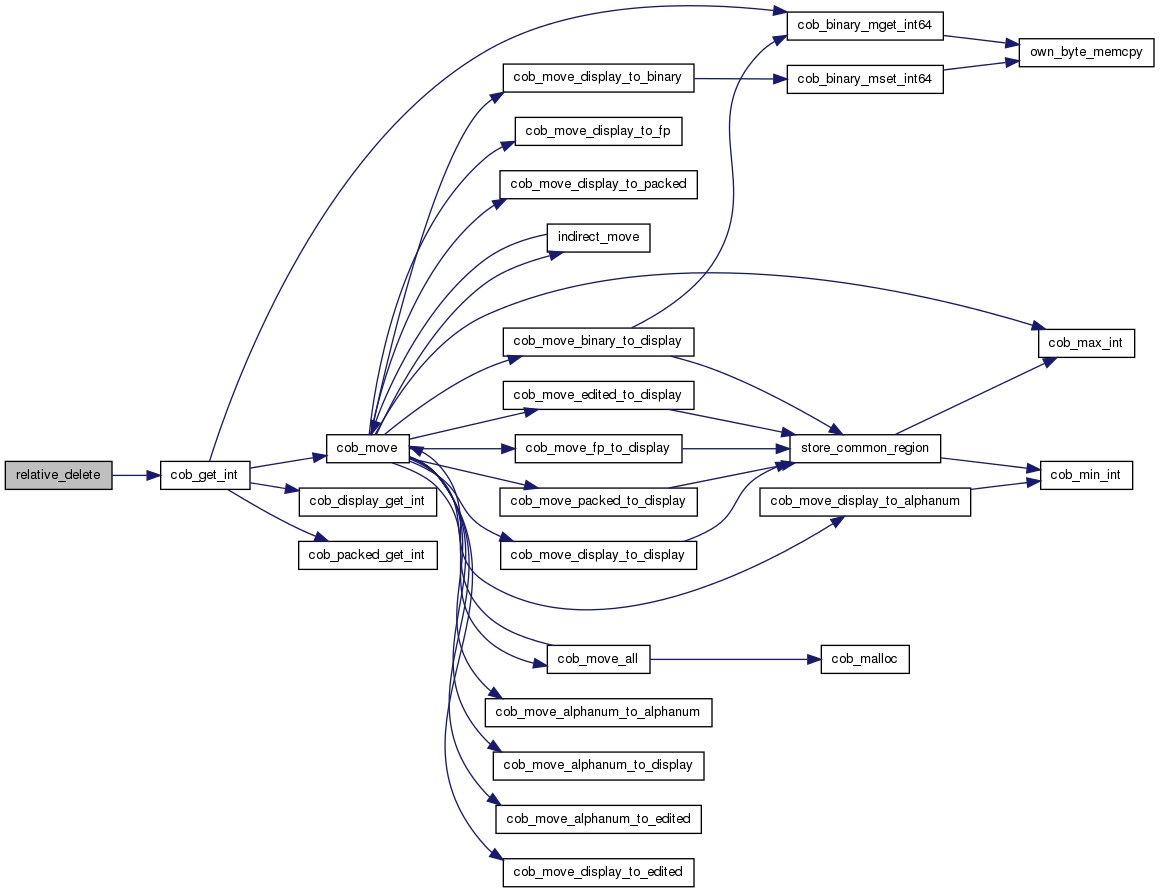
Definition at line 1363 of file fileio.c.
{
int relnum;
size_t relsize;
off_t off;
#ifdef WITH_SEQRA_EXTFH
int extfh_ret;
extfh_ret = extfh_relative_read (f, k, read_opts);
if (extfh_ret != COB_NOT_CONFIGURED) {
return extfh_ret;
}
#endif /* WITH_SEQRA_EXTFH */
SEEK_INIT (f);
relnum = cob_get_int (k) - 1;
relsize = f->record_max + sizeof (f->record->size);
off = relnum * relsize;
if (fseek ((FILE *)f->file, off, SEEK_SET) != 0 ||
fread (&f->record->size, sizeof (f->record->size),
1, (FILE *)f->file) != 1) {
return COB_STATUS_23_KEY_NOT_EXISTS;
}
if (f->record->size == 0) {
fseek ((FILE *)f->file, - (off_t) sizeof (f->record->size), SEEK_CUR);
return COB_STATUS_23_KEY_NOT_EXISTS;
}
if (fread (f->record->data, f->record_max, 1, (FILE *)f->file) != 1) {
return COB_STATUS_30_PERMANENT_ERROR;
}
return COB_STATUS_00_SUCCESS;
}

| static int relative_read_next | ( | cob_file * | f, |
| const int | read_opts | ||
| ) | [static] |
Definition at line 1400 of file fileio.c.
{
off_t off;
size_t relsize;
int relnum;
#ifdef WITH_SEQRA_EXTFH
int extfh_ret;
extfh_ret = extfh_relative_read_next (f, read_opts);
if (extfh_ret != COB_NOT_CONFIGURED) {
return extfh_ret;
}
#endif /* WITH_SEQRA_EXTFH */
SEEK_INIT (f);
relsize = f->record_max + sizeof (f->record->size);
while (1) {
if (fread (&f->record->size, sizeof (f->record->size), 1, (FILE *)f->file) != 1) {
if (ferror ((FILE *)f->file)) {
return COB_STATUS_30_PERMANENT_ERROR;
} else {
return COB_STATUS_10_END_OF_FILE;
}
}
if (f->keys[0].field) {
if (f->flag_first_read) {
cob_set_int (f->keys[0].field, 1);
f->flag_first_read = 0;
} else {
off = ftell ((FILE *)f->file);
relnum = (int)((off / relsize) + 1);
cob_set_int (f->keys[0].field, 0);
if (cob_add_int (f->keys[0].field, relnum) != 0) {
fseek ((FILE *)f->file, -(off_t) sizeof (f->record->size),
SEEK_CUR);
return COB_STATUS_14_OUT_OF_KEY_RANGE;
}
}
}
if (f->record->size > 0) {
if (fread (f->record->data, f->record_max, 1, (FILE *)f->file) != 1) {
return COB_STATUS_30_PERMANENT_ERROR;
}
return COB_STATUS_00_SUCCESS;
}
fseek ((FILE *)f->file, (off_t) f->record_max, SEEK_CUR);
}
}
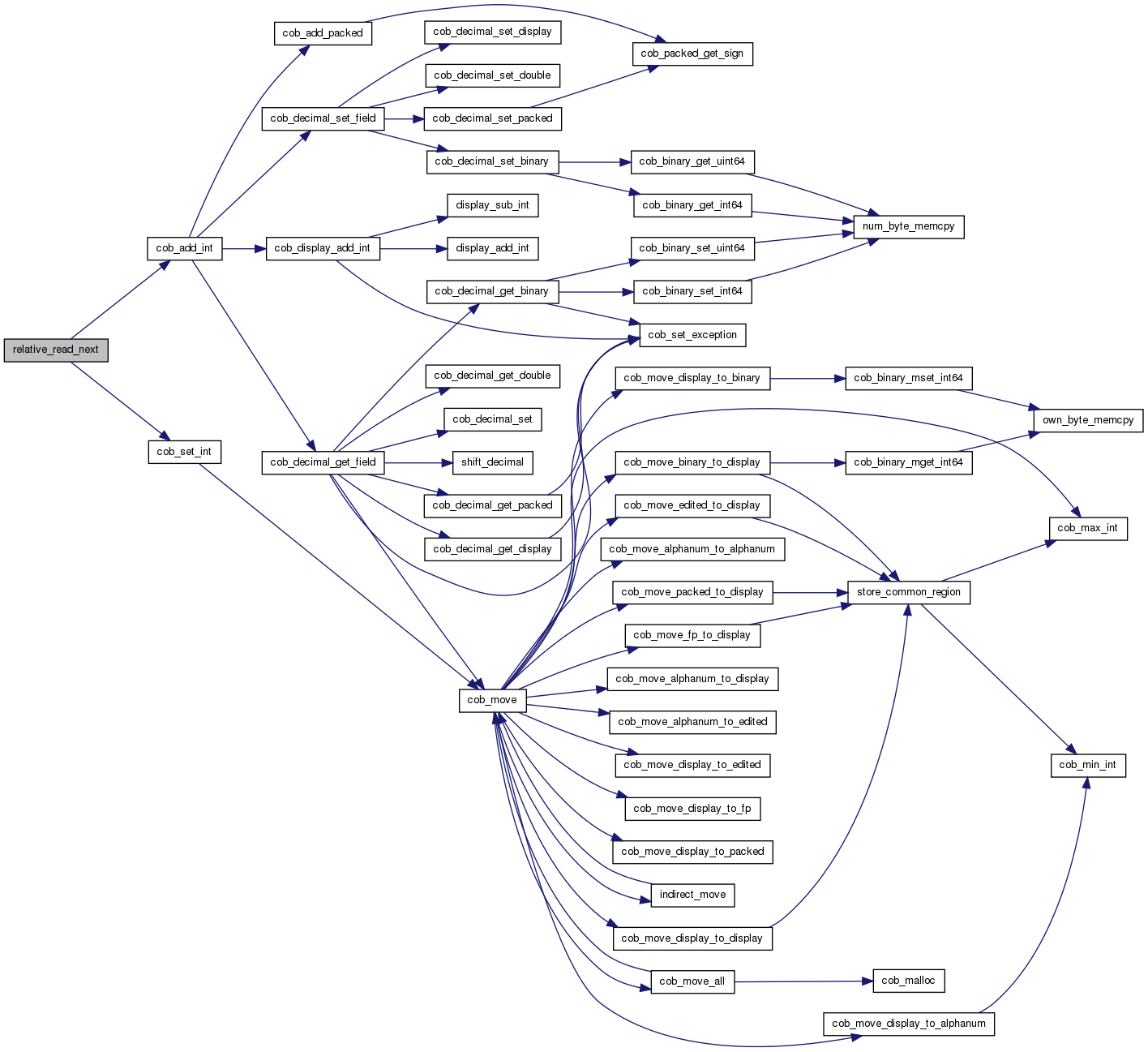
| static int relative_rewrite | ( | cob_file * | f, |
| const int | opt | ||
| ) | [static] |
Definition at line 1518 of file fileio.c.
{
size_t relsize;
int relnum;
off_t off;
#ifdef WITH_SEQRA_EXTFH
int extfh_ret;
extfh_ret = extfh_relative_rewrite (f, opt);
if (extfh_ret != COB_NOT_CONFIGURED) {
return extfh_ret;
}
#endif /* WITH_SEQRA_EXTFH */
if (f->access_mode == COB_ACCESS_SEQUENTIAL) {
fseek ((FILE *)f->file, -(off_t) f->record_max, SEEK_CUR);
} else {
relsize = f->record_max + sizeof (f->record->size);
relnum = cob_get_int (f->keys[0].field) - 1;
off = relnum * relsize;
if (fseek ((FILE *)f->file, off, SEEK_SET) != 0 ||
fread (&f->record->size, sizeof (f->record->size),
1, (FILE *)f->file) != 1) {
return COB_STATUS_23_KEY_NOT_EXISTS;
}
SEEK_INIT (f);
}
if (fwrite (f->record->data, f->record_max, 1, (FILE *)f->file) != 1) {
return COB_STATUS_30_PERMANENT_ERROR;
}
return COB_STATUS_00_SUCCESS;
}

Definition at line 1307 of file fileio.c.
{
int kindex;
size_t relsize;
off_t off;
#ifdef WITH_SEQRA_EXTFH
int extfh_ret;
extfh_ret = extfh_relative_start (f, cond, k);
if (extfh_ret != COB_NOT_CONFIGURED) {
return extfh_ret;
}
#endif /* WITH_SEQRA_EXTFH */
/* get the index */
kindex = cob_get_int (k) - 1;
relsize = f->record_max + sizeof (f->record->size);
if (cond == COB_LT) {
kindex--;
} else if (cond == COB_GT) {
kindex++;
}
/* seek the index */
while (1) {
off = kindex * relsize;
if (fseek ((FILE *)f->file, off, SEEK_SET) != 0 ||
fread (&f->record->size, sizeof (f->record->size),
1, (FILE *)f->file) != 1) {
return COB_STATUS_23_KEY_NOT_EXISTS;
}
/* check if a valid record */
if (f->record->size > 0) {
cob_set_int (k, kindex + 1);
fseek ((FILE *)f->file, - (off_t) sizeof (f->record->size), SEEK_CUR);
return COB_STATUS_00_SUCCESS;
}
/* continue */
switch (cond) {
case COB_EQ:
return COB_STATUS_23_KEY_NOT_EXISTS;
case COB_LT:
case COB_LE:
kindex--;
break;
case COB_GT:
case COB_GE:
kindex++;
break;
}
}
}
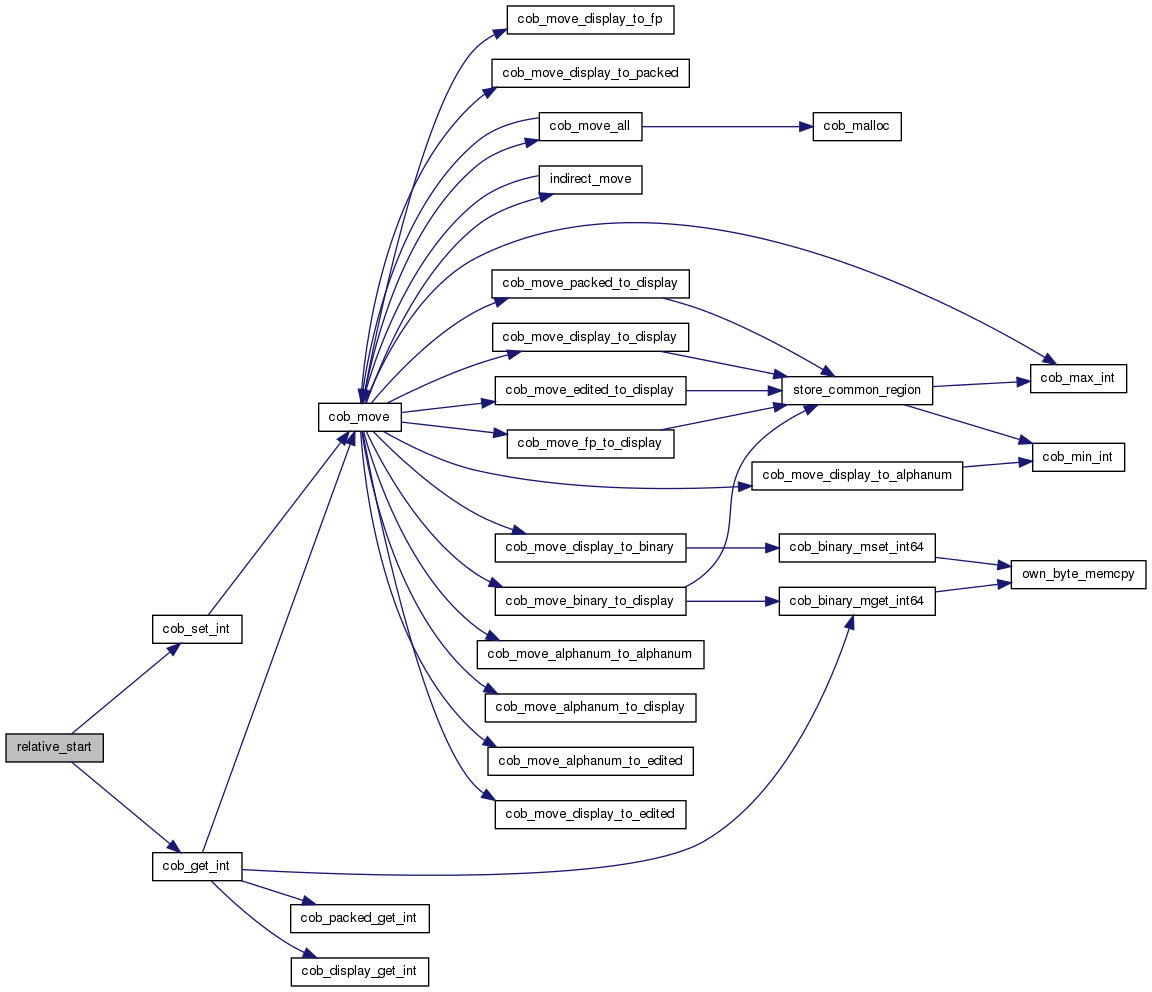
| static int relative_write | ( | cob_file * | f, |
| const int | opt | ||
| ) | [static] |
Definition at line 1454 of file fileio.c.
{
size_t size;
size_t relsize;
int i;
int kindex;
off_t off;
#ifdef WITH_SEQRA_EXTFH
int extfh_ret;
extfh_ret = extfh_relative_write (f, opt);
if (extfh_ret != COB_NOT_CONFIGURED) {
return extfh_ret;
}
#endif /* WITH_SEQRA_EXTFH */
SEEK_INIT (f);
relsize = f->record_max + sizeof (f->record->size);
if (f->access_mode != COB_ACCESS_SEQUENTIAL) {
kindex = cob_get_int (f->keys[0].field) - 1;
if (kindex < 0) {
return COB_STATUS_21_KEY_INVALID;
}
off = (off_t) (relsize * kindex);
if (fseek ((FILE *)f->file, off, SEEK_SET) != 0) {
return COB_STATUS_21_KEY_INVALID;
}
} else {
off = ftell ((FILE *)f->file);
}
if (fread (&size, sizeof (size), 1, (FILE *)f->file) > 0) {
fseek ((FILE *)f->file, -(off_t) sizeof (size), SEEK_CUR);
if (size > 0) {
return COB_STATUS_22_KEY_EXISTS;
}
} else {
fseek ((FILE *)f->file, off, SEEK_SET);
}
if (fwrite (&f->record->size, sizeof (f->record->size), 1, (FILE *)f->file) != 1) {
return COB_STATUS_30_PERMANENT_ERROR;
}
if (fwrite (f->record->data, f->record_max, 1, (FILE *)f->file) != 1) {
return COB_STATUS_30_PERMANENT_ERROR;
}
/* update RELATIVE KEY */
if (f->access_mode == COB_ACCESS_SEQUENTIAL) {
if (f->keys[0].field) {
/*
off = ftell ((FILE *)f->file);
*/
off += relsize;
i = (int)(off / relsize);
cob_set_int (f->keys[0].field, i);
}
}
return COB_STATUS_00_SUCCESS;
}
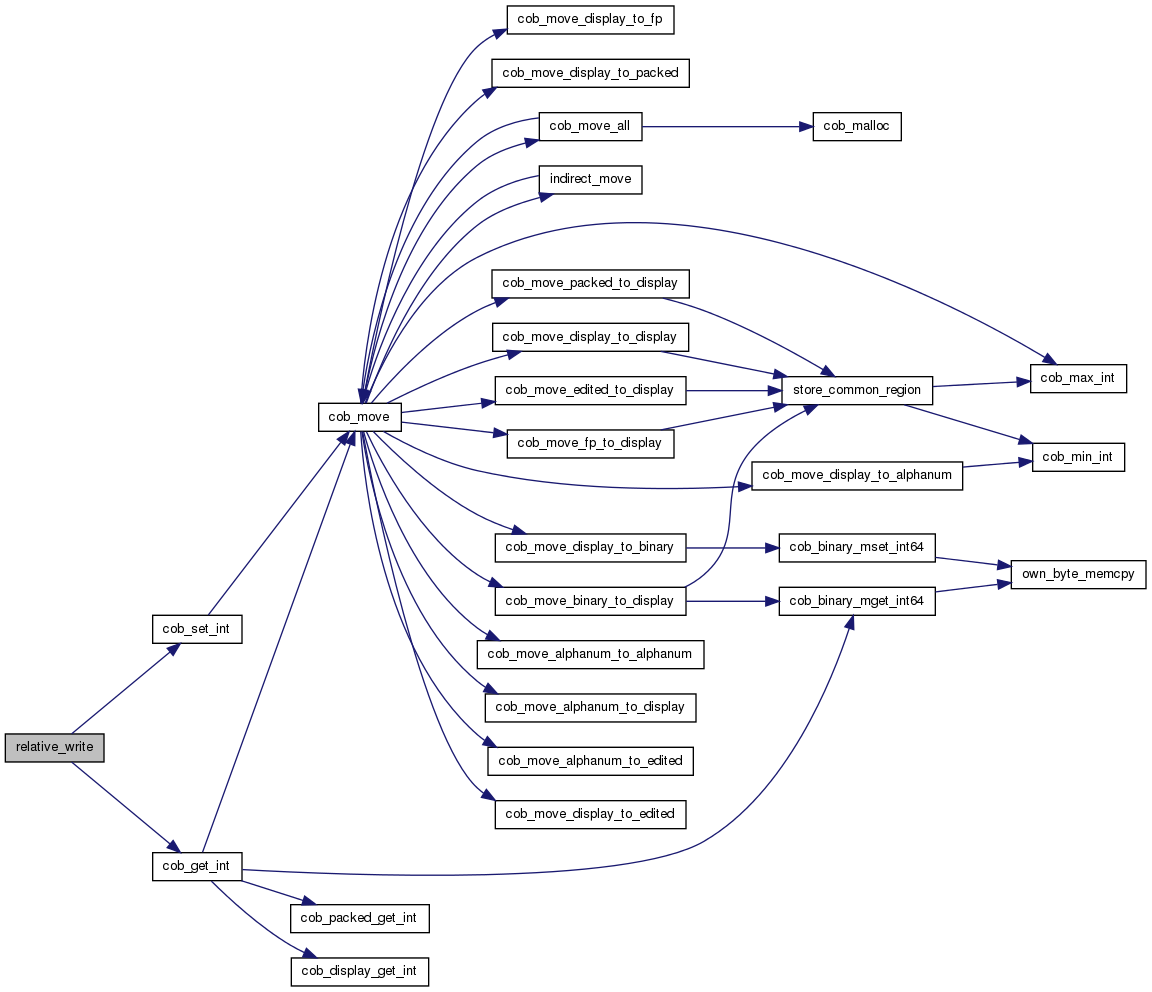
Definition at line 687 of file fileio.c.
{
cob_error_file = f;
if (likely(status == 0)) {
f->file_status[0] = (unsigned char)'0';
f->file_status[1] = (unsigned char)'0';
if (fnstatus) {
fnstatus->data[0] = (unsigned char)'0';
fnstatus->data[1] = (unsigned char)'0';
}
cob_exception_code = 0;
return;
}
if (likely(status != COB_STATUS_52_EOP)) {
cob_set_exception (status_exception[status / 10]);
}
f->file_status[0] = cob_i2d (status / 10);
f->file_status[1] = cob_i2d (status % 10);
if (fnstatus) {
fnstatus->data[0] = f->file_status[0];
fnstatus->data[1] = f->file_status[1];
}
}

| static int sequential_read | ( | cob_file * | f, |
| const int | read_opts | ||
| ) | [static] |
Definition at line 986 of file fileio.c.
{
size_t bytesread;
#if WITH_VARSEQ == 0 || WITH_VARSEQ == 1 || WITH_VARSEQ == 3
union {
unsigned char sbuff[4];
unsigned short sshort[2];
unsigned int sint;
} recsize;
#endif
#ifdef WITH_SEQRA_EXTFH
int extfh_ret;
extfh_ret = extfh_sequential_read (f, read_opts);
if (extfh_ret != COB_NOT_CONFIGURED) {
return extfh_ret;
}
#endif /* WITH_SEQRA_EXTFH */
SEEK_INIT (f);
/* read the record size */
if (f->record_min != f->record_max) {
#if WITH_VARSEQ == 2
if (unlikely(fread (&f->record->size, sizeof (f->record->size), 1, (FILE *)f->file) != 1)) {
#elif WITH_VARSEQ == 3
if (unlikely(fread (recsize.sbuff, 2, 1, (FILE *)f->file) != 1)) {
#else
if (unlikely(fread (recsize.sbuff, 4, 1, (FILE *)f->file) != 1)) {
#endif
if (ferror ((FILE *)f->file)) {
return COB_STATUS_30_PERMANENT_ERROR;
} else {
return COB_STATUS_10_END_OF_FILE;
}
}
#if WITH_VARSEQ == 0 || WITH_VARSEQ == 3
#ifdef WORDS_BIGENDIAN
f->record->size = recsize.sshort[0];
#else
f->record->size = COB_BSWAP_16 (recsize.sshort[0]);
#endif
#elif WITH_VARSEQ == 1
#ifdef WORDS_BIGENDIAN
f->record->size = recsize.sint;
#else
f->record->size = COB_BSWAP_32 (recsize.sint);
#endif
#endif
}
/* read the record */
bytesread = fread (f->record->data, 1, f->record->size, (FILE *)f->file);
if (unlikely(bytesread != f->record->size)) {
if (ferror ((FILE *)f->file)) {
return COB_STATUS_30_PERMANENT_ERROR;
} else if (bytesread == 0) {
return COB_STATUS_10_END_OF_FILE;
} else {
return COB_STATUS_04_SUCCESS_INCOMPLETE;
}
}
return COB_STATUS_00_SUCCESS;
}
| static int sequential_rewrite | ( | cob_file * | f, |
| const int | opt | ||
| ) | [static] |
Definition at line 1132 of file fileio.c.
{
#ifdef WITH_SEQRA_EXTFH
int extfh_ret;
extfh_ret = extfh_sequential_rewrite (f, opt);
if (extfh_ret != COB_NOT_CONFIGURED) {
return extfh_ret;
}
#endif /* WITH_SEQRA_EXTFH */
if (fseek ((FILE *)f->file, -(off_t) f->record->size, SEEK_CUR)) {
return COB_STATUS_30_PERMANENT_ERROR;
}
if (fwrite (f->record->data, f->record->size, 1, (FILE *)f->file) != 1) {
return COB_STATUS_30_PERMANENT_ERROR;
}
return COB_STATUS_00_SUCCESS;
}
| static int sequential_write | ( | cob_file * | f, |
| const int | opt | ||
| ) | [static] |
Definition at line 1053 of file fileio.c.
{
int ret;
#if WITH_VARSEQ == 0 || WITH_VARSEQ == 1 || WITH_VARSEQ == 3
union {
unsigned char sbuff[4];
unsigned short sshort[2];
unsigned int sint;
} recsize;
#endif
#ifdef WITH_SEQRA_EXTFH
int extfh_ret;
extfh_ret = extfh_sequential_write (f, opt);
if (extfh_ret != COB_NOT_CONFIGURED) {
return extfh_ret;
}
#endif /* WITH_SEQRA_EXTFH */
SEEK_INIT (f);
/* WRITE AFTER */
if (opt & COB_WRITE_AFTER) {
ret = cob_file_write_opt (f, opt);
if (ret) {
return ret;
}
f->flag_needs_nl = 1;
}
/* write the record size */
if (f->record_min != f->record_max) {
#if WITH_VARSEQ == 2
if (unlikely(fwrite (&f->record->size, sizeof (f->record->size), 1, (FILE *)f->file) != 1)) {
#else /* VARSEQ 0, 1, 3 */
#if WITH_VARSEQ == 1
#ifdef WORDS_BIGENDIAN
recsize.sint = f->record->size;
#else
recsize.sint = COB_BSWAP_32 ((unsigned int)f->record->size);
#endif
#else /* VARSEQ 0, 3 */
recsize.sint = 0;
#ifdef WORDS_BIGENDIAN
recsize.sshort[0] = f->record->size;
#else
recsize.sshort[0] = COB_BSWAP_16 ((unsigned short)f->record->size);
#endif
#endif /* VARSEQ 0, 3 */
#if WITH_VARSEQ == 3
if (unlikely(fwrite (recsize.sbuff, 2, 1, (FILE *)f->file) != 1)) {
#else
if (unlikely(fwrite (recsize.sbuff, 4, 1, (FILE *)f->file) != 1)) {
#endif /* VARSEQ 3 */
#endif /* VARSEQ 0, 1, 3 */
return COB_STATUS_30_PERMANENT_ERROR;
}
}
/* write the record */
if (unlikely(fwrite (f->record->data, f->record->size, 1, (FILE *)f->file) != 1)) {
return COB_STATUS_30_PERMANENT_ERROR;
}
/* WRITE BEFORE */
if (opt & COB_WRITE_BEFORE) {
ret = cob_file_write_opt (f, opt);
if (ret) {
return ret;
}
f->flag_needs_nl = 0;
}
return COB_STATUS_00_SUCCESS;
}
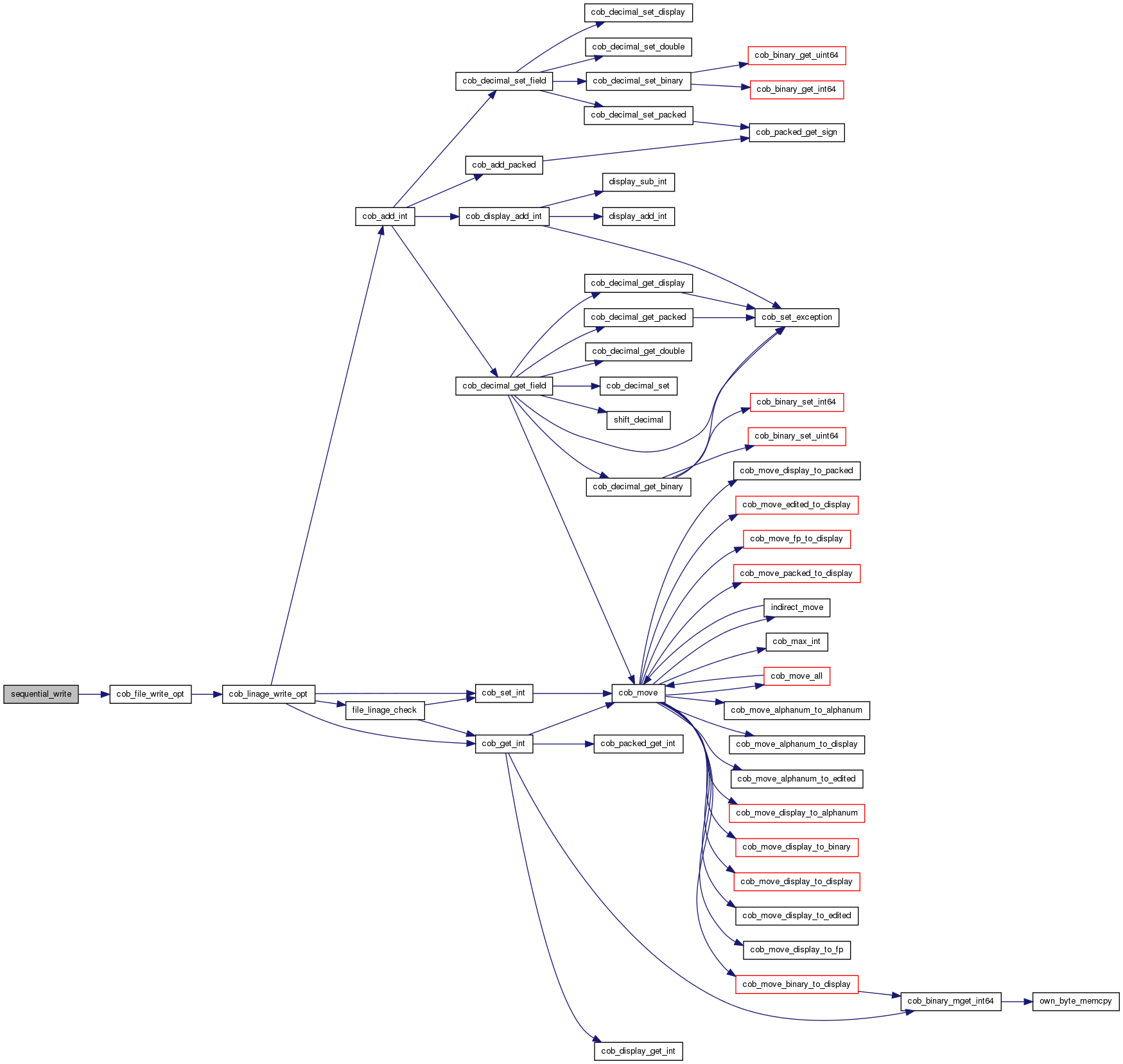
| static int sort_cmps | ( | const unsigned char * | s1, |
| const unsigned char * | s2, | ||
| const size_t | size, | ||
| const unsigned char * | col | ||
| ) | [static] |
Definition at line 5013 of file fileio.c.
{
size_t i;
int ret;
if (unlikely(col)) {
for (i = 0; i < size; i++) {
if ((ret = col[s1[i]] - col[s2[i]]) != 0) {
return ret;
}
}
} else {
for (i = 0; i < size; i++) {
if ((ret = s1[i] - s2[i]) != 0) {
return ret;
}
}
}
return 0;
}

| static int test_record_lock | ( | cob_file * | f, |
| char * | key, | ||
| const unsigned int | keylen | ||
| ) | [static] |
Definition at line 1652 of file fileio.c.
{
struct indexed_file *p = f->file;
size_t len;
int ret;
DBT dbt;
DB_LOCK test_lock;
len = keylen + p->filenamelen + 1;
if (len > rlo_size) {
free (record_lock_object);
record_lock_object = cob_malloc (len);
rlo_size = len;
}
memcpy ((char *)record_lock_object, p->filename, (size_t)(p->filenamelen + 1));
memcpy ((char *)record_lock_object + p->filenamelen + 1, key, (size_t)keylen);
dbt.size = (cob_dbtsize_t) len;
dbt.data = record_lock_object;
ret = bdb_env->lock_get (bdb_env, p->bdb_lock_id, DB_LOCK_NOWAIT,
&dbt, DB_LOCK_WRITE, &test_lock);
if (!ret) {
bdb_env->lock_put (bdb_env, &test_lock);
}
return ret;
}

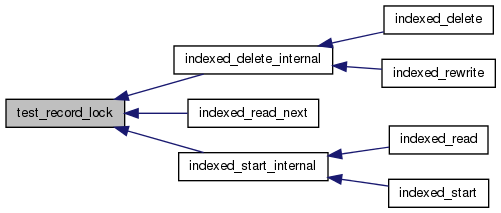
| static COB_INLINE void unique_copy | ( | unsigned char * | s1, |
| unsigned char * | s2 | ||
| ) | [static] |
| static int unlock_record | ( | cob_file * | f | ) | [static] |
Definition at line 1679 of file fileio.c.
{
struct indexed_file *p = f->file;
int ret;
if (p->record_locked == 0) {
return 0;
}
ret = bdb_env->lock_put (bdb_env, &p->bdb_record_lock);
p->record_locked = 0;
return ret;
}
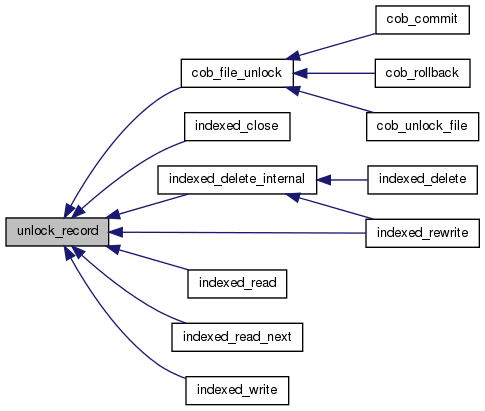
const char** bdb_data_dir = NULL [static] |
unsigned int bdb_lock_id [static] |
int cob_do_sync = 0 [static] |
char* cob_file_path = NULL [static] |
int cob_iteration = 0 [static] |
char* cob_ls_fixed = NULL [static] |
char* cob_ls_nulls = NULL [static] |
pid_t cob_process_id = 0 [static] |
int cob_sort_memory = 128*1024*1024 [static] |
size_t eop_status = 0 [static] |
struct file_list * file_cache [static] |
char* file_open_buff [static] |
char* file_open_env [static] |
char* file_open_name [static] |
struct cob_fileio_funcs* fileio_funcs[COB_ORG_MAX] [static] |
{
&sequential_funcs,
&lineseq_funcs,
&relative_funcs,
&indexed_funcs,
NULL
}
struct cob_fileio_funcs indexed_funcs [static] |
struct cob_fileio_funcs lineseq_funcs [static] |
void* record_lock_object [static] |
struct cob_fileio_funcs relative_funcs [static] |
char runtime_buffer[COB_SMALL_BUFF] [static] |
struct cob_fileio_funcs sequential_funcs [static] |
const int status_exception[] [static] |
 1.7.4
1.7.4